Namibia? Like Really? 2 Weeks in Namibia? My family thought I have gone mad! I was like it has so much to offer – Picturesque red dunes, beautiful landscapes, the largest canyon in Africa, exotic wildlife, and reasonably priced hotels offering mind-blowing views. This was the destination which I hadn’t seen or heard from anywhere. It wasn’t on my bucket list. I just came across it when searching for destinations in Africa and went completely crazy behind it.

Travel Dates – 7th June to 22nd June
First, we spent a fabulous week in Kruger, South Africa and then flew to Namibia.
Day 1 – Fly to Windhoek and drive to Kalahari Desert (256 Km, 3.5 hrs)
Due to flight cancellations and delays, we landed at 3 pm in Namibia instead of the scheduled time of 8:45 am. We picked up a Sim card from the airport, rented a car from Bidvest and started our journey to the Bagatelle Ranch in the Kalahari Desert.
Drive to Bagatelle
Driving in the dark is a complete no-no in Namibia as there aren’t any streetlights and you don’t see any cars for miles. So we rushed to reach our hotel before dark. After reaching Bagatelle, the plan was to go for a sundowners’ drive plus see cheetah feeding but obviously we missed it, thanks to Air Namibia.
Activities at Bagatelle:
- Sundowners Drive + Cheetah Feeding starts at 15:30 – a combination of a guided sundowners’ drive over the lodge with the possibility to see a wide variety of game combined with a cheetah feeding session to see them up-close and also includes drinks.
- Sundowners Nature Drive starts at 16:00 – guided sundowners’ drive with drinks.
- Cheetah Feeding with Sundowners starts at 18:00 – guided drive straight to cheetahs for a feeding session including sundowners’ drinks.
Accommodation
We stayed at the Bagatelle Kalahari Game Ranch. I mainly chose to stay here because they have cheetahs at their property and there is also an option of seeing meerkats in the wild, though not guaranteed.
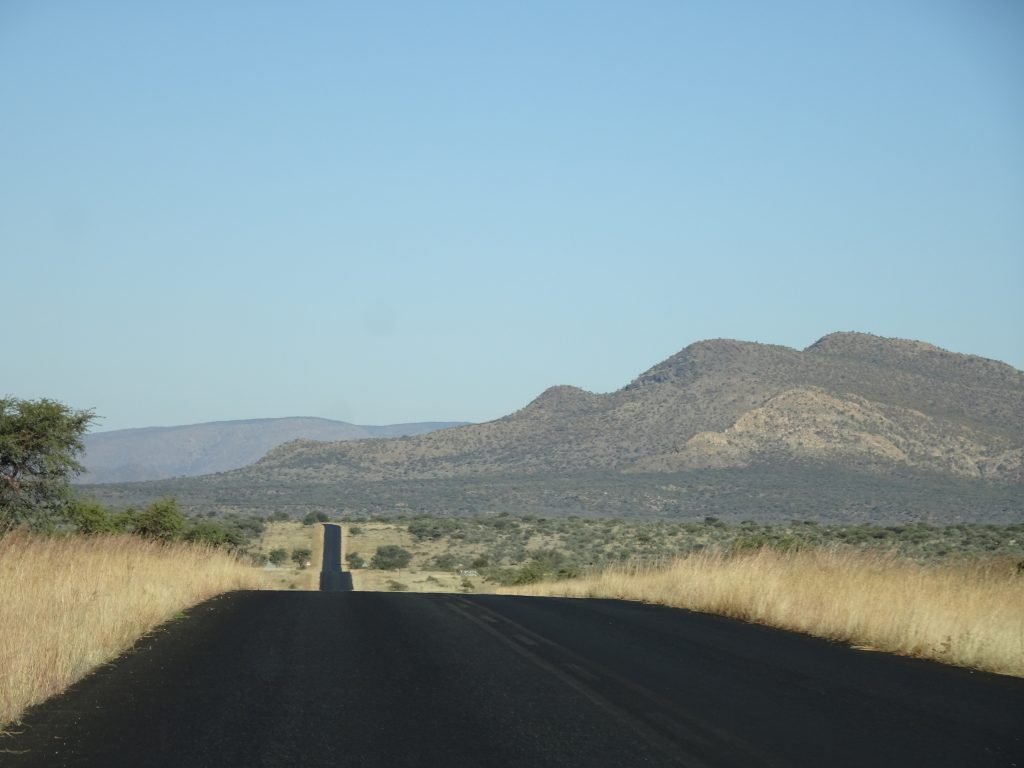
Loved driving in Namibia with no cars!

The stunning Kalahari Desert

We made it in time before it got pitch-black
Day 2 – Drive to Fish River Canyon (452 Km, 5 hrs)
Sunrise Safari at Bagatelle
Since we missed the sunset safari the previous day, we got up at the crack of dawn and went for a guided sunrise drive. The drive through the stunning red Kalahari Desert was something different. The unique landscape which fascinated me to plan a 2 weeks in Namibia trip was unfolding before us. First, we saw Oryx – the Namibian native animal. We loved seeing Oryx for the first time. We also saw a couple of other animals like zebras, blue wildebeest, giraffes, ostrich, springbok and fox.
Most people go for a sunset drive, so we were the only ones on this tour. After a few hours in the desert, they took us to their cheetah’s enclosure. All their cheetahs are rescued or orphaned. We spent time clicking photos but unfortunately; we didn’t get to see the cheetah feeding as it happens only in evenings. Early in the morning, meerkats come out of their burrows and can be seen in the wild while having breakfast at Bagatelle. Since we got late from our sunrise drive, we missed them.

Sunrise Drive in the Kalahari Desert
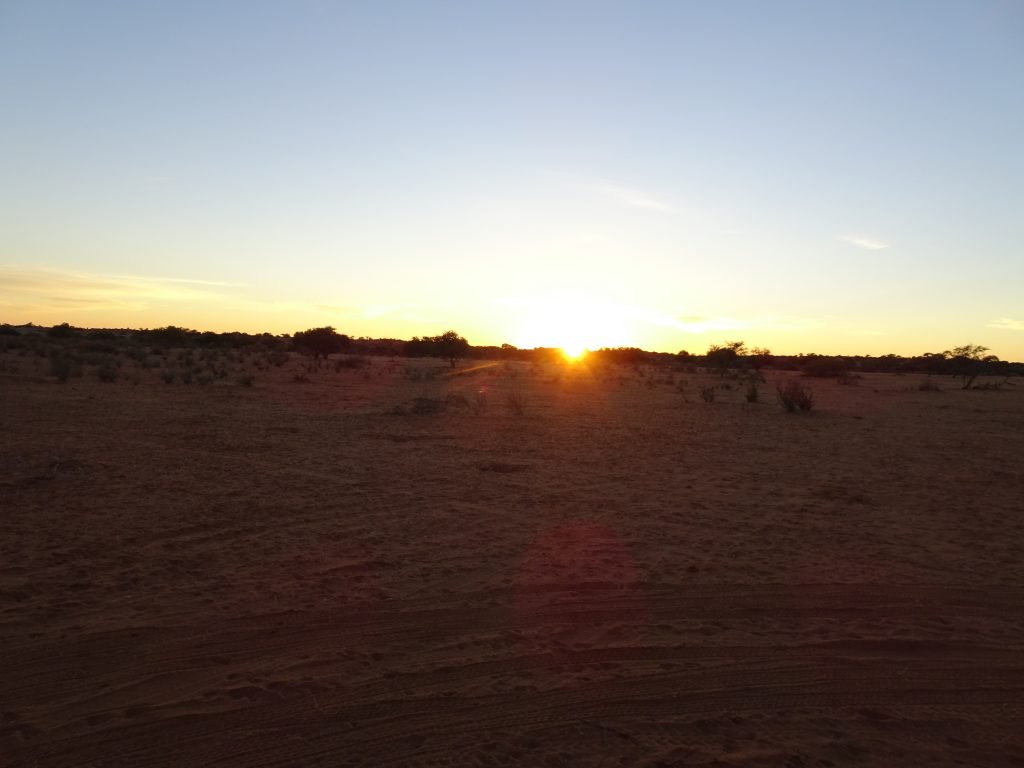
Namibian Sunrise
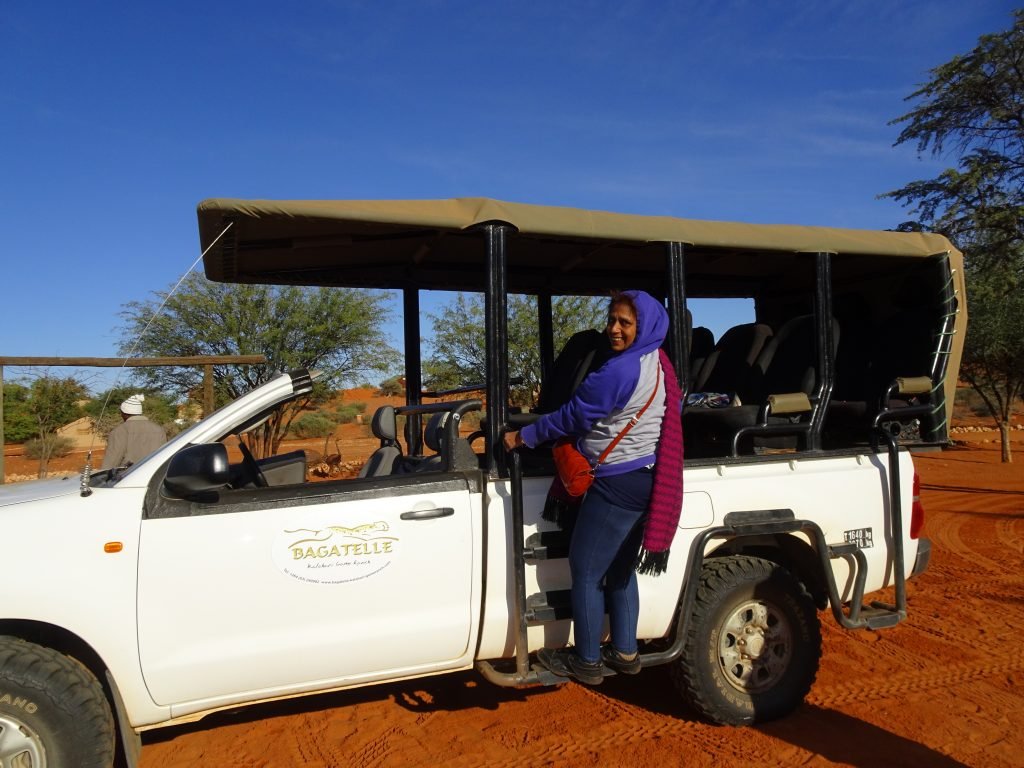
Our Safari Vehicle
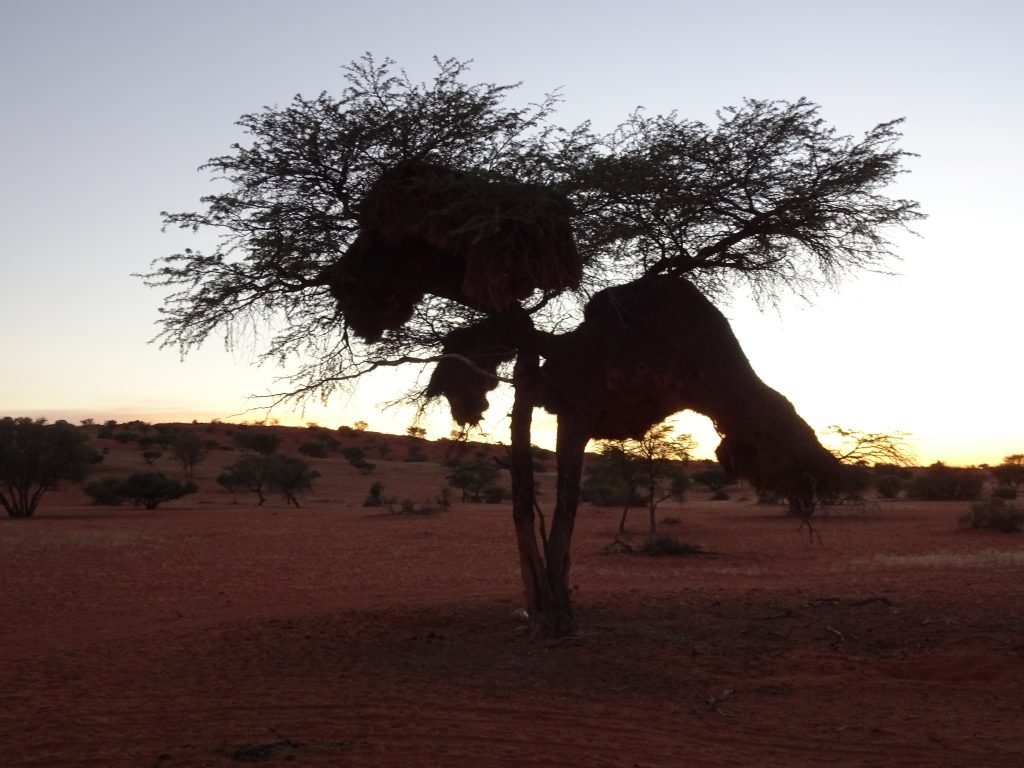
600 birds stay inside this huge nest
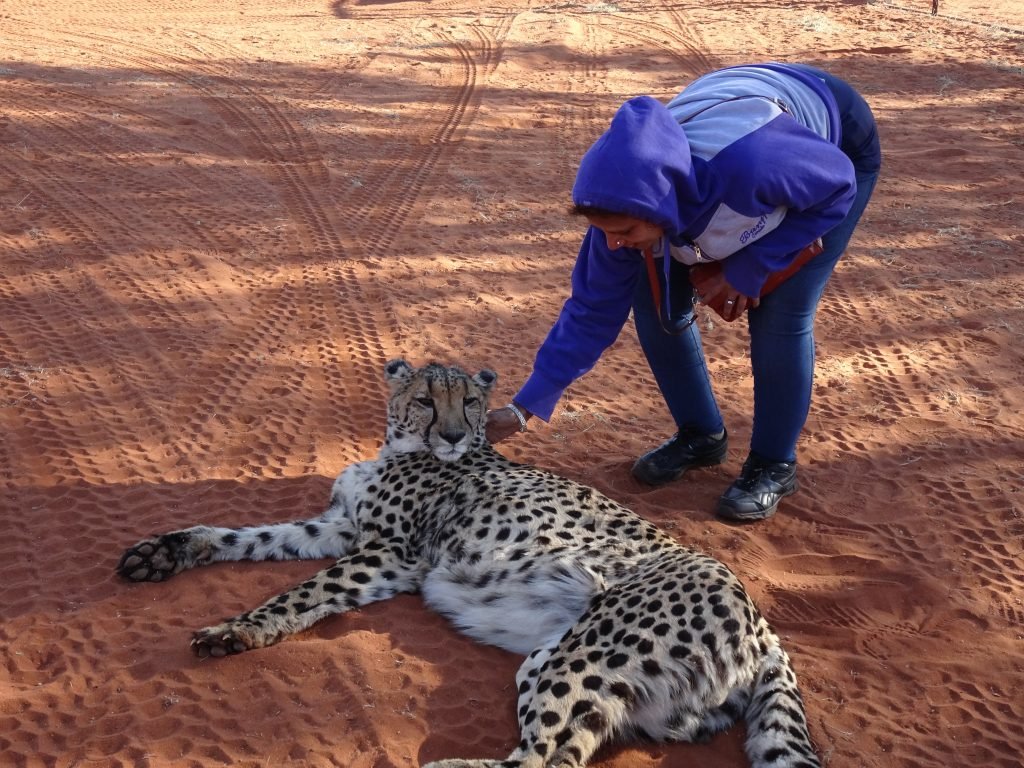
Loved stroking a Cheetah!
After breakfast, we started our drive to the Fish River Lodge.
Keetmanshoop (En-route)
- Here, you can see unique quiver trees.
- The quiver tree is known for looking upside down because the “leaves” look somewhat similar to roots.
- We saw a couple of them along the road from the comfort of our car.
- There is Quiver Tree Forest and Giant’s Playground, which charges around 85 NAD pp. We didn’t bother paying and going for the hike here.
- Garas Park Rest Camp – is an alternate to Quiver Tree Forest
- Fill petrol here- there is no fuel at Goageb even though your map or GPS may state otherwise.
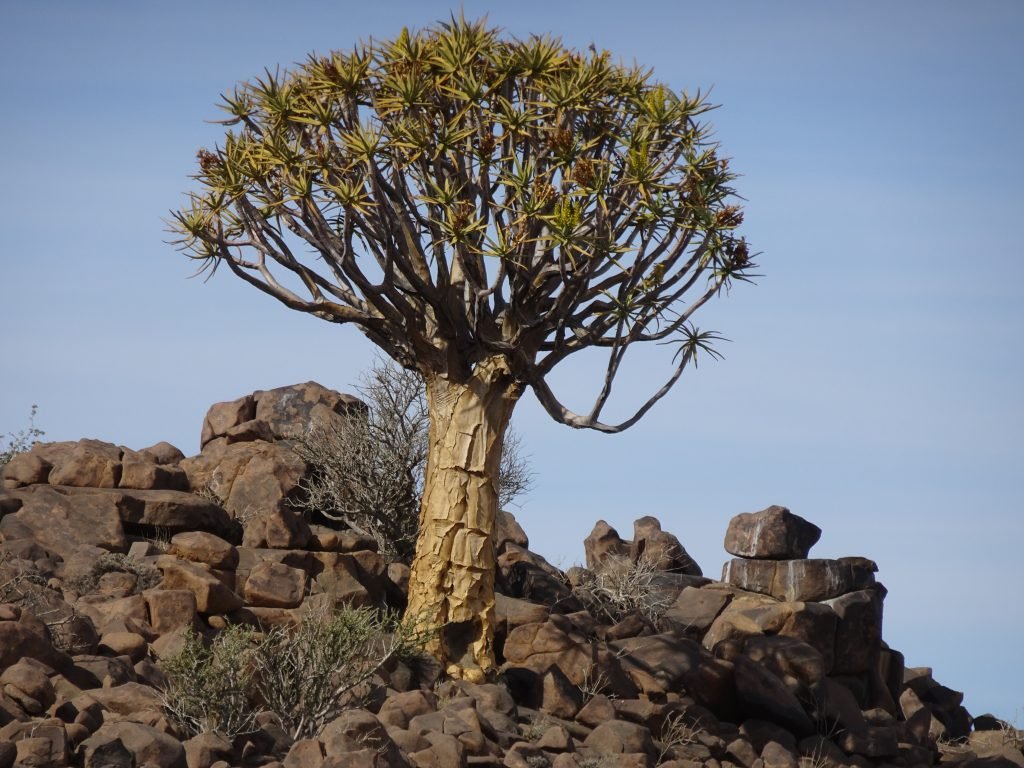
Quiver Trees along the road
After a quick photo stop for Quiver Trees, we continued our drive to the Fish River Lodge.
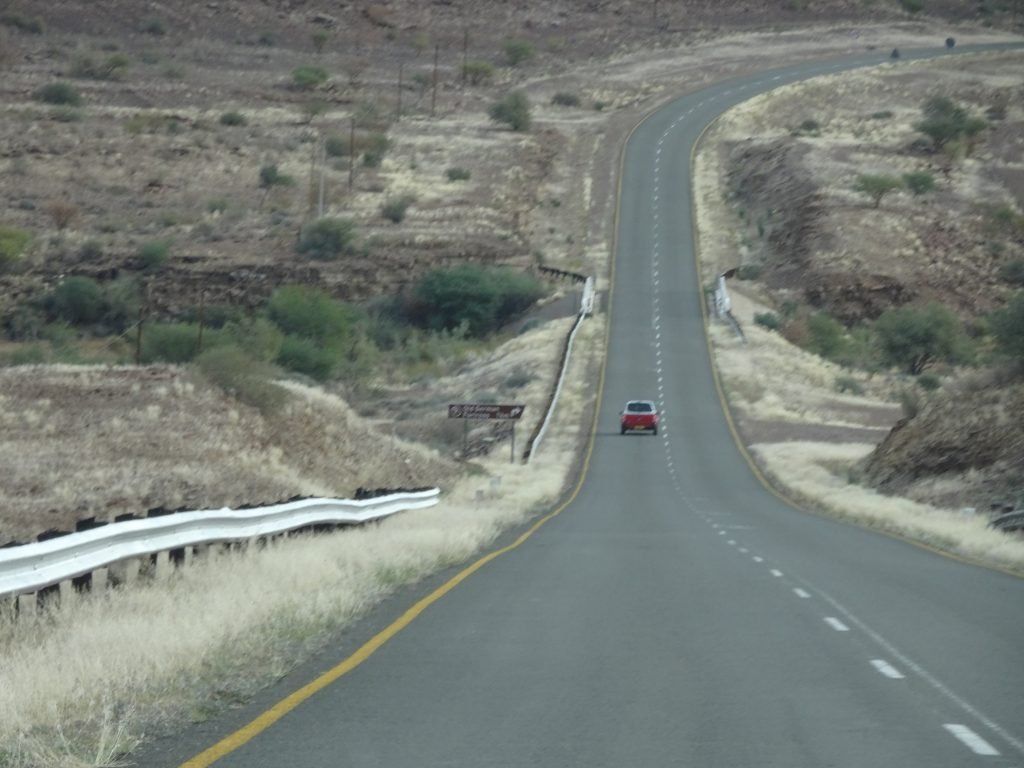
Only some of of the roads are sealed

For the most part, it is all gravel
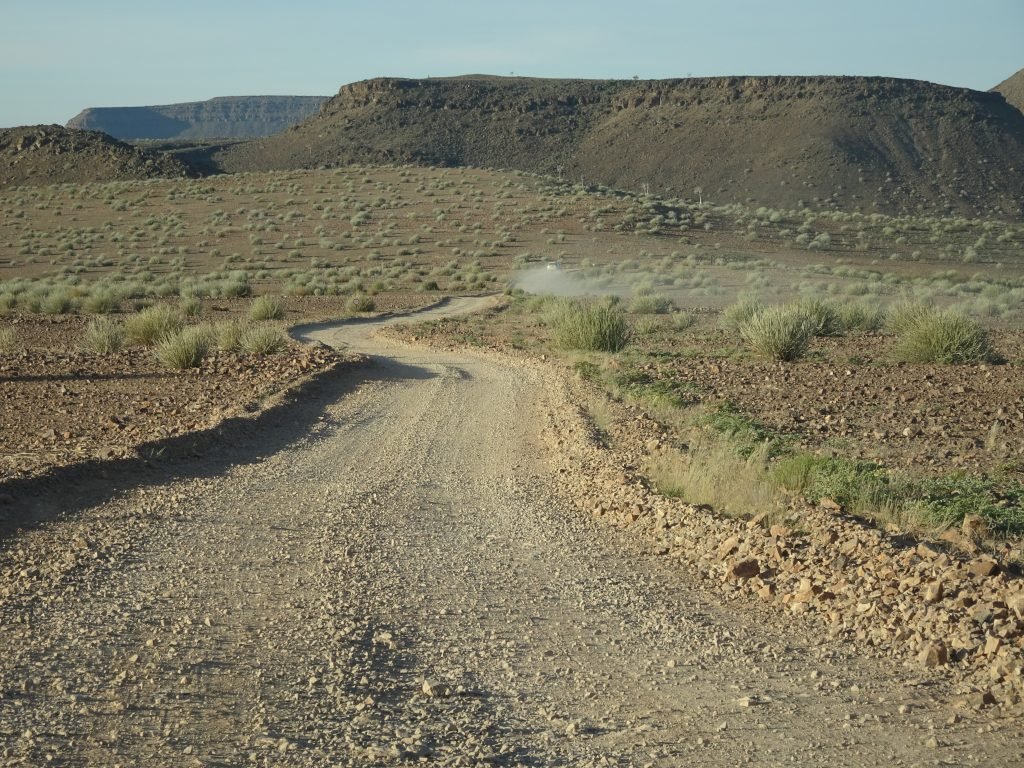
Some stretch is quite bad and tiring

Random rock formation along the road
Accommodation
We stayed at the Fish River Lodge, which is perched on the rim of the Fish River Canyon. This lodge has a western side view of the canyon. This is probably the only lodge that provides a day trip into the canyon by a jeep. We loved the views from this lodge. Most lodges are on the eastern of the canyon. They offer only hiking trips into the canyon. Our initial plan was just to stay a night on the eastern side and see the viewpoint. Soon, I realised, it is quite a long drive to the south of Namibia, just for a night. So I chose to stay for 2 nights at the Fish River Lodge which allowed time for a day trip into the canyon and also added a night in the Kalahari Desert to break the journey which turned out to be a fantastic choice.

View of the Canyon from our lodge

Just after sunset
Day 3 – Fish River Canyon
Day trip to the Fish River Canyon
At sunrise, we grabbed some breakfast and left for the tour with our friendly guide. We were the only ones on this tour, hence had the jeep to our-self. This tour can be done with a guide only as self-drive is prohibited. Two of the guests went for a hiking trip into the canyon and I believe rest of them just chilled in the lodge. The earlier part of the drive was fairly easy and offered pretty good views. After a while, we drove through back-breaking roads which our guide aptly called – it’s an African massage.
Halfway through the tour, we stopped at a viewpoint. The panoramas of the canyon with a river flowing through it was gorgeous. After clicking loads of photos, we drove to the bottom of the canyon. We could see the canyon up close and the beautiful green river flowing through the canyon. If adventurous, one can climb further down and swim in the river. The steps looked quite steep, therefore; we skipped it. We sat on the rock and had a picnic lunch enjoying the spectacular views of the canyon. Our lodge had packed us some sandwiches, protein bars, fruits, and a vast variety of soft drinks. It was a good day spent in the canyon and worth coming all the way here.
We were back by 3 pm and spent the rest of the day chilling in our lodge admiring the awesome views of the canyon from the swimming pool and our rooms. If scenic beauty is your thing and you have around 2 weeks in Namibia, I would highly recommend staying 2 nights here. Most of the itineraries which I read skipped this as it’s a far away from other popular places in Namibia.
Accommodation

Sunrise scene
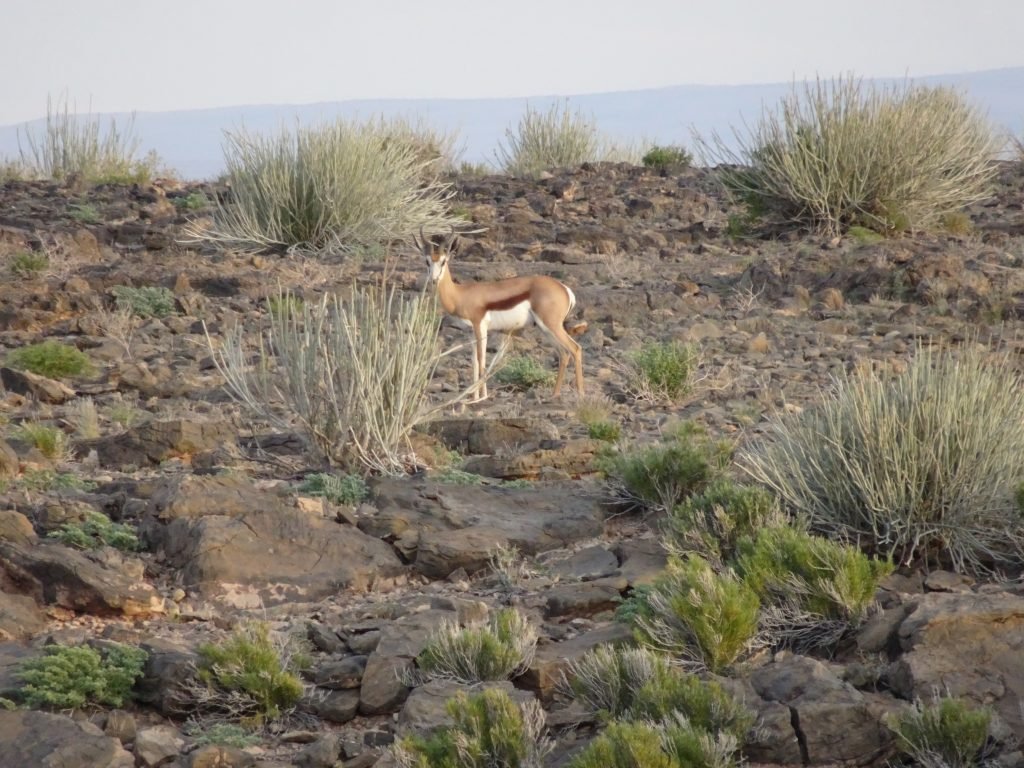
Spotted a springbok en-route to the canyon
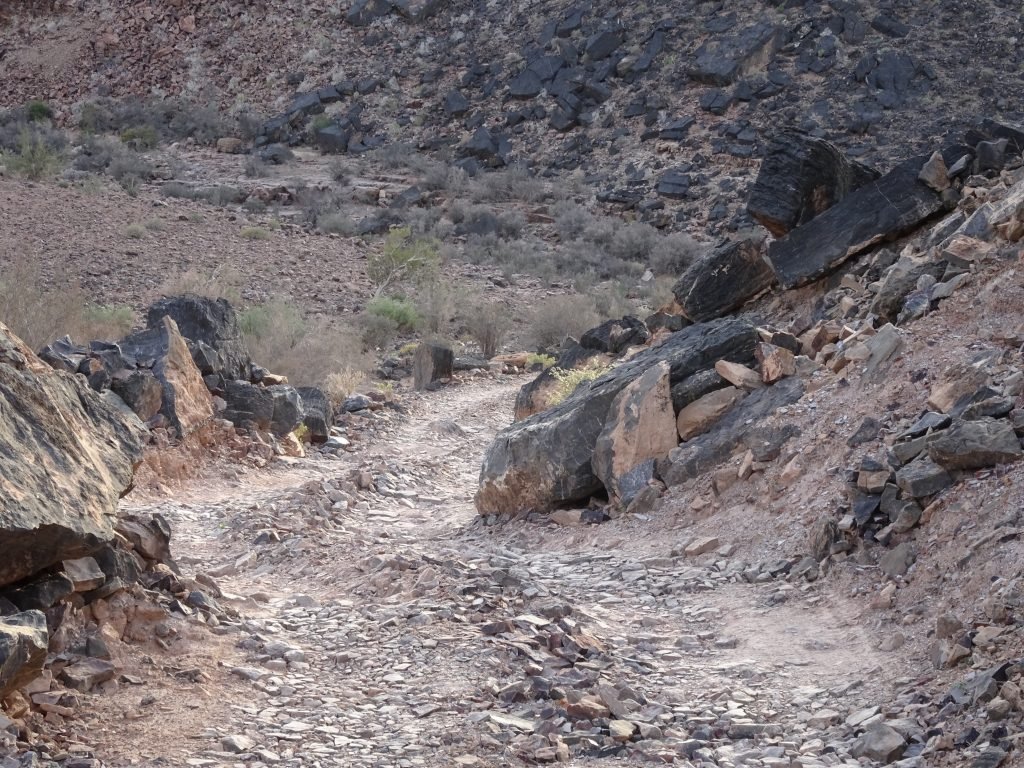
Want an African massage?
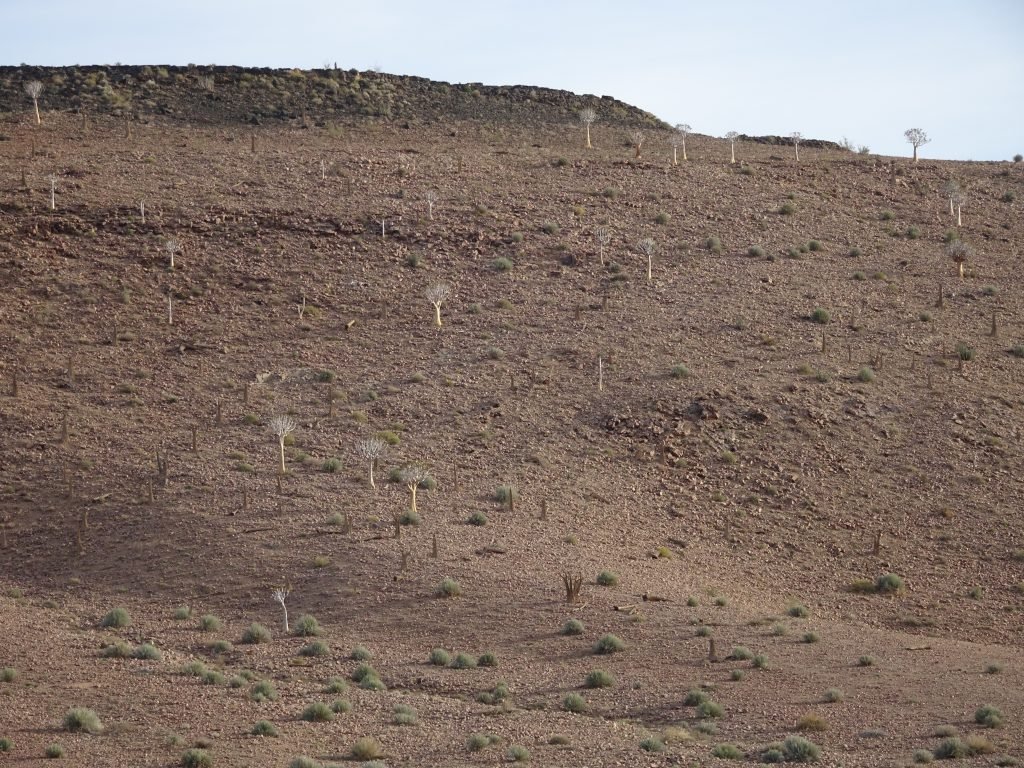
Quiver tree as far as eyes can see – unique to South of Namibia

Beautiful landscape en-route to the Fish River Canyon

First View of the Fish River Canyon
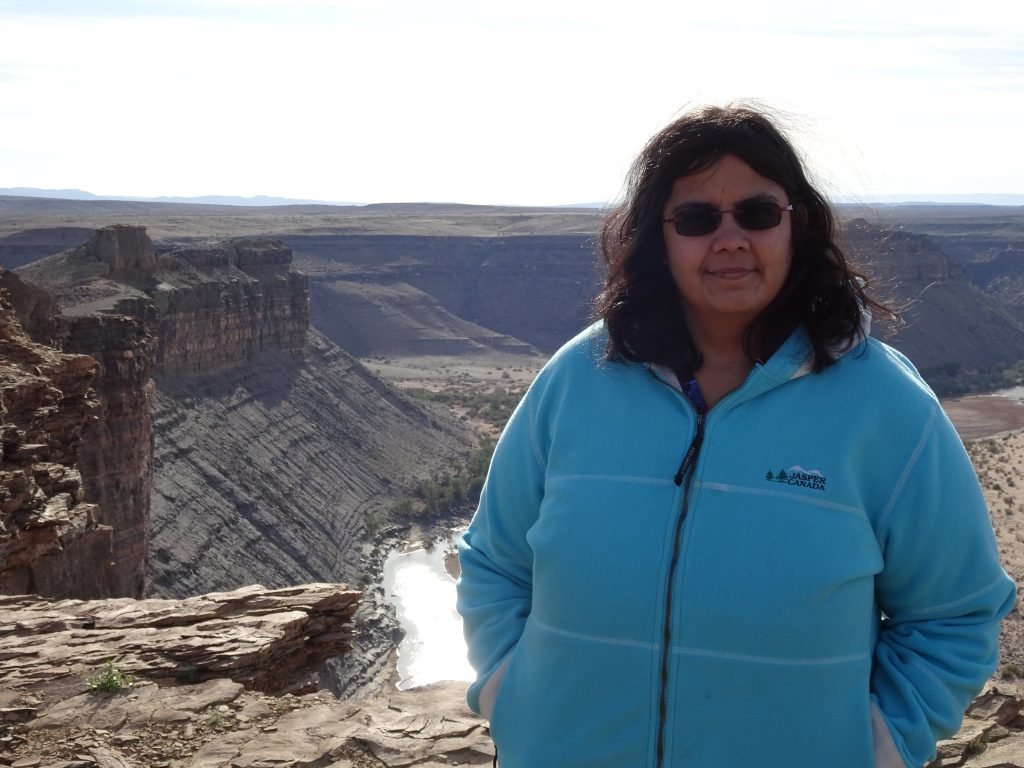
Gorgeous Fish River Canyon
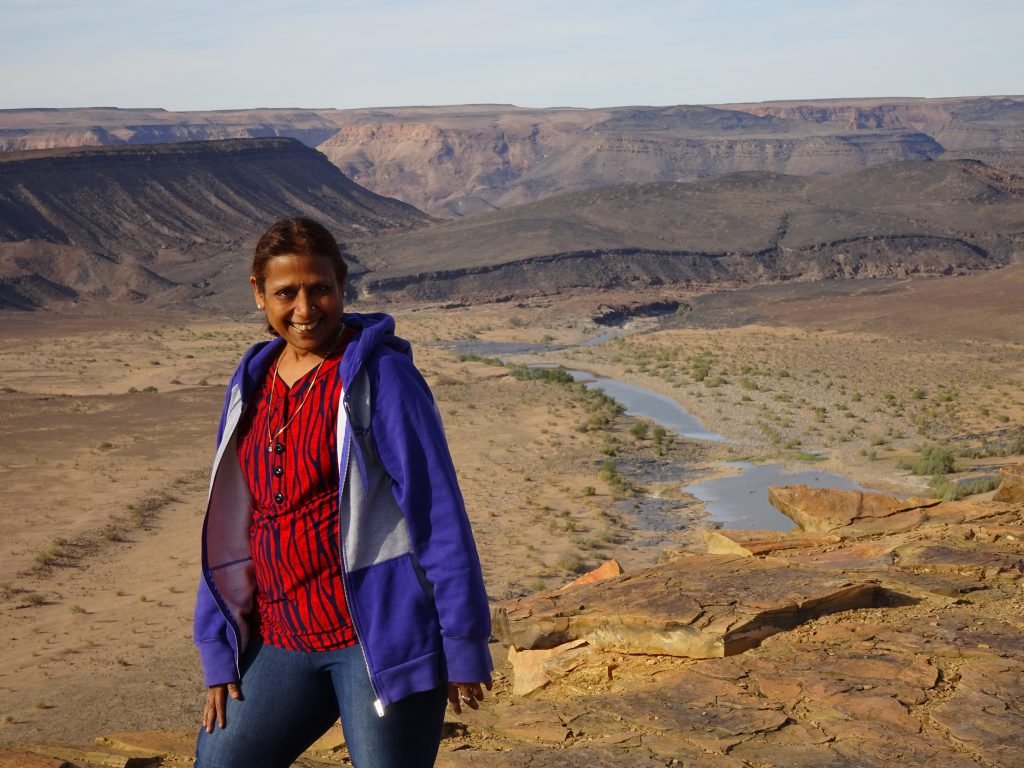
Can’t get enough of it!

Fish River Canyon view from the bottom

Lunch with a view
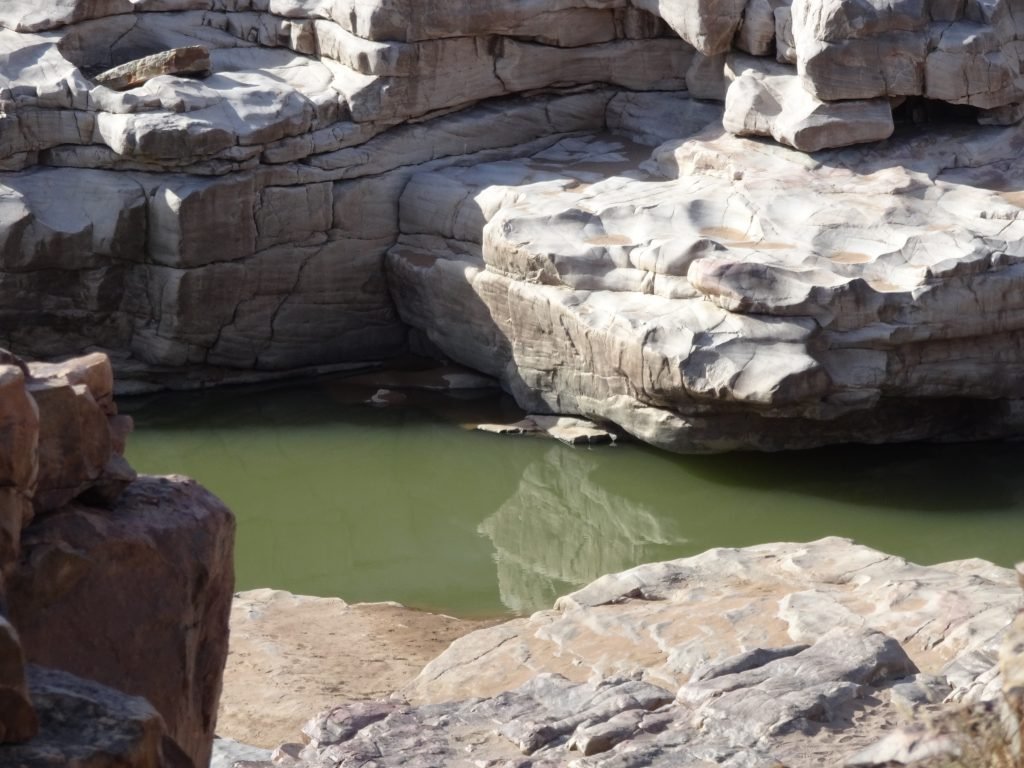
Loved the stunning views of the Fish River Canyon

4holidaymaniacs in Namibia

Beautiful Landscape

Spotted an ostrich on the way back to the lodge
Day 4 – Drive to Sossusvlei (492 Km, 6.5 hrs)
Today we spent all day driving. In Namibia, you drive mostly on the gravel roads but with a sturdy car, it is easily manageable. Moreover, most of them are deserted; won’t find any cars for miles and miles. We drove through some stunning scenery which made up for the bad roads. We also spotted zebras, oryx and springbok along the road. Before Namibia trip, we hadn’t seen Oryx anywhere. I found them too cute and could stare at them for hours. I think they are very underrated.
Accommodation
We stayed at the Sossusvlei Lodge. I saw some photos and was blown away by them. This was the only lodge I wanted to stay at in Sossusvlei. Initially, they said it’s full, but I was quite sure that they had blocked a large portion of the rooms for tour groups. So I asked them to put me on the waiting list and near to the time, I managed to get the booking. This lodge overlooks the desert and the views are to die for. This was the best lodge we stayed in Namibia and the food here was just out of the world.
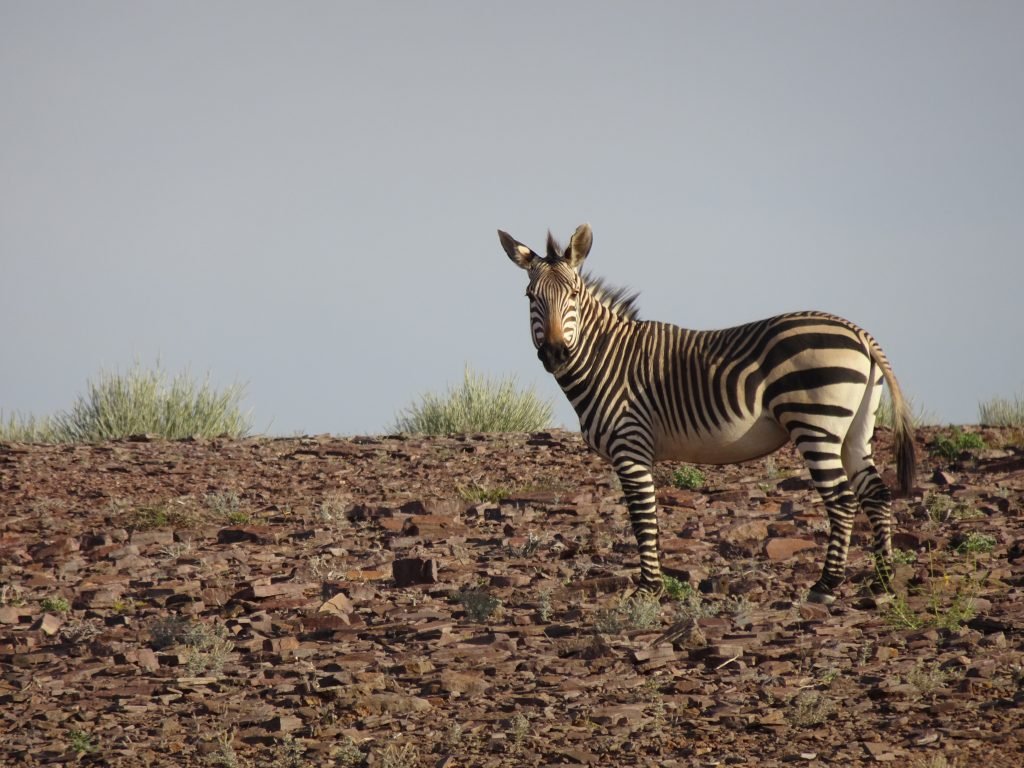
Spotted a zebra along the road

I like driving on empty roads
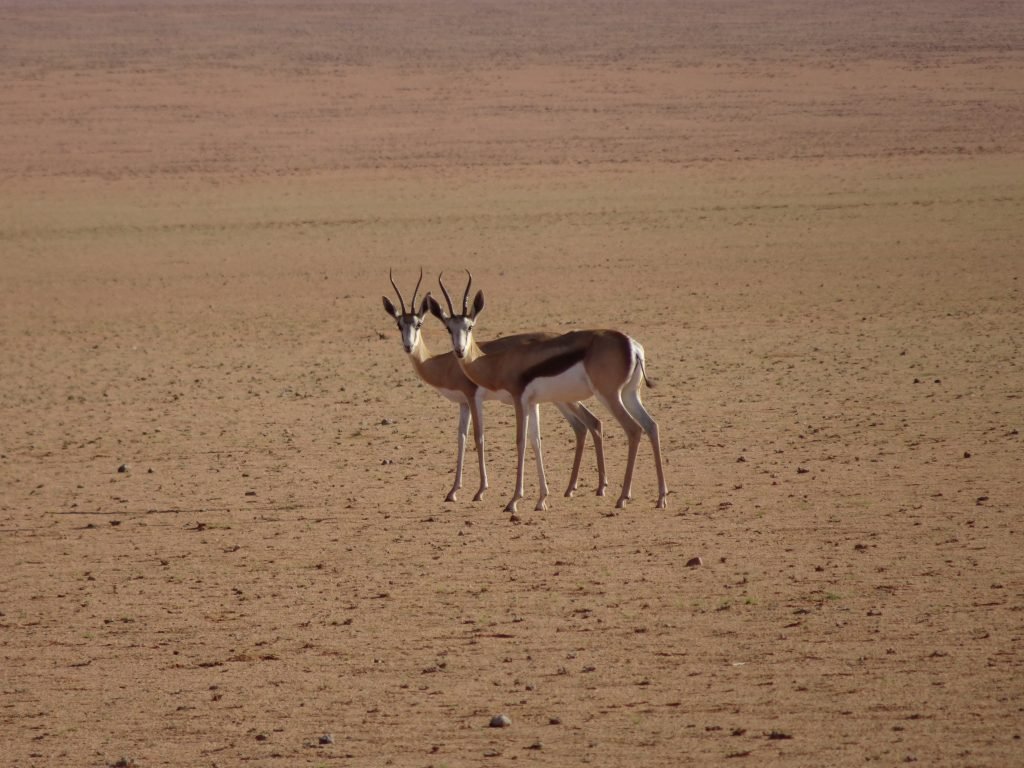
Springboks
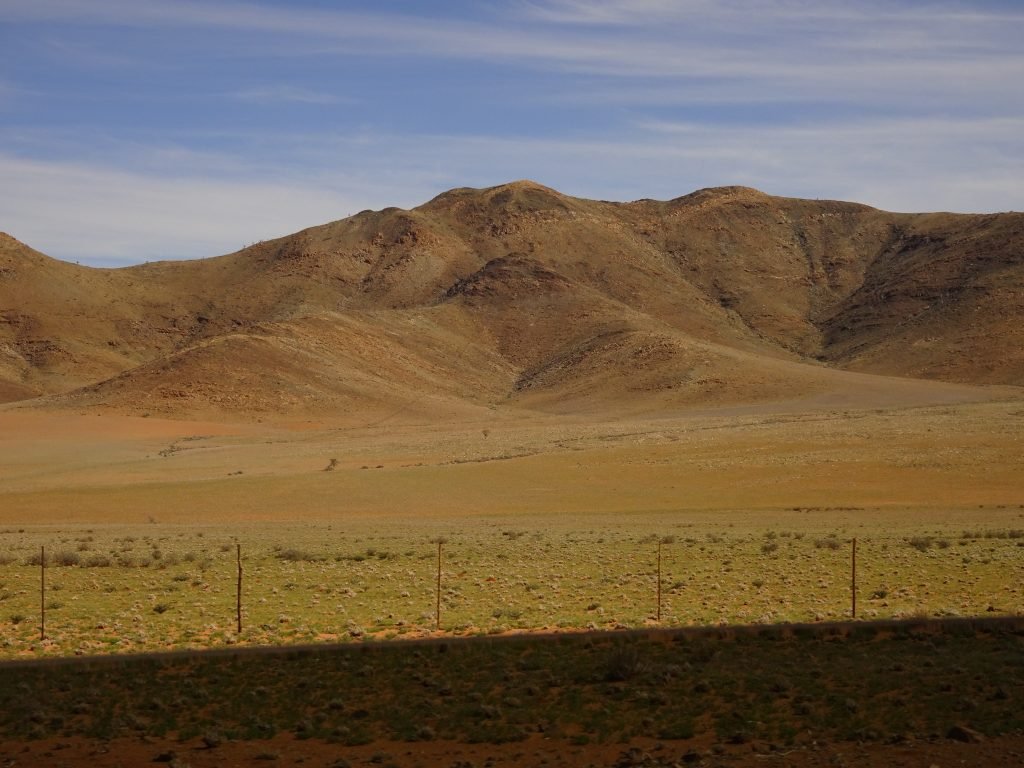
Beautiful Landscape

My favourite – Oryx
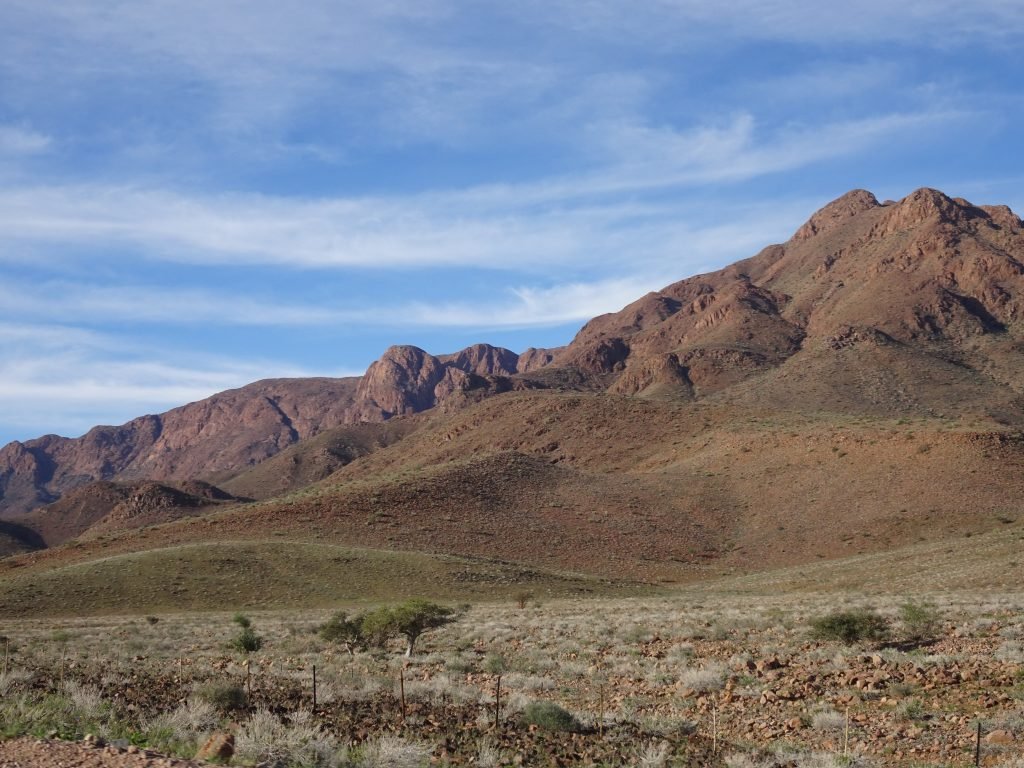
Mountains for company along the long journey

Stunning views all around

Desert view from the Sossusvlei Lodge
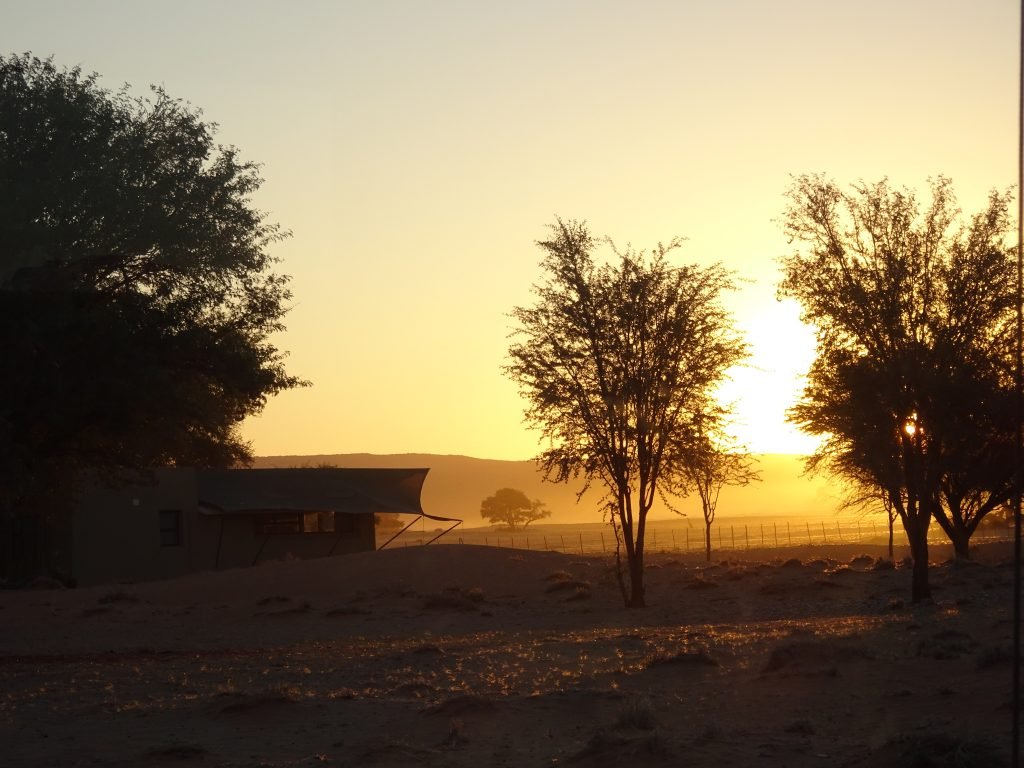
Picturesque Sunset at the Sossusvlei Lodge
Day 5 – Sossusvlei
If you’re planning a trip to Namibia, I’m sure you must have been blown away by the pictures of the red dunes of the Namib Desert. Sure, I was too and was really looking forward to this day. We were at the gate at the opening time of 8 am in order to avoid the heat. Once within the park, it’s a drive of about 60 km on a well-paved road to the parking lot from where you can hike to Deadvlei. First, we drove straight to Deadvlei which is the main attraction. We passed through a few small red dunes. They looked truly beautiful as I had imagined them to be.
Note:
- There are no ‘facilities’ at Deadvlei, so make sure to take plenty of water (One bottle of water per person) and snacks or a picnic breakfast/lunch. You can even ask your lodge for a packed breakfast.
- You have to pay entrance fees. We paid and also got a permit for Welwitschia Plain’s drive the next day.
- If you want to see sunrise or sunset at the dunes you must stay within the park. The Sossus Dune Lodge has a sunrise and sunset access.

Excellent Roads of Sossusvlei
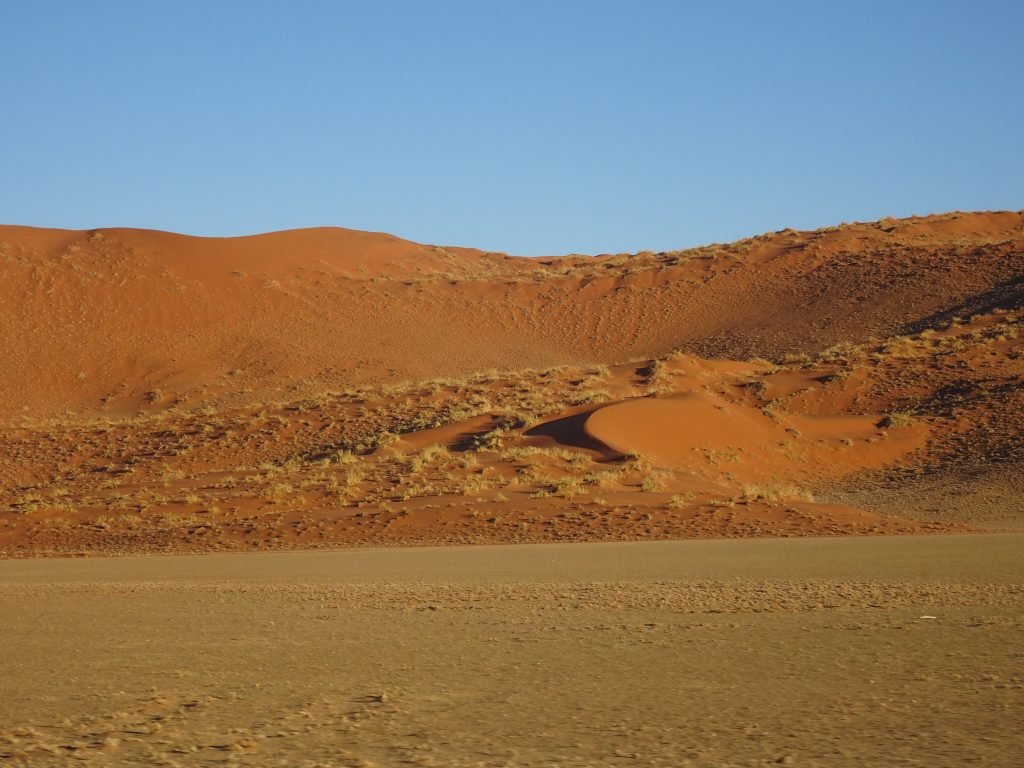
Small dunes
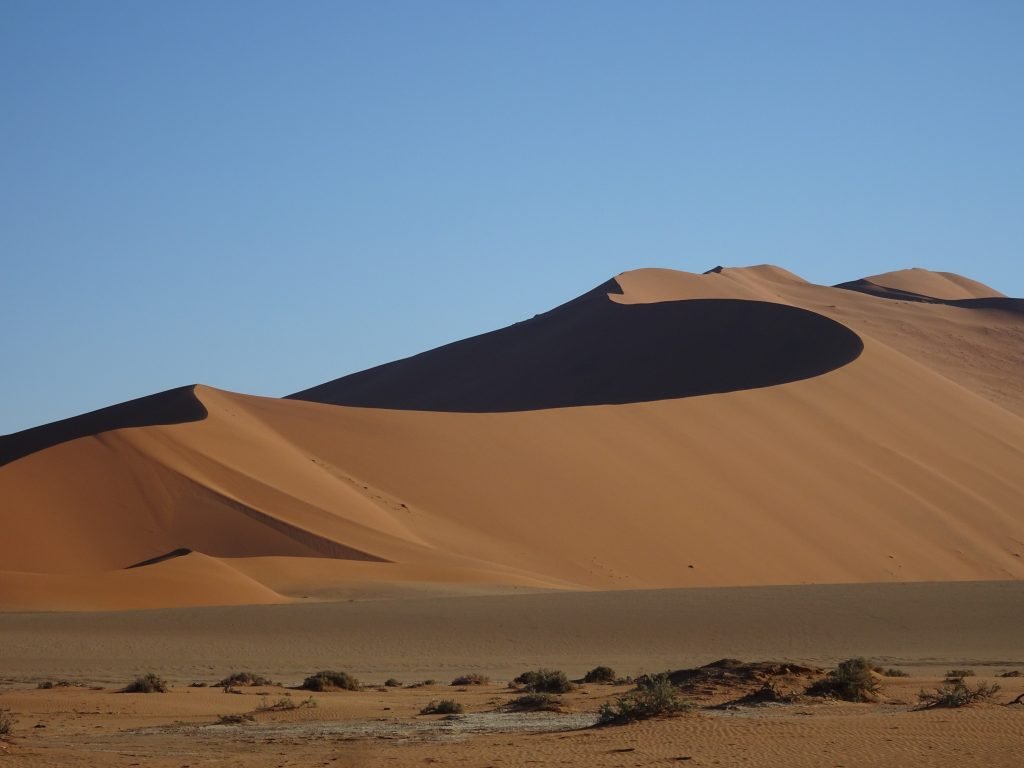
Stunning Red Sand Dunes
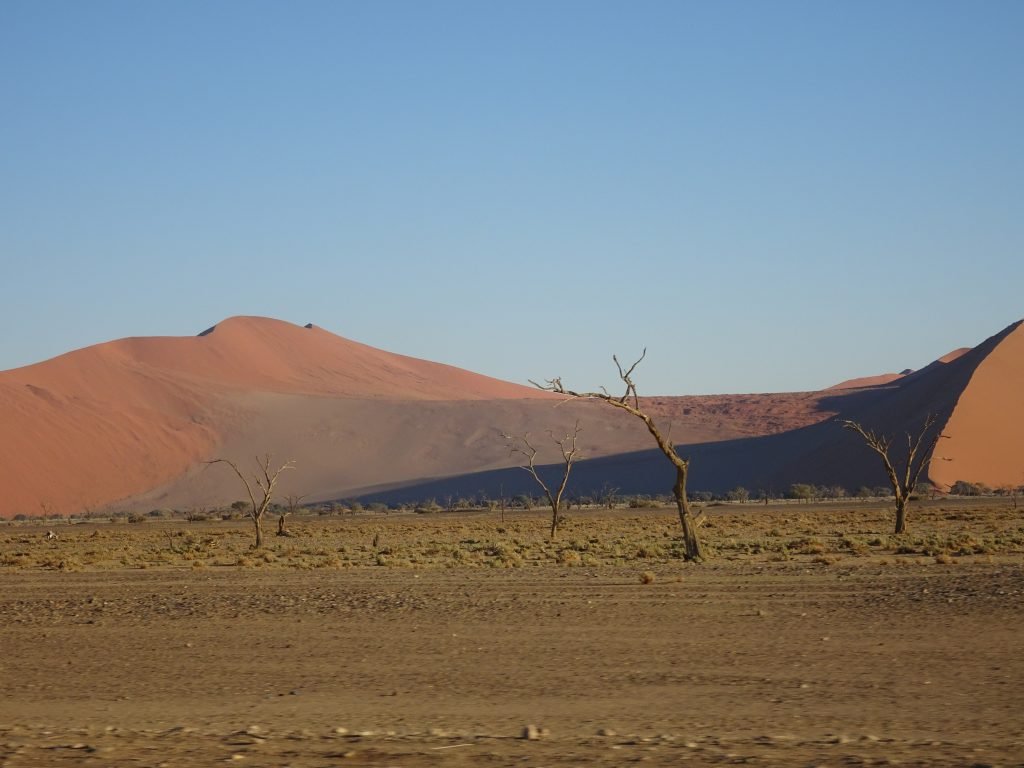
Views en-route to Deadvlei
Deadvlei & Big Daddy
It gets blazing hot during the day, hence make sure to visit Deadvlei and Big Daddy first thing in the morning or late in the evening. After parking the car, we took the shuttle to the base of Big Daddy. Our driver was super friendly and we loved his company. Though it was an expensive ride. If you have a car with 4wd, you can self-drive to the base. But I wouldn’t recommend it as many people got stuck there because of inexperience.
Standing at the foot of Big Daddy, the highest dune in the world, it feels something else. No words can describe the feeling. If hiking is your thing, you can even climb to the top of Big Daddy. It wasn’t for us so we just walked from the side of Big Daddy to Deadvlei.
Hike to Deadvlei was a pretty daunting task for us. We went up and down a few dunes. After a gruelling walk and thinking to turn back a few times, we finally made it and were rewarded with breath-taking views of Deadvlei. It is significantly different from anything we have ever witnessed. After spending a lot of time clicking hundreds of pictures and enjoying the surrounding, we walked back in the scorching sun without no water which was very tiring and exhausting for us. Somehow we didn’t carry enough water. I was so desperate that even got shameless and asked another couple for water who stopped by as they had seen us at the Fish River Lodge. But they said they prefer not to and moved on.

Stunning Namibian Desert

Big Daddy – Highest dune in the world

People climbing Big Daddy

Walk to Deadvlei
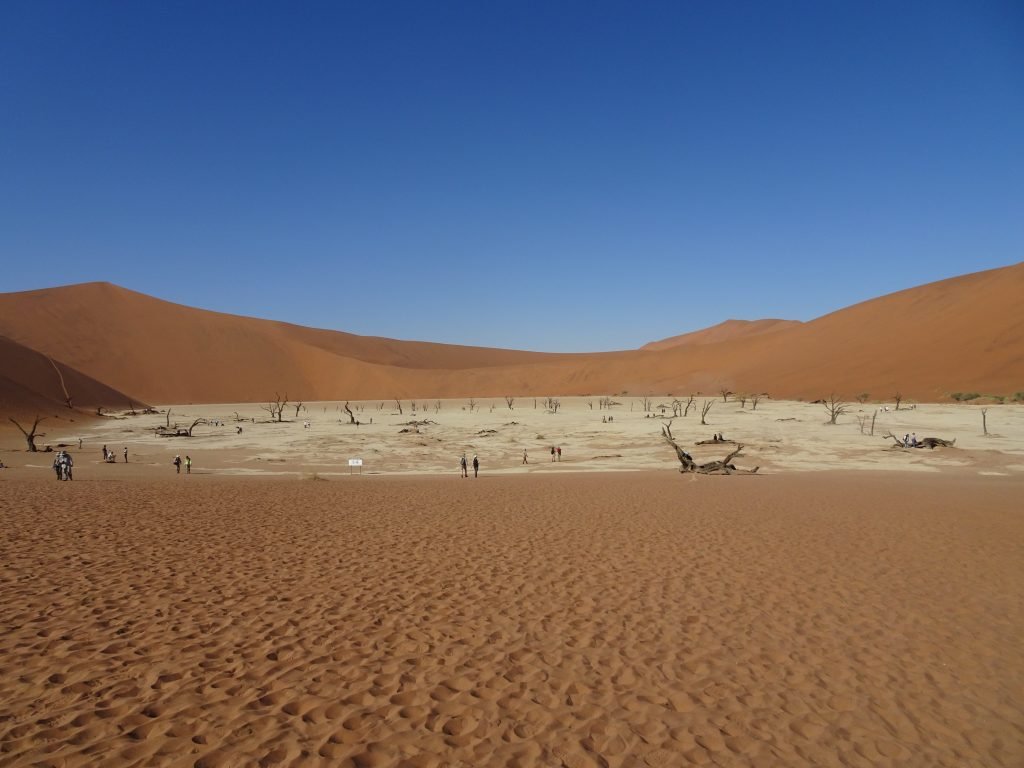
First glimpse of Deadvlei
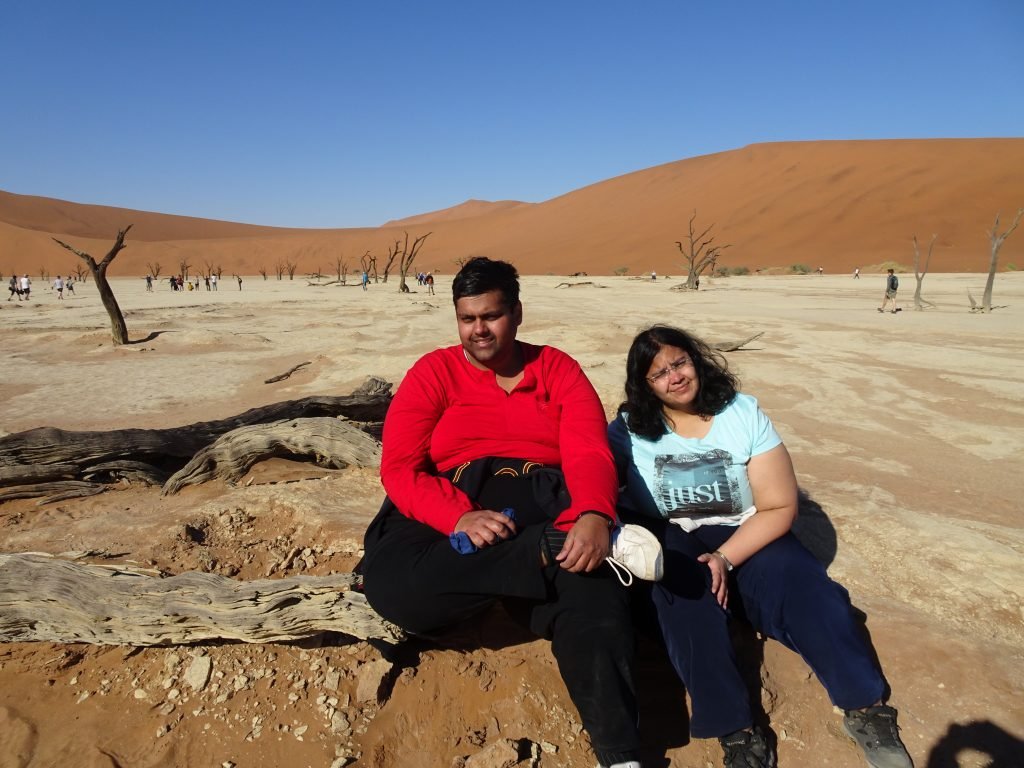
Deadvlei

Walk back to the car – One more dune to go

Back in the shuttle – feeling exhausted and conquered
Picnic Brunch
After the hike, we set up our table and had a picnic brunch. Our hotel went too over-board and packed a huge picnic basket for us. It had a basket of bread, a plate of salad and cheese, 4 huge jars of cereals and yoghurt, a carton of juice and milk, and even an entire thermos of coffee and tea. At one point, we even started wondering if it is for free or they will charge for the same. We confirmed – it was free. This lodge surely knows how to do extravagant meals – be it breakfast or dinner.

Picnic brunch in Namibian Desert – Can’t get better than this!

Our Picnic Basket
Other viewpoints inside the park
- Dune 45 – One can climb this dune, but it is tough. We drove to the bottom and stopped for a quick photo.
- Elim dune – Again a quick photo stop.
- Sesriem Canyon – It was an easy walk to the canyon. Once there, it offered amazing views of the canyon. We stopped for a quick visit. It was inside the park, so have to do along with the dunes otherwise will have to pay the entry fees twice.

Pied Crow
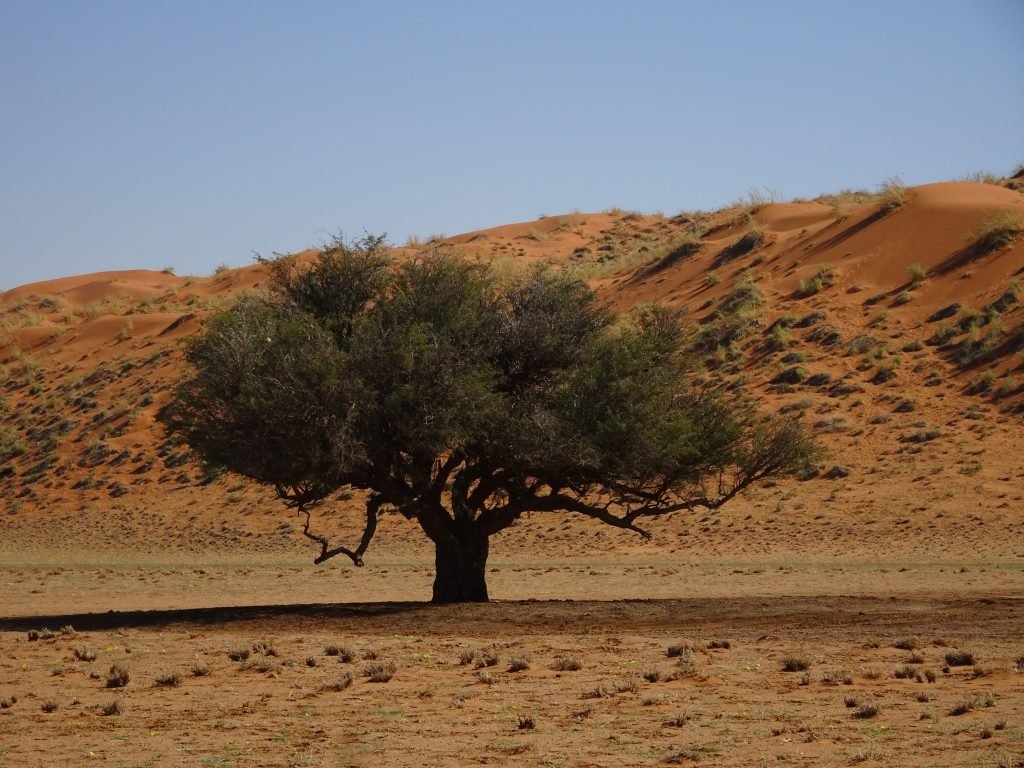
Elim Dune
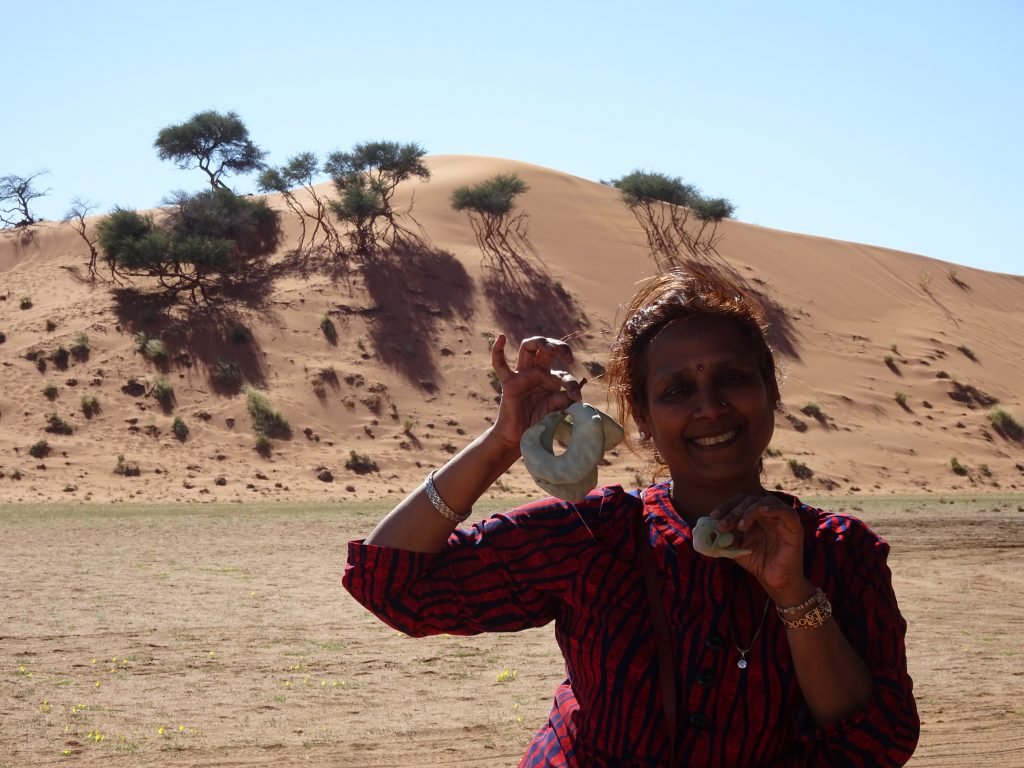
Mom found some Imli at Elim Dune

Sesriem Canyon
We were back at the lodge by 3 pm, exhausted having spent the day in the desert. We chilled in our lodge for the rest of the day with desert views. Also had a nice bath in the hot tub in our room.
Accommodation
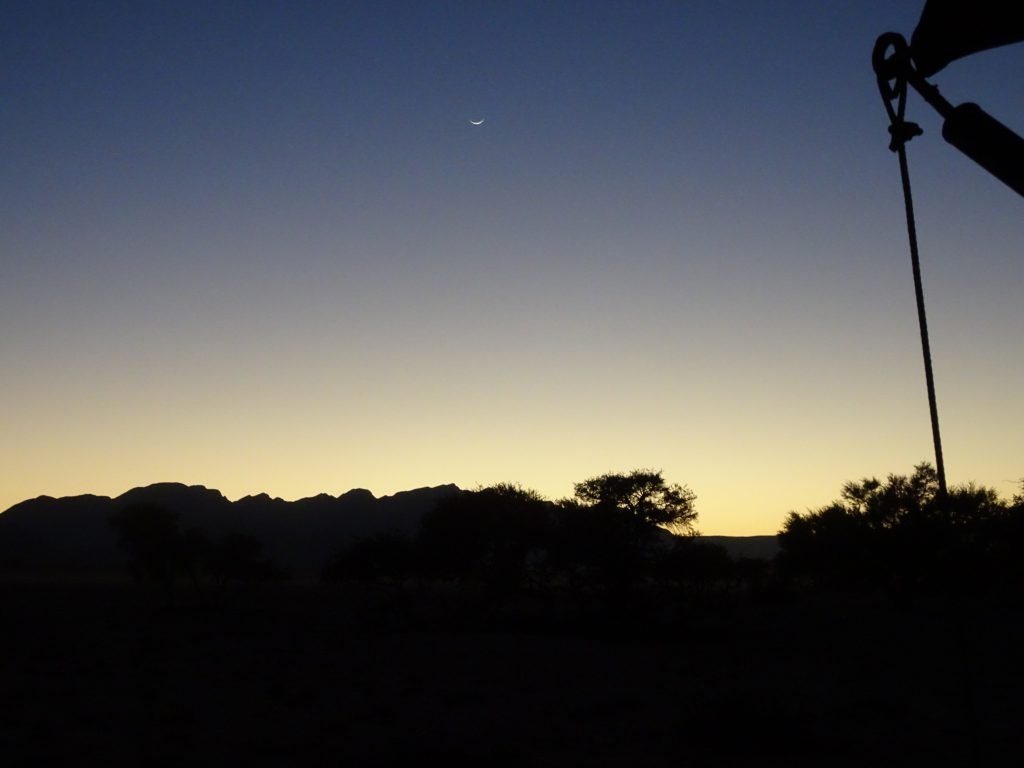
Night Scenes
Day 6 – Drive to Swakopmund (345 Km, 4.5 hrs)
We drove to Swakopmund via Welwitschia Plains which is about 10 Km detour.
Route via Welwitschia Plains
- From Sesriem, take the D826 to the C19 turn off (approx. 11 km)
- Turn left onto the C19 and drive to Solitaire (approx. 72 km)
- From Solitaire take the C14 and drive to the Ghaub and Kuiseb Pass to the D1998 turn off (approx. 107 km)
- Turn right onto the D1998 and drive to the D1982 turn off (approx. 27 km)
- Turn right onto the D1982 and drive to the D1985 turn off (approx. 11 km)
- Turn left onto the D1985 and drive to the C28 turn off (approx. 22 km)
- Follow the C28 to the signposted turnoff of the Welwitschia Plains Drive (approx. 113 km)
Solitaire
- Is home to the only gas station between Sossusvlei and Walvis Bay, so fill up even if you don’t need to.
- Is also home to McGregor’s Bakery. I read raving reviews about their apple and meat pies. So we had to stop and try it. We tried their apple pie and some other desserts. For us, it was about good but nothing out of the world. Also, a little too sweet as there wasn’t any savoury veg item on the menu.
- Also, there are some rusty abandoned cars on site. It is good for a quick photo.
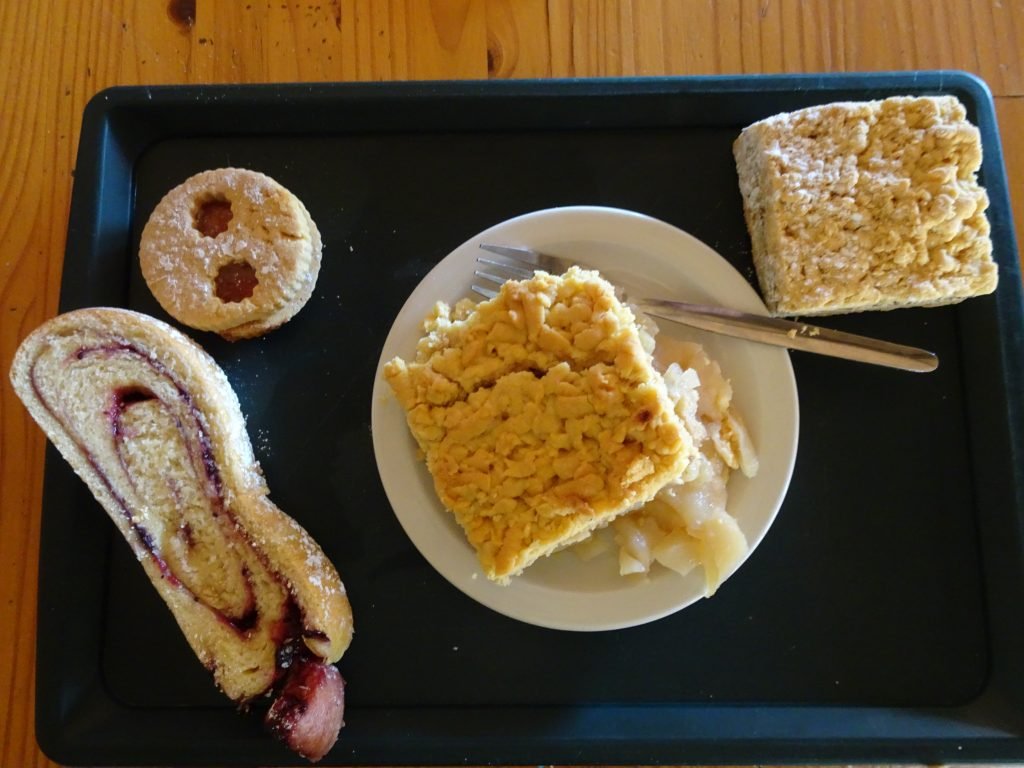
Sugar overload at McGregor’s Bakery

Abandoned Cars
Tropic of Capricorn
- As the name indicates, a sign of Tropic of Capricorn for a touristy photo.
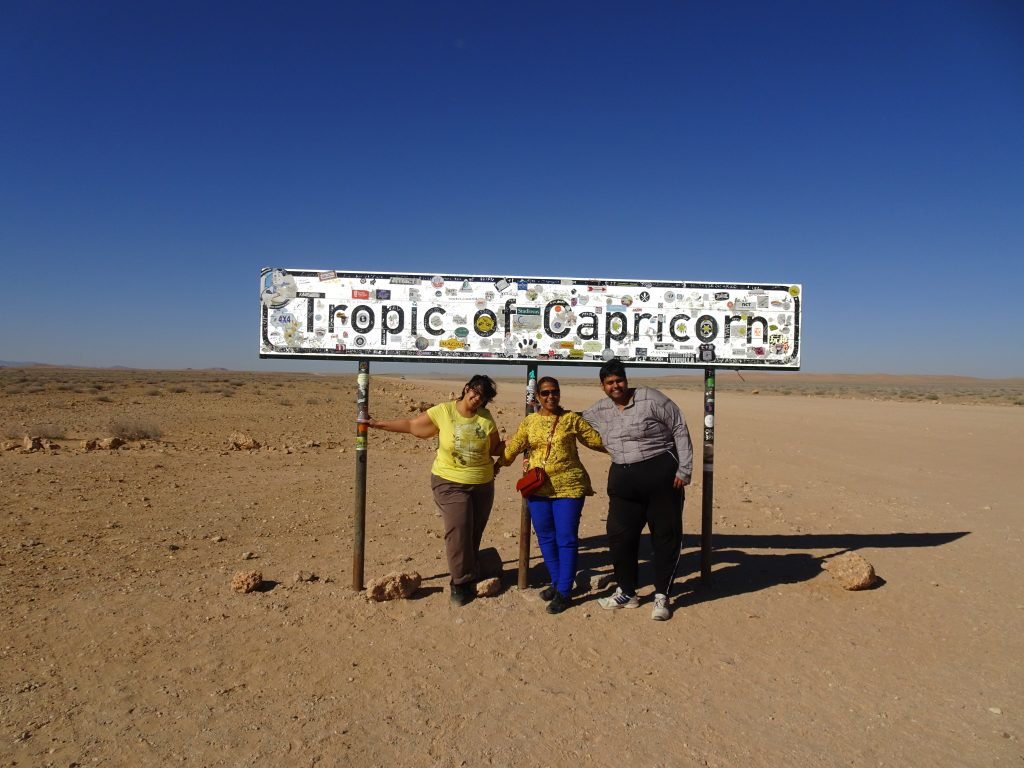
Tropic of Capricorn
Kuiseb Pass
- C14 takes you inside Kuiseb and Gaub canyons; It is an amazing drive.
- There is a spectacular viewpoint at the top of the pass, providing 360-degree views. We loved this viewpoint and is a must-visit. It is somewhat similar to the moon landscape.
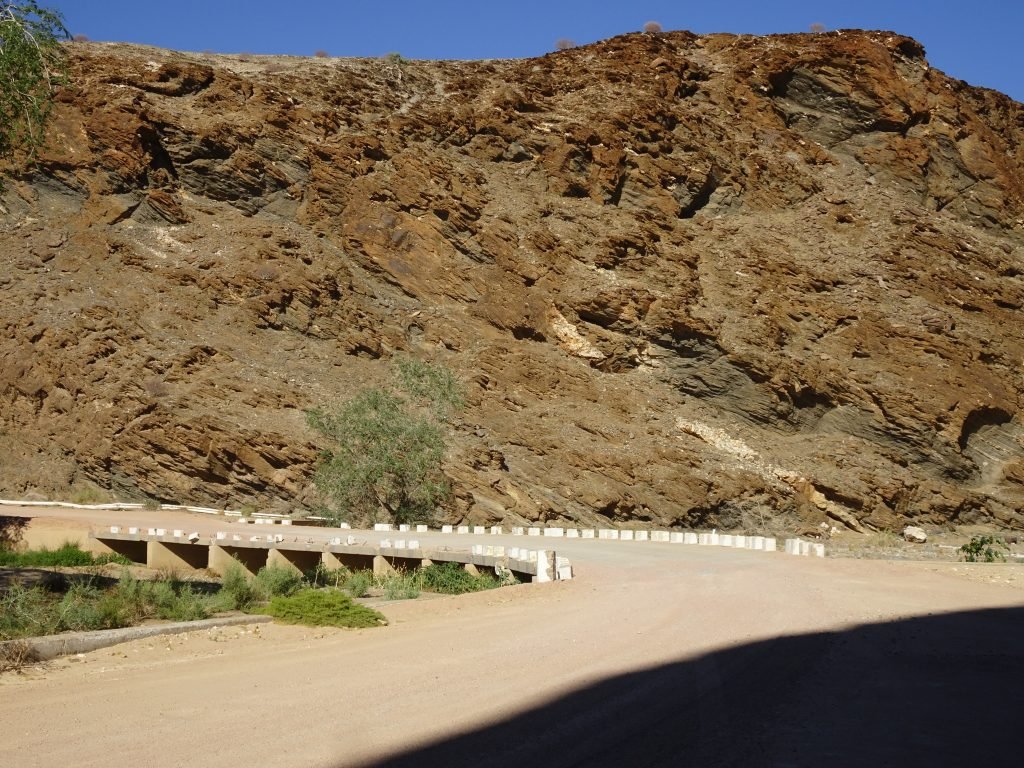
Kuiseb Pass Drive

Amazing view-point
After Kuiseb, either go via Walvis Bay (C-14) or Welwitschia Plains (C-28) to Swakopmund. We drove via Welwitschia Plains.
Vogberg
- There is one scenic stop, just before Walvis Bay. It is a rocky outcrop.
- This won’t come if going via Welwitschia Plains.
Welwitschia Plains and Moon Landscape
- This tour is famous for rare Welwitschia plants. Apart from that, it is a scenic drive with all the things unusual, which you get to see on the various viewpoints and the magnificent moon landscape.
- To do the complete tour, it takes around 3 hours.
- There isn’t any fuel or shops on the route.
- Permit – If doing this drive en-route to Swakopmund, get the permit at Sossusvlei. Else, you will have to drive to Swakopmund or Walvis Bay to get the permit from the NWR office.
- The permit comes with a map that has all the information about the 13 view-points on this route. Since we got the permit at Sossusvlei, they didn’t give us a map. I had found the same online and got it printed beforehand.
- Half-day guided tours are also available. But we did a self-drive tour. I would recommend the same as it was easy to follow the map and there is no need to pay a hefty price for the guided tour.
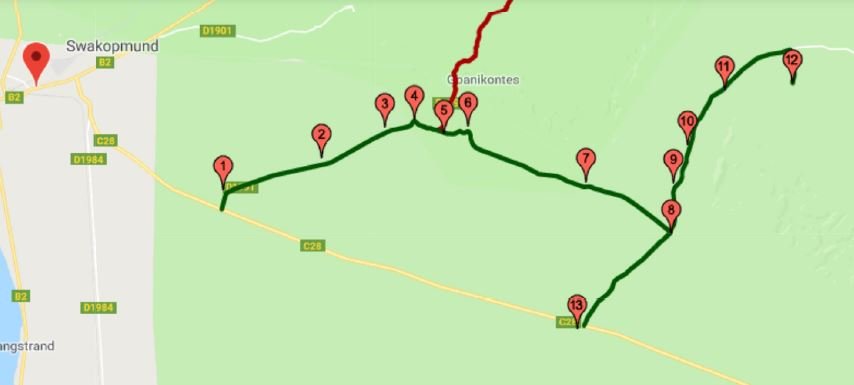
Map of Welwitschia Plains Drive
13 Points of Welwitschia Plains
- Since we drove from Sossusvlei, first we came across viewpoint no. 13 – Von Stryk Mine.
- As per the map, the next viewpoint is no. 8 – Dolerite ridges on the hills and no. 9 – Dolerite. Both these viewpoints are at a considerable distance from no. 13. Initially, we thought, we missed it and should have come with a guide. But after driving a few kilometres, we spotted it and the rest of the viewpoints were near to each other.
- Then comes point no. 10, which is nothing special.
- Point no. 11 and 12 are the most famous viewpoints. Needles to say, it’s Welwitschia plants.
- Then comes point no. 7 which is war remains.
- Point no. 6 and 4 both are moon landscapes. It offers breath-taking views in all directions. This was one of our favourite viewpoints of the trip.
- Point no. 5 is Lichen Fields. Due to the Namibian climate, the lichen fields here are more extensive than anywhere else in the world.
- View-point no. 3 is tracks of an ox-wagon trail which was used decades ago.
- Point no. 2 is Desert Vegetation where you can find two kinds of drought-resistant shrubs: The Dollar bush – so-called because of its coin-like round leaves, and the Ink Bush, with its fine leaves and spindly appearance.
- Point no. 1 used to be lichens field but now have disappeared due to tourists walking over them.
- If you don’t want to do the whole route, you can turn off for Goanikontes.
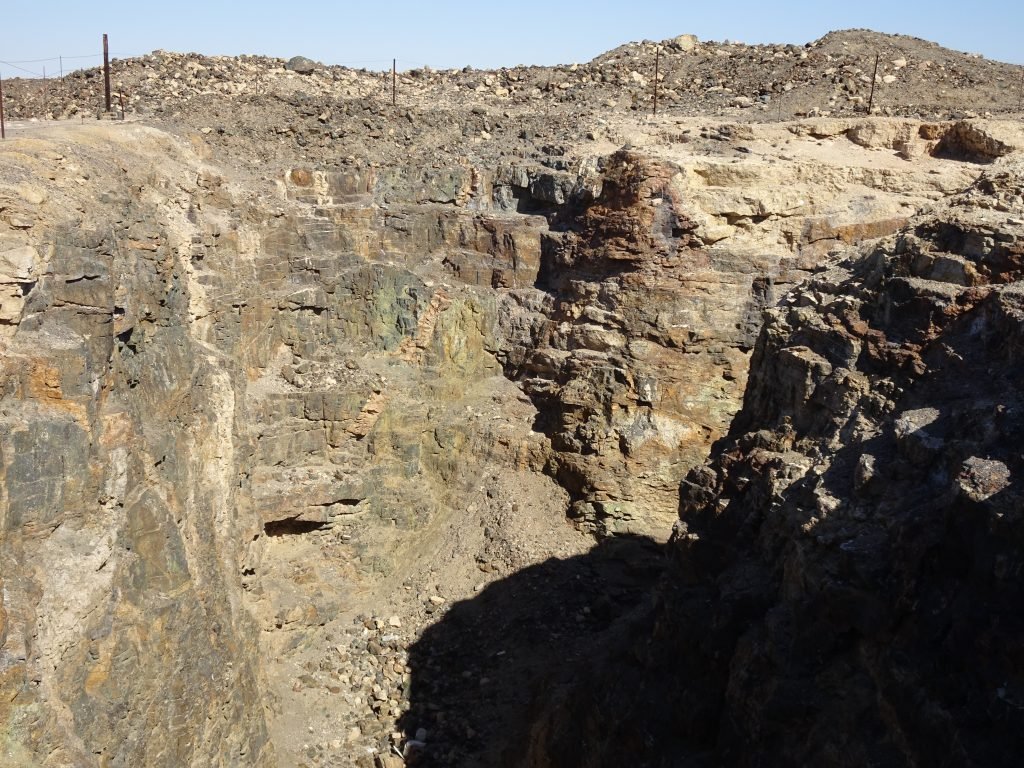
Von Stryk Mine
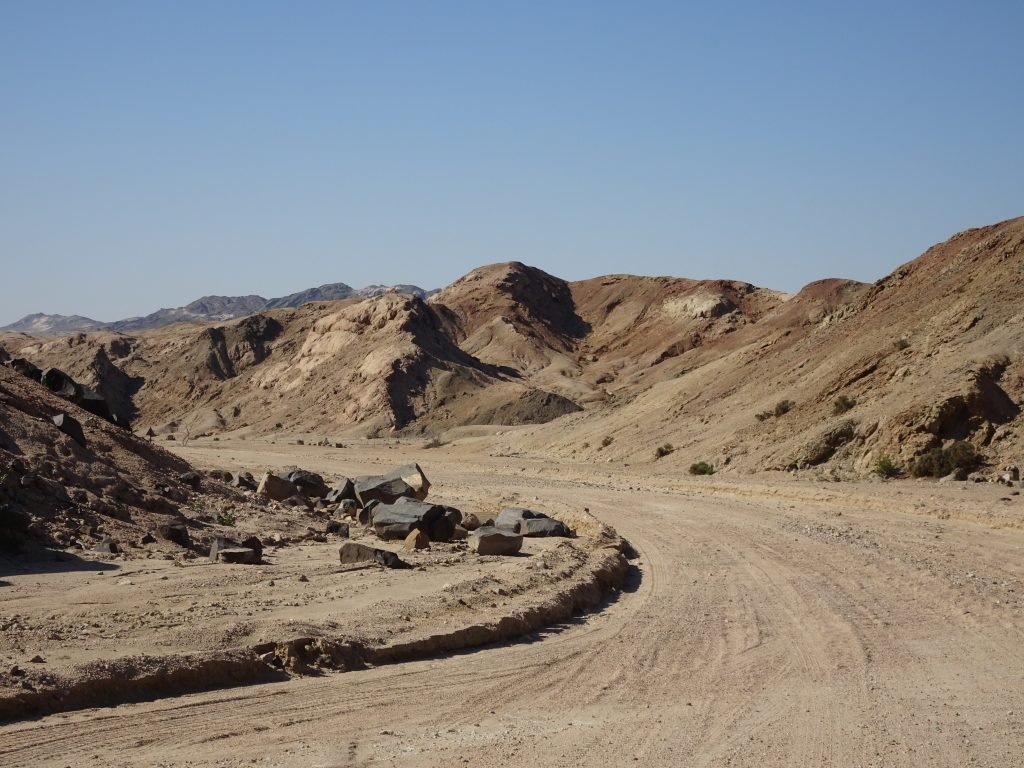
Beautiful Drive of Welwitschia Plains
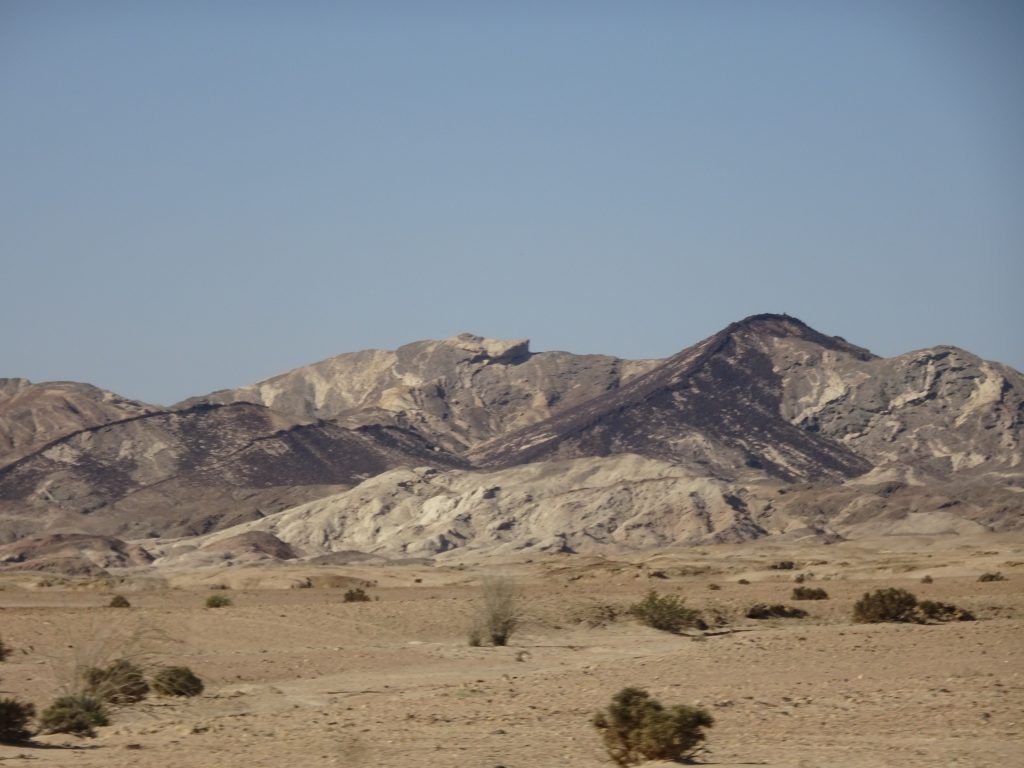
Dolerite Ridges
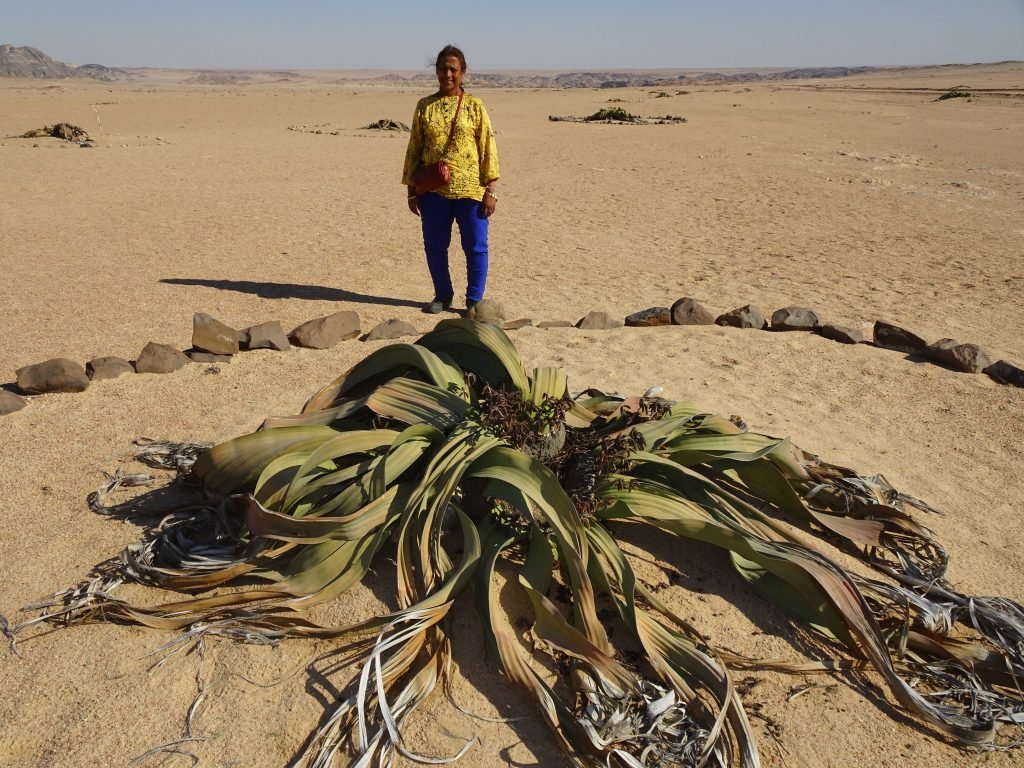
Rare Welwitschia Plants – Can’t leave Namibia without seeing it
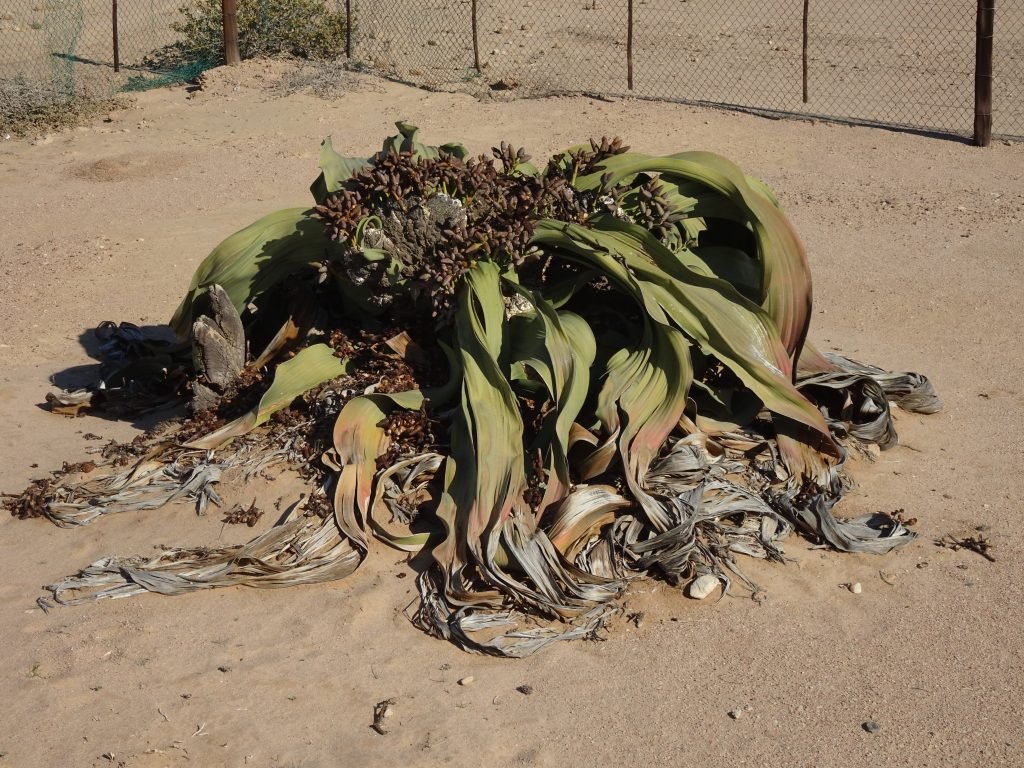
The 1500 years old Welwitschia Plant

Moon Landscape – One of our favourite viewpoints
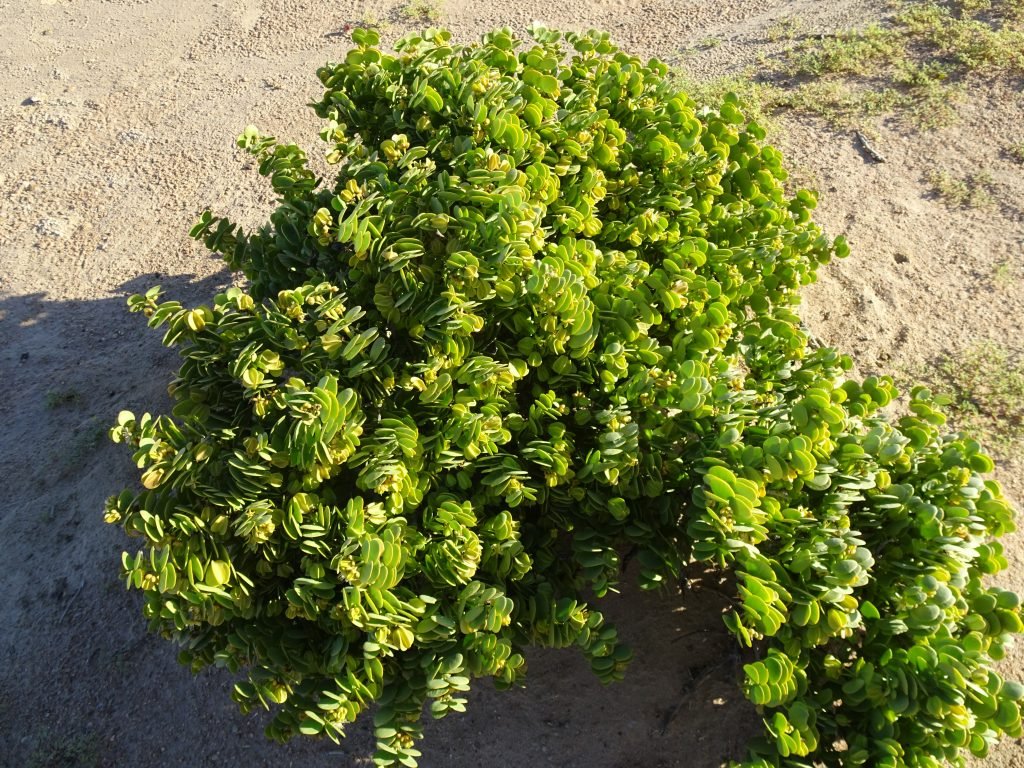
Dollar bush
Accommodation
We stayed at Aha Swakopmund Plaza Hotel. I chose a relatively cheap hotel here. After staying in lodges for some days, it was fantastic to stay in a city hotel with fast Wi-Fi.
Day 7 – Swakopmund – Day trip to Walvis Bay (30 Km, 30 min)
Today we drove to Walvis Bay and went for a Marine Dune Day Tour, which is a full-day boat plus dune tour.
The company which we used for the tour – Sandwich Harbour 4X4
Boat Tour
First, we went for a 3.5 hours long boat tour. It was a big group, but the boat was spacious and everyone got a seat on the deck. To start with, they served us hot coffee and chilled local alcohol. Within minutes, seals and pelicans came to visit the boat. They walked right in front of us while skipper fed them dead fish. We even got to pet them. It was a surreal experience which I wouldn’t miss for anything. In season, it is even possible to spot whales.
The middle part of the tour is basically going all the way to the lighthouse to see 60,000 resident Cape Fur Seals and an oil rig. It was foggy, so we didn’t get a good view of it. Then they served us a plate of veg salad and some desserts for lunch. It was good enough. For non-vegetarians, they had a huge spread; the highlight being fresh oysters. Service was nice and the crew was super friendly and kept everyone entertained.
After that, rode back to the shore where we again got to pet seals and pelicans. Tour ended at 12:30 pm.

Seal on the Boat

Feeding the Seals

Selfie with seal 🙂
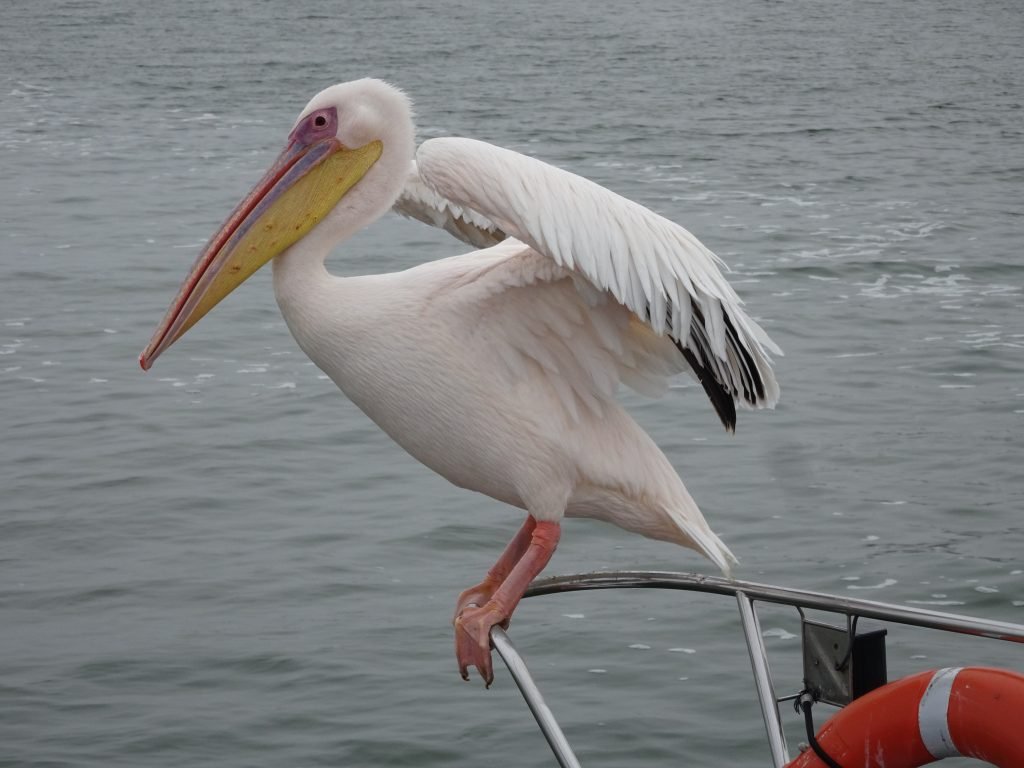
Pelican on the Boat
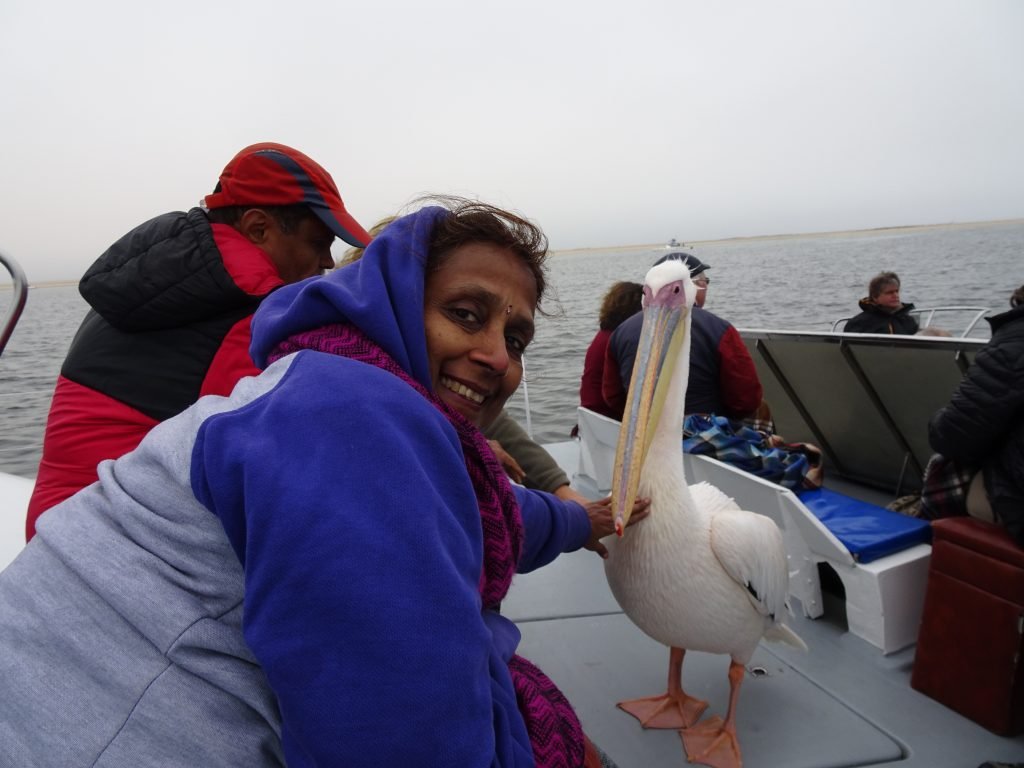
Selfie with Pelican
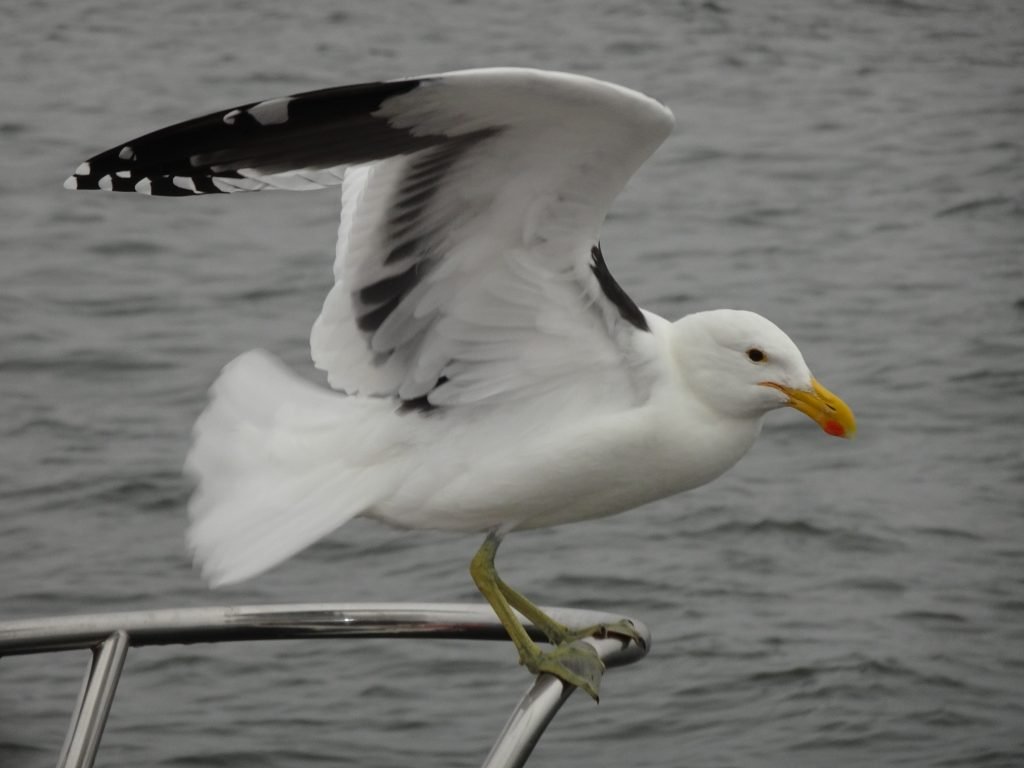
Seabird

Oil Rig

60,000 resident Cape Fur Seals
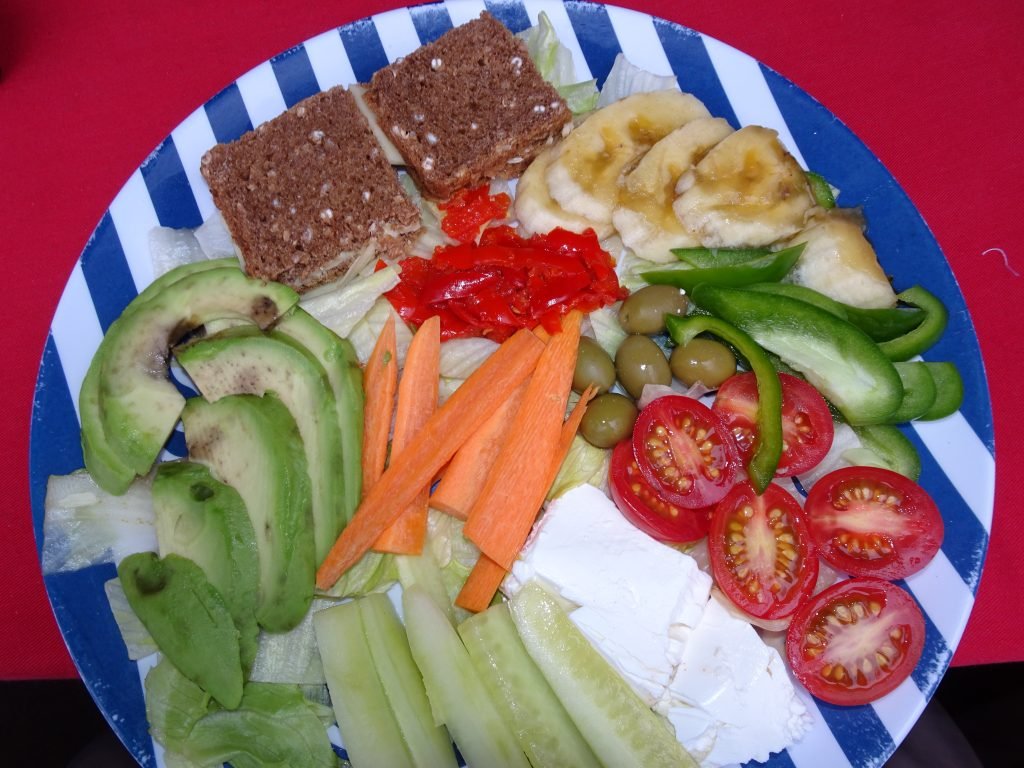
Veg Lunch
Dune Tour
After the boat tour, we hop on to the jeep for a 3.5 hours private tour of the Sandwich Harbour with a guide. First, we passed through the beautiful salt pans and stopped at Walvis Bay Lagoon to see masses of flamingos. We also saw tons of seabirds, seals lazing on the beach and springbok. Then we drove to the dune and the next few hours were spent driving in the dune. The view of the dunes all around was incredible. No words can describe it.
We stopped along the Sandwich Harbour for photos. Then drove to the top of the dune from where we saw a spectacular view of the harbour below. In the middle of the dunes, we stopped for a break and the guide set up a table with drinks and a snack platter. For vegetarians, they had an amazing variety of 5 to 6 different types of snacks and for non-vegetarians; again the highlight was fresh oysters. We munched on the snacks while watching jackal roaming around us. Afterwards, we drove back. On the way back, we spotted an ostrich.
This full-day tour of the boat plus dune tour was one of the highlights of our Namibia trip and was totally worth the cost. It was a unique experience and must do on a trip to Namibia.
We drove back to Swakopmund, had dinner and called it a day.
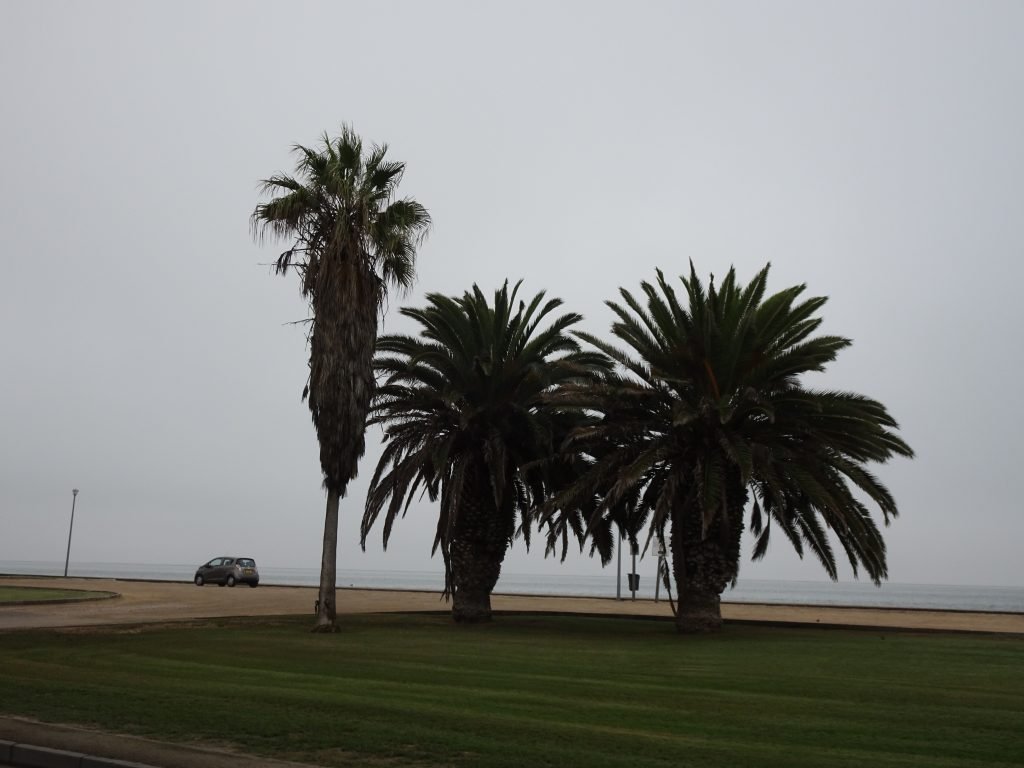
Walvis Bay

Flamingos
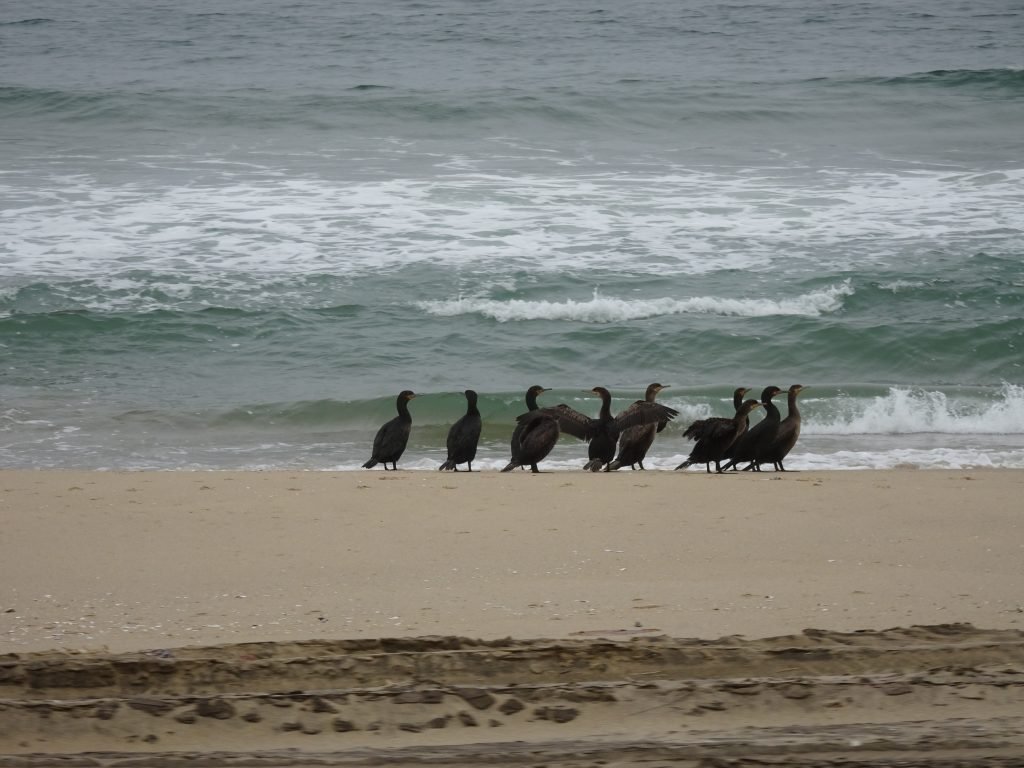
Birds along the coast
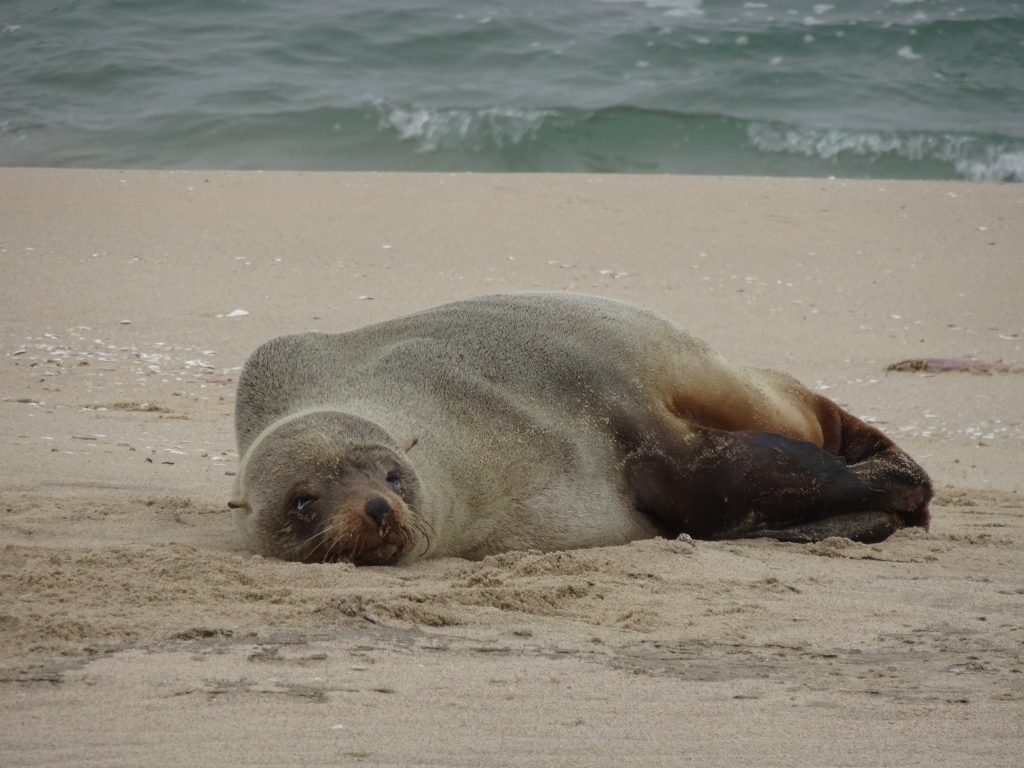
Seal chilling on the beach
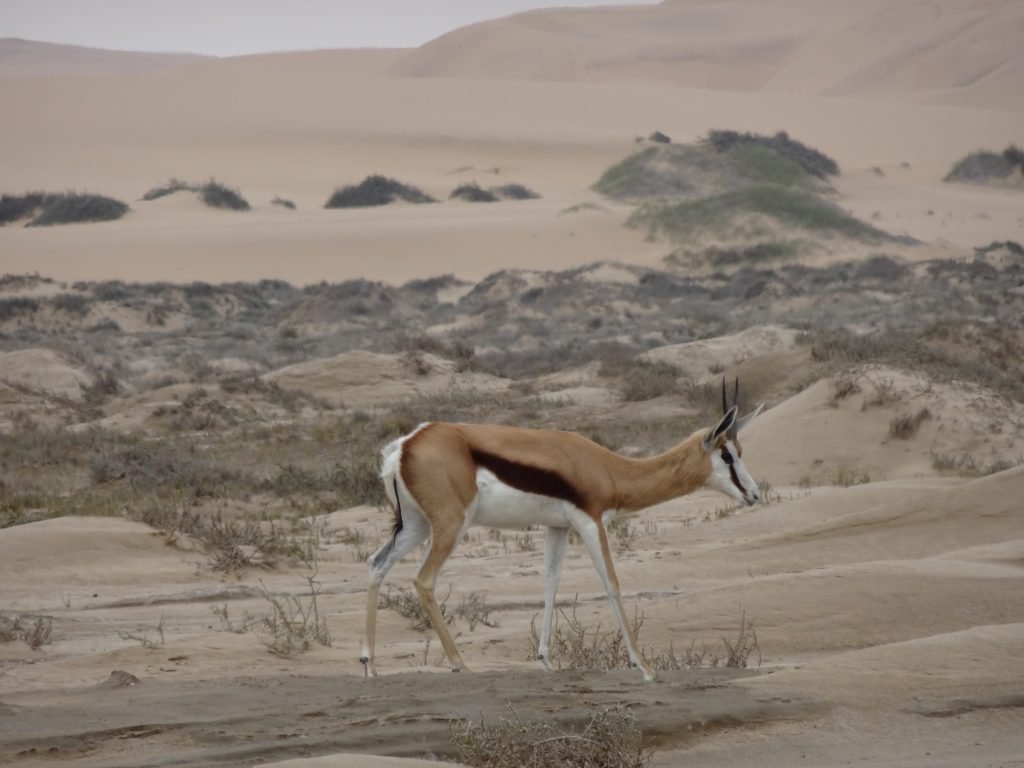
Springbok

Sandwich Harbour
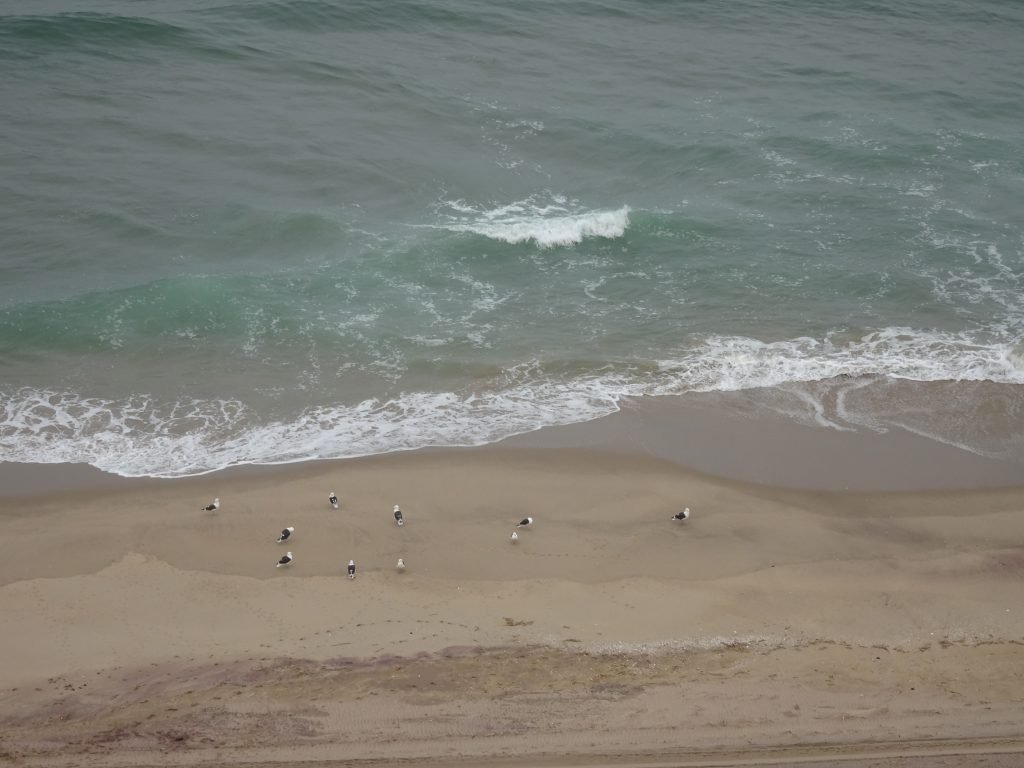
View from above

Our Jeep
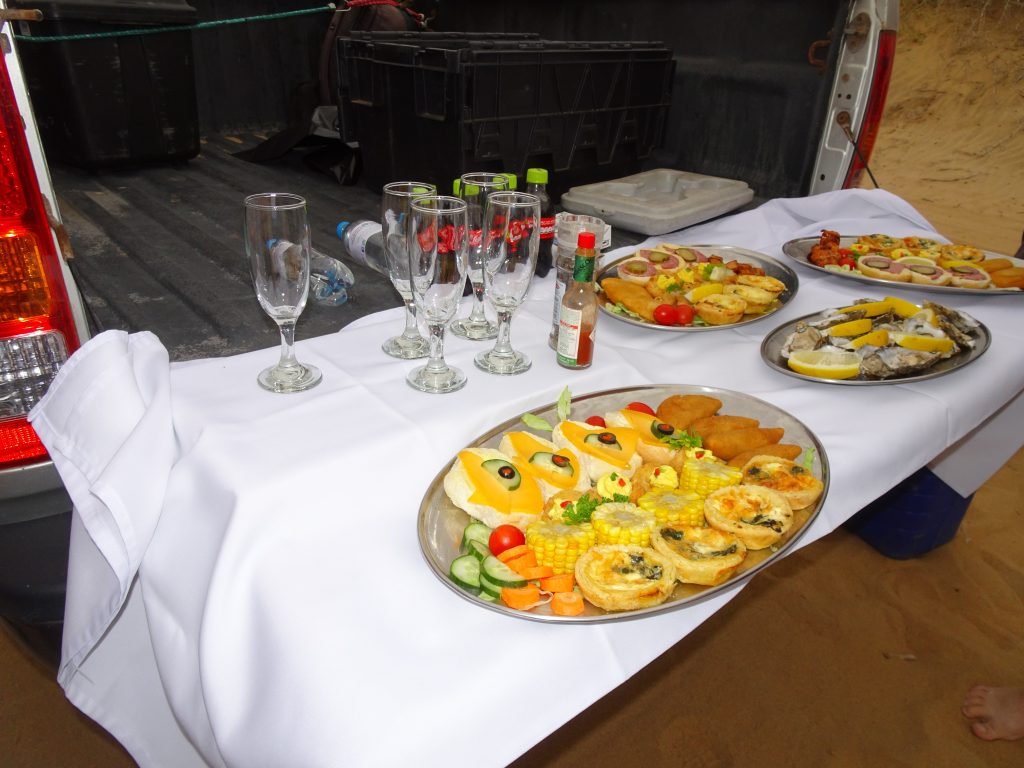
Delicious Snacks
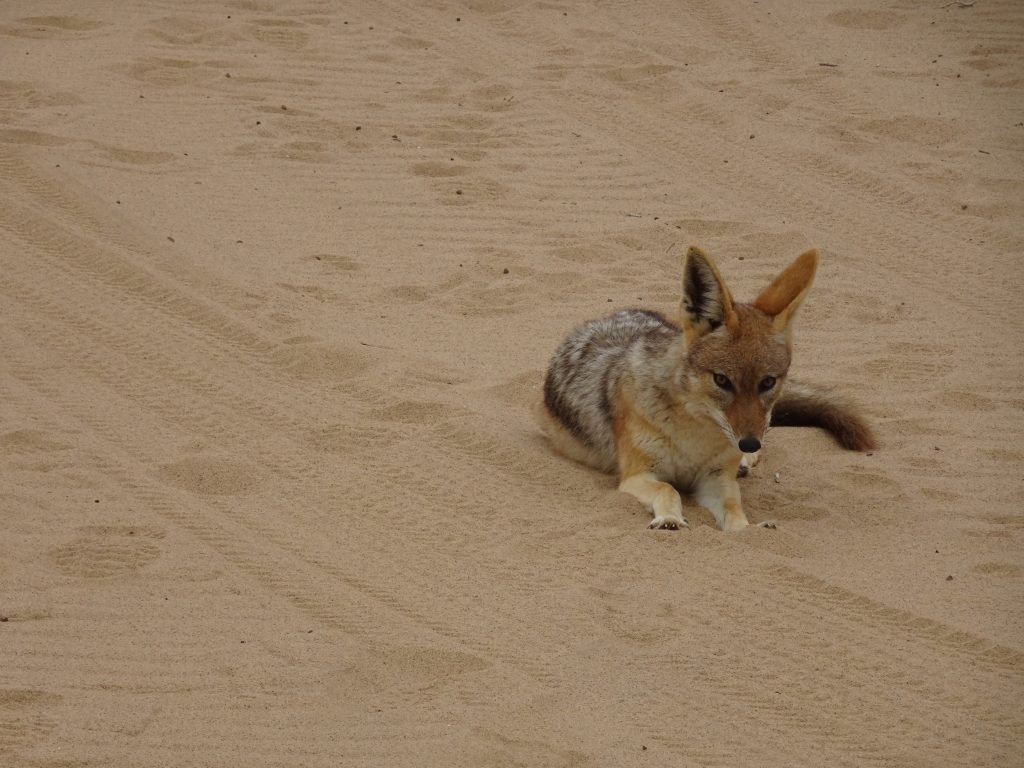
Jackal
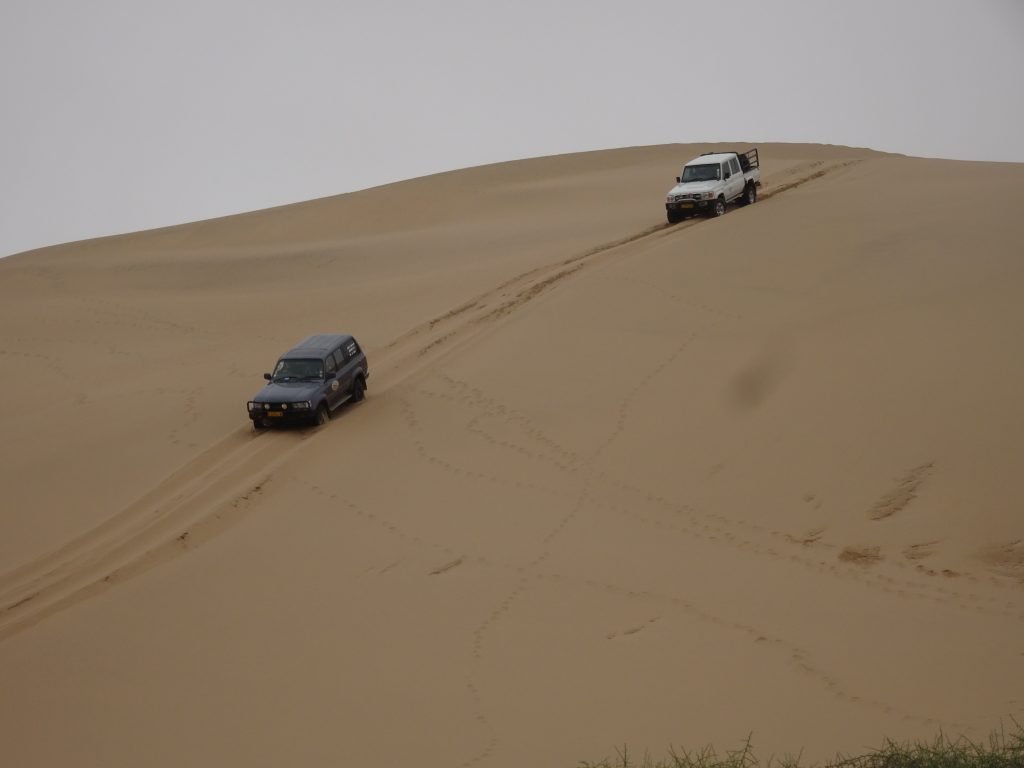
Dune Driving
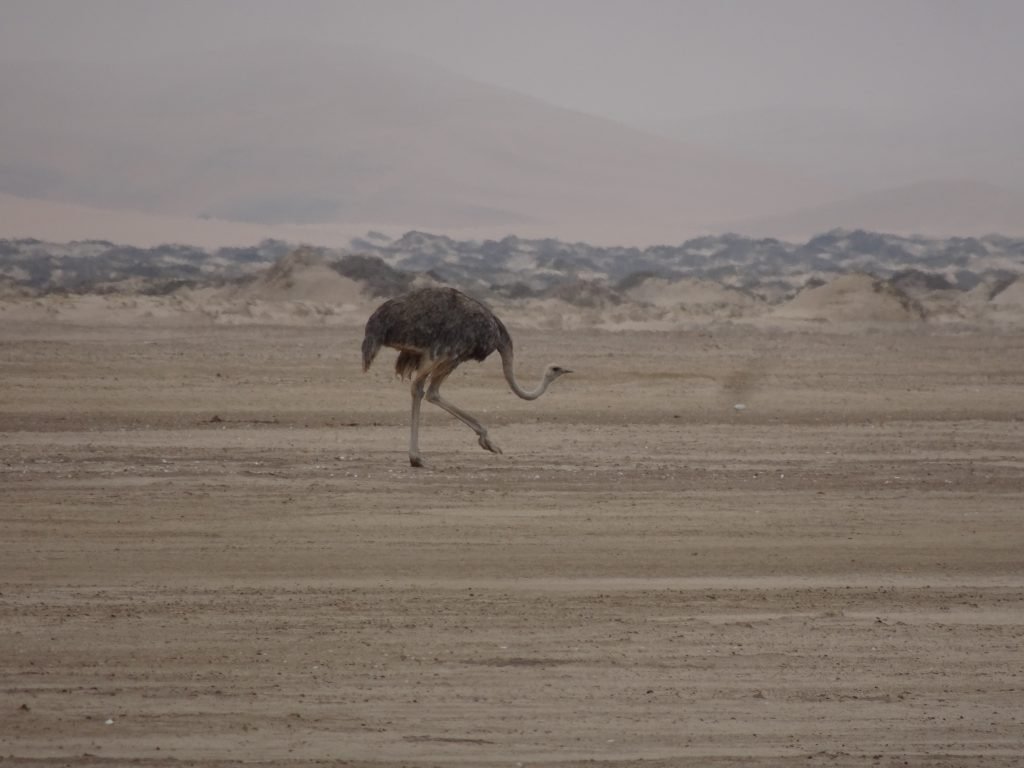
Ostrich
Accommodation
Day 8 – Drive to Spitzkoppe (158 Km, 2 hrs)
Spitzkoppe is famous for its unique rock formations. Initially, I had planned to drive there, see the rock, and move onto the next destination. But I found a newly opened Spitzkoppen Lodge, which looked wonderful in the pictures. So at the last minute, I added a night here in my 2 weeks in Namibia itinerary.
Route to Spitzkoppe
- Travel along the B2 highway passing Usakos.
- Continue for another 24 kilometres (14.9 miles).
- Then take the D1918 gravel road to Henties Bay.
- Drive for a further 18 kilometres (11.2 miles) until you see a turnoff to D3716, this is the road to Spitzkoppe.
We were there by 11 am. The lodge is surrounded by huge, 150 million years old granite boulders, which looked gorgeous. We spent the afternoon chilling in our room, admiring the views. Since it didn’t have an air-conditioner, the room got hot in the afternoon.
Evening Tour
- We booked an evening tour with the lodge to see various viewpoints.
- They took us to 3 viewpoints.
- First, they showed us bushman’s paintings on the wall. This site you aren’t allowed to enter without a guide. Our guide gave some information about various paintings and what they meant to the bushmen. It was a different experience.
- The second stop was a pond. Nothing special or worth mentioning.
- Finally, the main site – Spitzkoppe Arch. You can even self drive to see the arch. To see the arch, there is a 45 degree inclined climb. It’s a short climb, but one can find it tough at that angle.
- Tour was just about decent as the other 2 viewpoints we could have seen without a guide by driving our own car.
We returned to our lodge and saw an amazing Namibian sunset.
Accommodation
We stayed at Spitzkoppen Lodge, the only luxury lodge in the area.

Entrance to the Bushman’s Cave

Bushman’s Painting – Snake
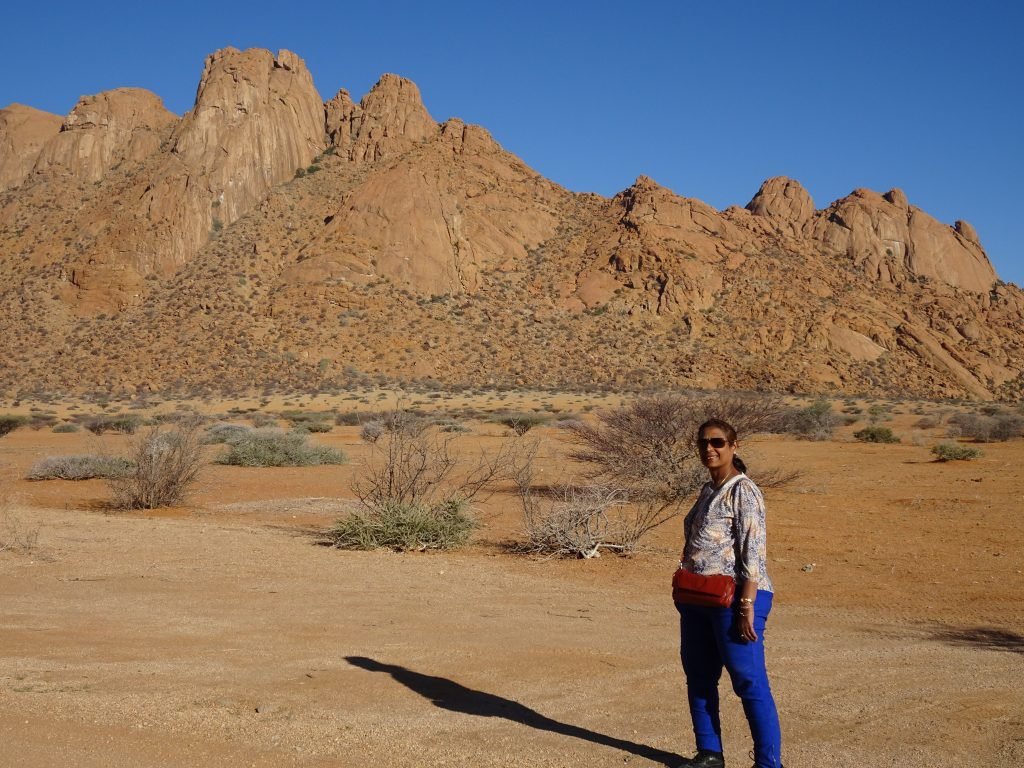
Incredible views all around!

Pond

Granite Peaks

Spitzkoppe Arch

Rock changes colour depending on the sunlight

Unique Rock Formation
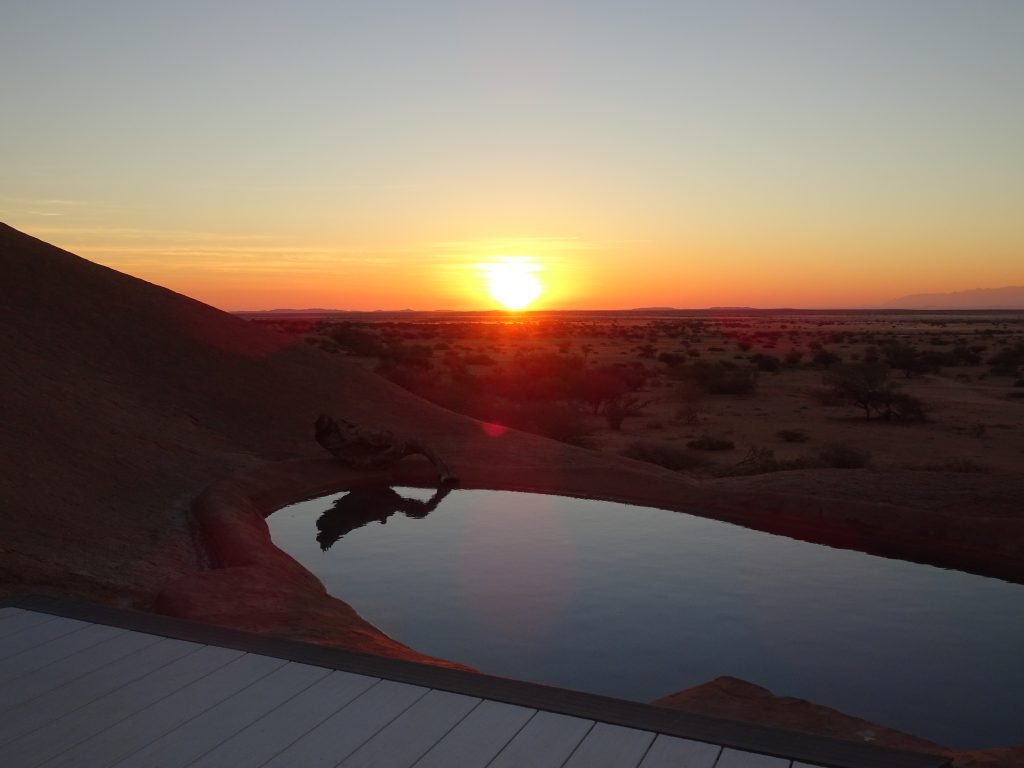
Sunset
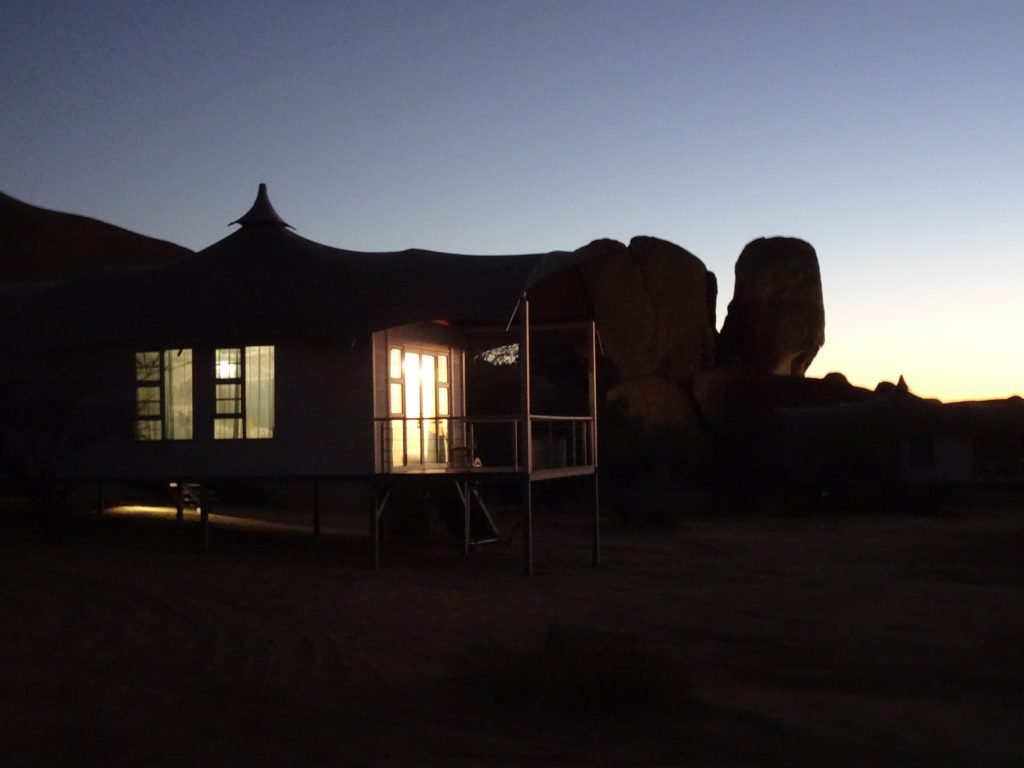
Night Scenes
Day 9 – Drive to Damaraland (226 Km, 3.5 hrs)
Instead of driving directly to our lodge, Mowani Mountain Camp in Damaraland, we took a long detour of 250 Km to drive via Cape Cross Seal.

Morning Scenes in Spitzkoppe
Zeila Shipwreck at Henties Bay
- Since we drove from Spitzkoppe to Mowani Mountain Camp via Cape Cross Seal, it was a detour of 30 km. If driving from Swakopmund to Mowani Mountain Camp, it is en-route.
- A quick photo stop.
- Zeila, the fishing trawler, got stranded on 25 August 2008. It was sold to an Indian company as scrap metal and got stranded after it came loose from its towing line while on its way to Bombay.

Zeila Shipwreck – no filters used
Cape Cross Seal reserve
- We actually did a 250 Km detour to see this spot. It was quite crazy but I couldn’t leave it.
- It is one of the largest colonies of Cape Fur Seals in the world.
- We spent quality time looking at seals all around us.
- We have seen seals many times in the past and even on this trip up close during the boat tour. But we haven’t seen a large number of seals colony so close. At times, they were sleeping on the walkway and we had to make way to pass through them.
- For me, it was totally worth the long detour. For others in my family, it was debatable.
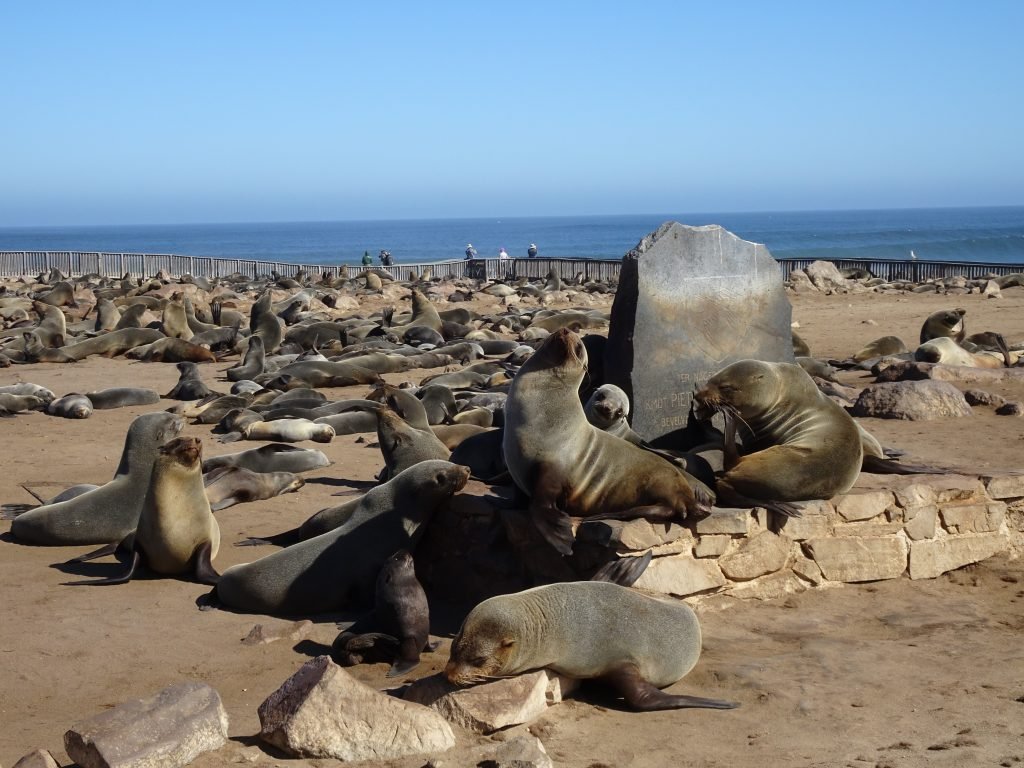
Cape Cross Seal

Cape Cross Seal Reserve in Skeleton Coast

Aren’t they cute?
Route
After Cape Cross, there are 2 routes which you can follow:
1) Continue back to Henties Bay and take an inland route on c35 via UIS
- Uis – Can stop to see semi-precious stone pass.
- There are some restaurants in Uis for lunch.
- Pass by Brandberg, the highest mountain in Namibia.
2) Continue until Torra Bay and then take the inland route C39 to Mowani
- It’s a 60 km detour.
- It is a coastal scenic route but have bad roads.
Instead of turning back, we decided to continue until Torra Bay, so we could see more of the Skeleton Coast. Halfway through, there was a board stating that the road has been washed off. So we had to turn back and drive via Henties Bay. We wasted good 2 hours of time in it and we reached our lodge just before sunset around 6 pm.

Not a single car along Skeleton Coast!
Accommodation
In this area, I found quite a few properties having remarkable views. I went back and forth and finally chose the Mowani Mountain Camp. It looked unique in pictures. I couldn’t get availability for Superior View rooms, therefore booked Standard View rooms.
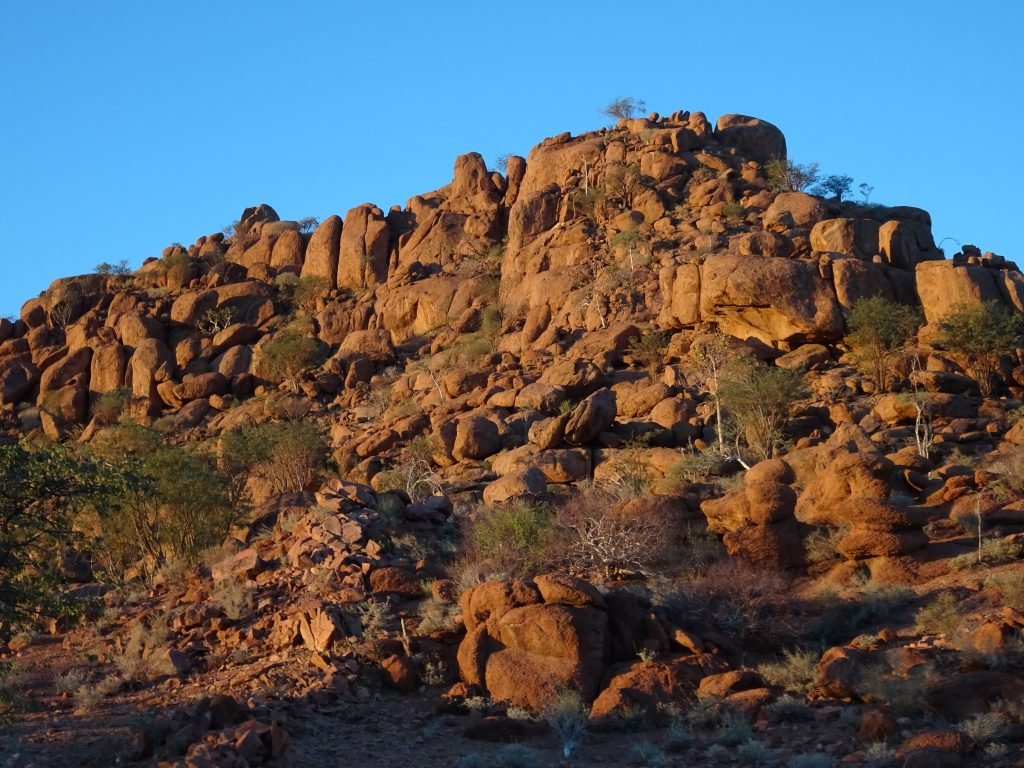
Views around the Mowani Mountain Camp
Day 10 – Damaraland
Desert Elephant Safari
Damaraland is famous for its desert elephants. We woke up at the crack of dawn and went for a 6-hour safari with a guide. I don’t think it’s possible to do a self-drive as roads are terrible and finding elephants is quite a task. Initially, we were in 2 minds as this tour was very costly and 6 hours seemed too long. Since we were staying 2 nights here, we bite the bullet and went for it. I must say, their jeep was very comfortable as it was a proper safari vehicle. Most other lodges would use convertible trucks that had small seats with a tiny amount of leg space.
Our guide searched and searched for elephants. After an hour, he found a herd of 14 desert elephants. We spent 2 hours admiring them. We aren’t crazy behind elephants but seeing them walk in front of us was good fun. Also, we saw elephants eating from the trees. Time went by quickly. Once we had enough of elephants, he drove us back to the lodge. We had requested them to keep sandwiches packed for us as we didn’t have breakfast. But they prepared fresh delicious sandwiches for us, which we gulped in no time.

Beautiful Landscape
After this one photo, my memory card malfunctioned and sadly I lost all the photos for this day. Below is a short video for our Desert Elephant Safari.
It was around 2 pm and we headed back in our car in the blazing heat to see the sights around. In hindsight, we should have rested and gone in the evening to avoid the heat.
Damara Living Museum
- They give a guided tour about how local Damara people would live.
- It is called a museum because people performing here live a normal modern life now. They just act how they used to live.
- We saw demonstrations like Fire making, showed a pharmacy, played a strategy game with stones, showed us how they would use animal skins, and the finale, of course, was a dance performance.
- Cost – 80 NAD pp – cash only
- Time – 8:30 am to 5 pm
- We enjoyed the tour, but it would have been better if we had visited early in the evening and avoided the afternoon heat.
Burnt Mountain
- It’s a quick photo stop.
Organ Pipes Rock Formations
- It is just a few meters from the car park.
- A quick photo stop.
Again, all my pictures of the above 3 sites disappeared due to my memory card malfunctioned. I wished I could go again the next day just to click pictures, but it was a detour and had entrance fees too.
Twyfelfontein Rock Engravings
- There are ten or more bushman paintings scraped into the rock.
- This is one of the most popular sites of Damaraland. But we skipped it as we had seen bushman’s painting in Spitzkoppe.
- Visit in the morning or afternoon to avoid the heat.
- Hire a guide to see the paintings.
Accommodation
Mowani Mountain Camp
Day 11 – Drive to Etosha National Park (340 Km, 4 hrs)
We drove to Etosha National Park and reached there by 12:30 pm.
Enter via Anderson Gate
- Time – 7:30 am to 6:30 pm (Check timings, it changes with season)
- Purchase a map showing all the waterholes. This is essential in doing a self-drive safari in the Etosha National Park.
- On arrival at the gate, there is a staff who makes entry for the vehicle and will give you an invoice. You do not pay at the gate, but at the first camp at the time of check-in.
Tips
- In Etosha National Park, you go from one waterhole to another. Waterholes are the best place to spot animals.
- Within the park, the speed limit is 60 km/h, but you should budget on an average of 35 – 40 km/h, so you have time to stop for sightings.
- At Okaukuejo Camp, the reception has a book where you can share down your sightings – EXCEPT THE RHINO. Poaching is apparently on the rise, and this is to safeguard the remaining rhinos. Please remember this if you fill-up the book.
- Usually, it is best to get out as soon as the gate opens, come back at around noon when it gets hot and head out again at around 3:30 pm and return at sunset.
- Do turn off your engine while waiting at a waterhole.
- There are no ATMs in Etosha so take sufficient cash with you.
- Keep a note of gate opening and closing time and make sure to be at the camp before the closing time. They are very strict about it.
Waterholes in the area
- Ombika
- Gemsbok Vlakte
- Olifantsbad
- Nebrownii
- Okondeka
- Okaukuejo waterhole
How did we Spot a Lion
When we reached the park gate, it was unmanned; I believe all of them were partying over lunch. So we just drove to the camp which is 17 Km away from the gate. On reaching the camp, we did the check-in formalities, got our keys, and then she said to pay the park fees. She asked for the Invoice which we were supposed to receive at the gate. As we didn’t have it, she sent us back to the gate. We pleaded that please give the invoice here. She said it isn’t possible, it’s a procedure. We wanted to rest and go for an evening safari. Having no choice, drove back to the gate and got the formalities done. The guard was shocked as to how we managed to drive past them but we repeatably said that no one was present there.
We were frustrated on wasting so much time and was driving at the speed limit if not more, back to the camp. Then suddenly Kapil, the driver shouts Lion Lion Lion! I barely could believe him. He stopped and backed the car. Indeed, there was a lion – standing right by the road. No other cars were there and all were driving past the lion. I thought is lion so common here that they don’t care? Within a few minutes, the lion sat on the grass; the view wasn’t as clear but still a very good view. We admired for quite some time and then moved on. I still can’t believe how Kapil spotted this lion driving at high speed in a bad mood.
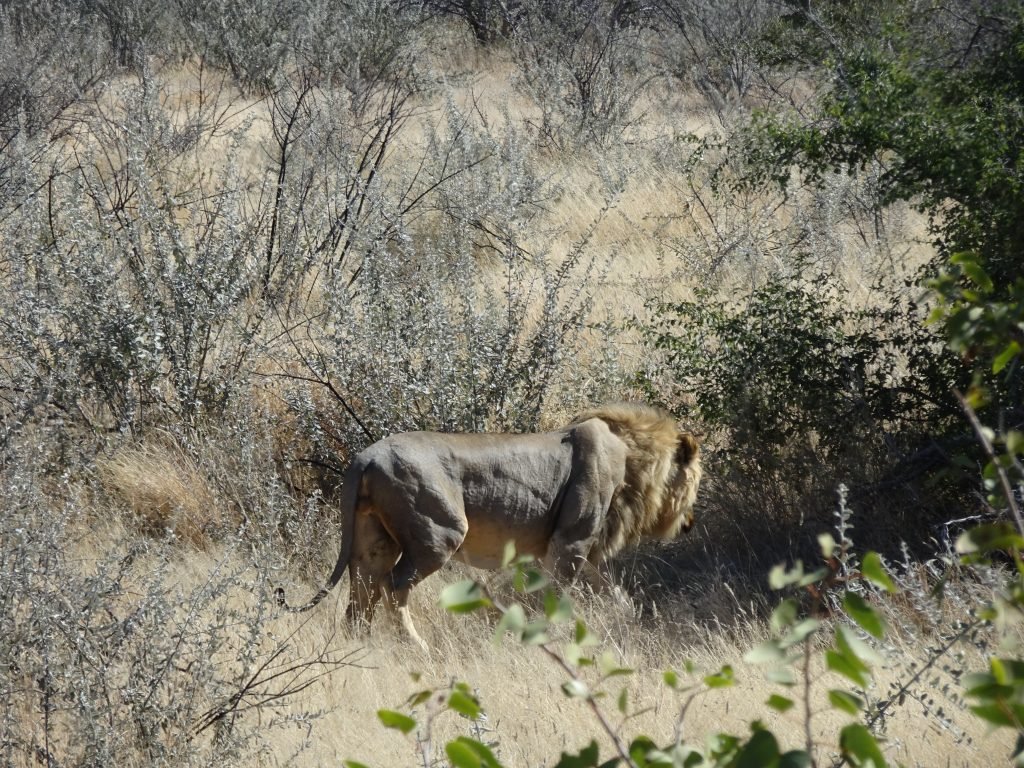
Lion right by the road
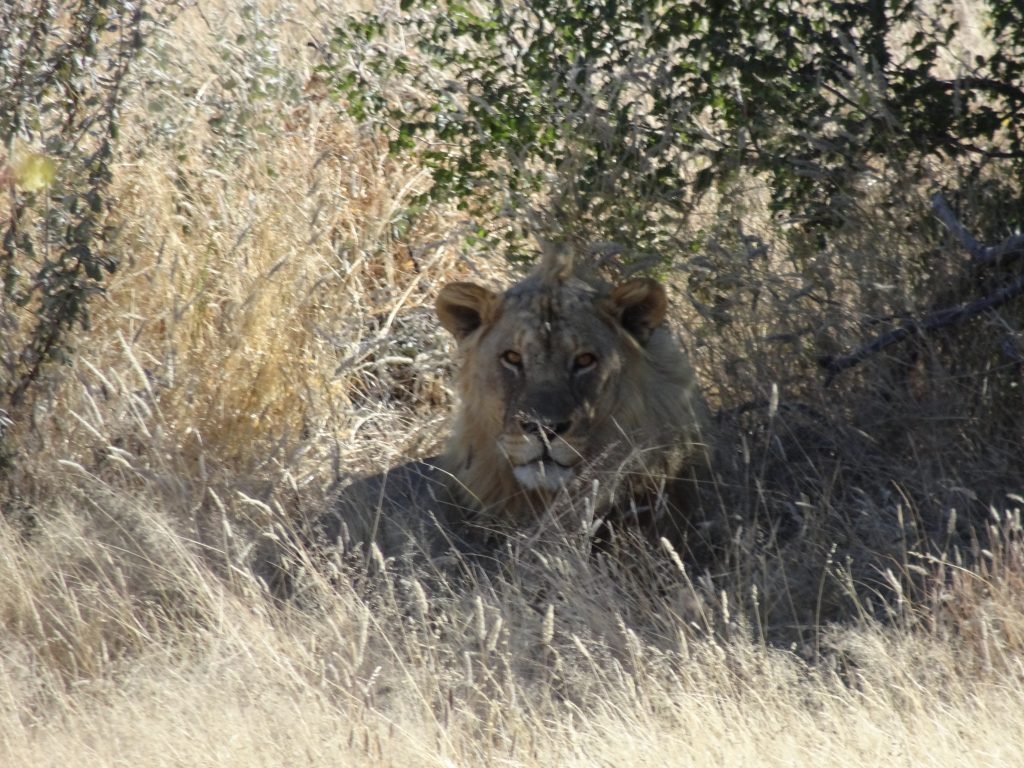
Lion in Etosha National Park
Afternoon Safari
After spotting the lion, we didn’t drive back to the lodge and continued with the safari till evening. We saw the usual impalas, springboks, zebras, giraffes, oryx, wildebeests, elephants and ground squirrel.
Accommodation
We stayed at Okaukuejo Rest Camp inside the Etosha National Park. There are only a few camps inside the park. I wanted to stay at Okaukuejo Rest Camp because it is the only camp where you can sit in the comfort of your room and watch animals at the waterhole. They have only 5 rooms overlooking the waterhole and it is very tough to get a booking. I contacted them a few months in advance and asked for any date in May or June. They had only 2 dates available, one in May and one in June. I booked for June and planned the rest of the trip accordingly. It was a unique experience to watch animals 24/7.
They have other rooms which are easy to get, but it doesn’t overlook the waterhole. You can drive to the waterhole and sit around it as long as you like. But it gets freezing in the night and you can’t peek through looking for animals from your bed in the middle of the night.
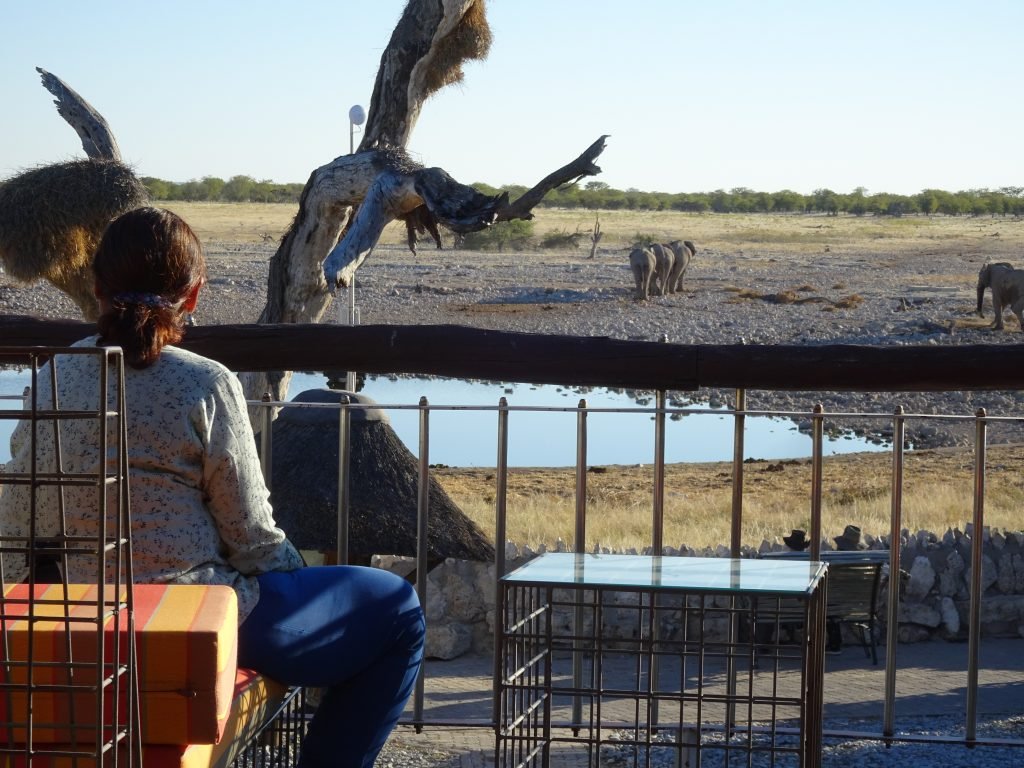
Watching animals from our room’s balcony
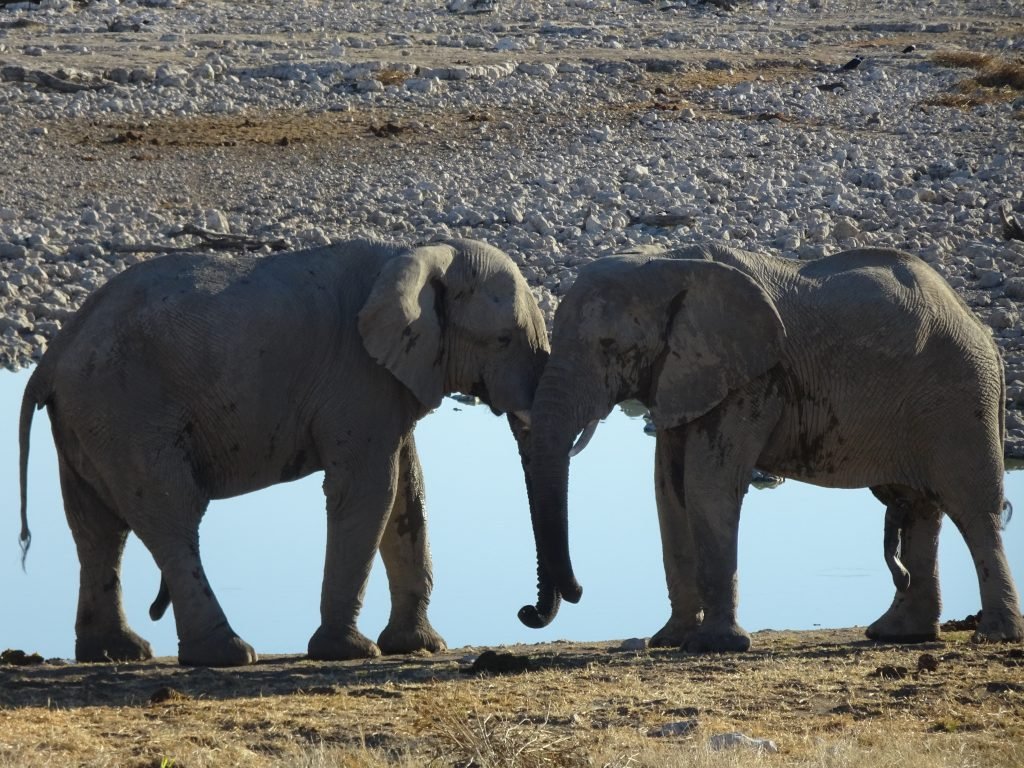
We saw elephants from our room 🙂
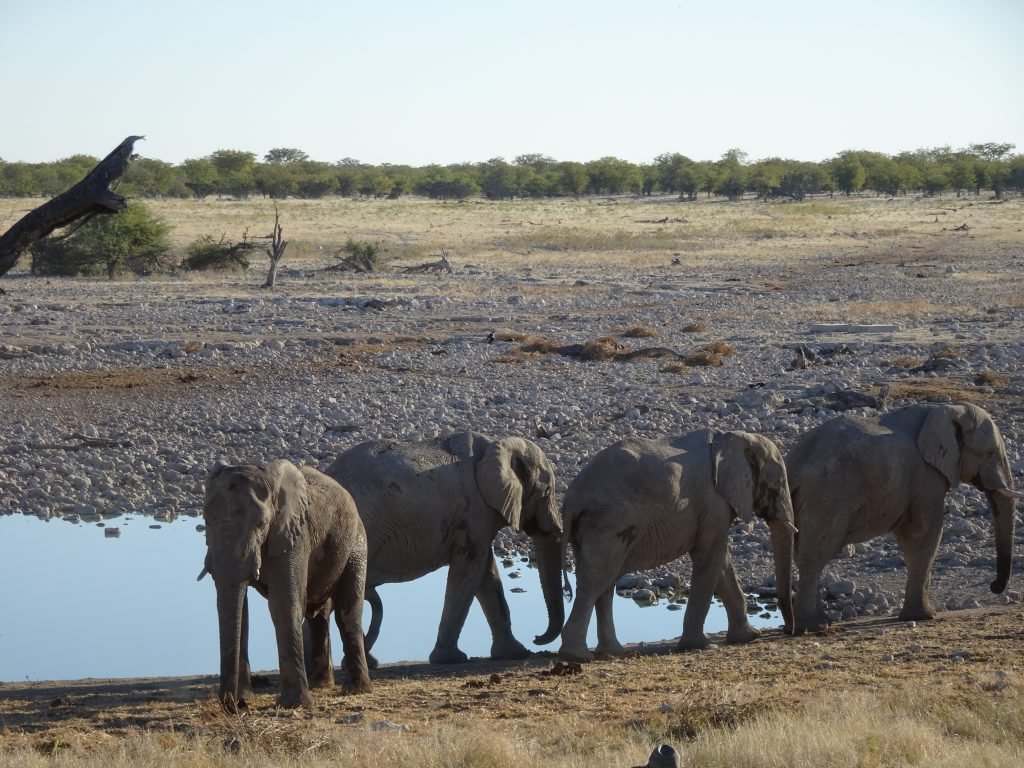
Drank water and disappeared

Giraffes came to drink water at the Okaukuejo Waterhole

Springbok drinking water
Nighttime viewing at the Okaukuejo Waterhole
Okaukuejo Rest Camp is special for its waterhole. Since we were staying at the Waterhole Chalet, we watched animals till the wee hours from the comfort of our room’s balcony. All night, there was activity at the waterhole. Some or the other animal showed up to drink water. We were amazed all night and it exceeded far beyond our expectations. This experience made totally worth all the trouble I took to get booking for the Waterhole Chalets.
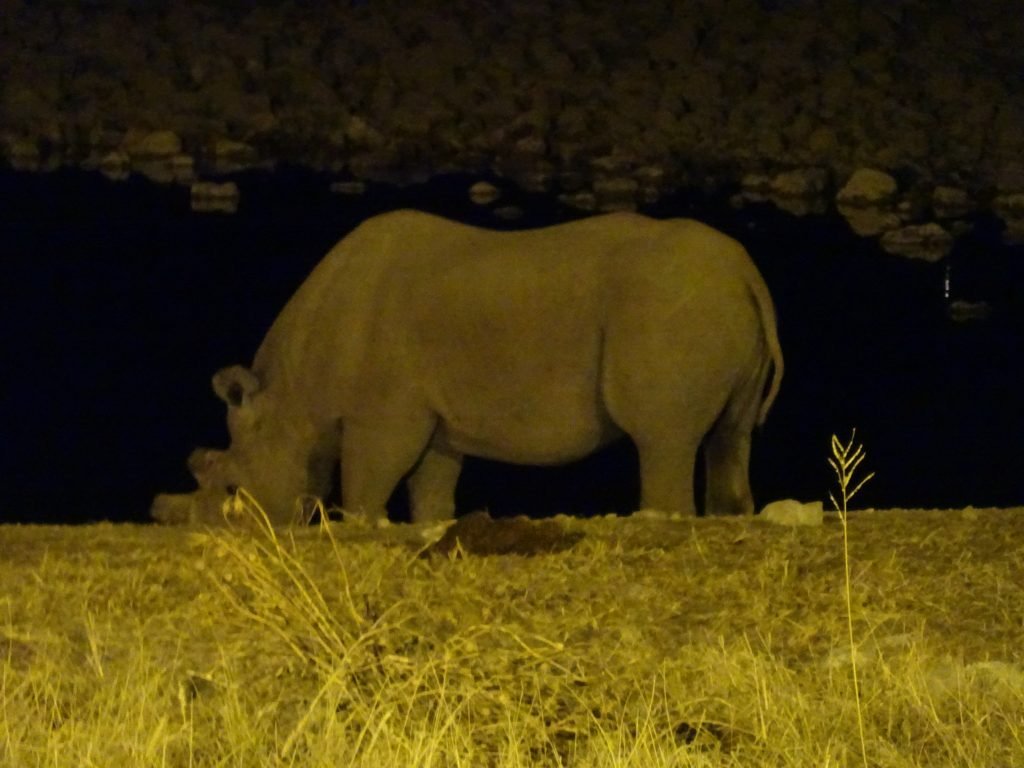
Rhino right outside our room!
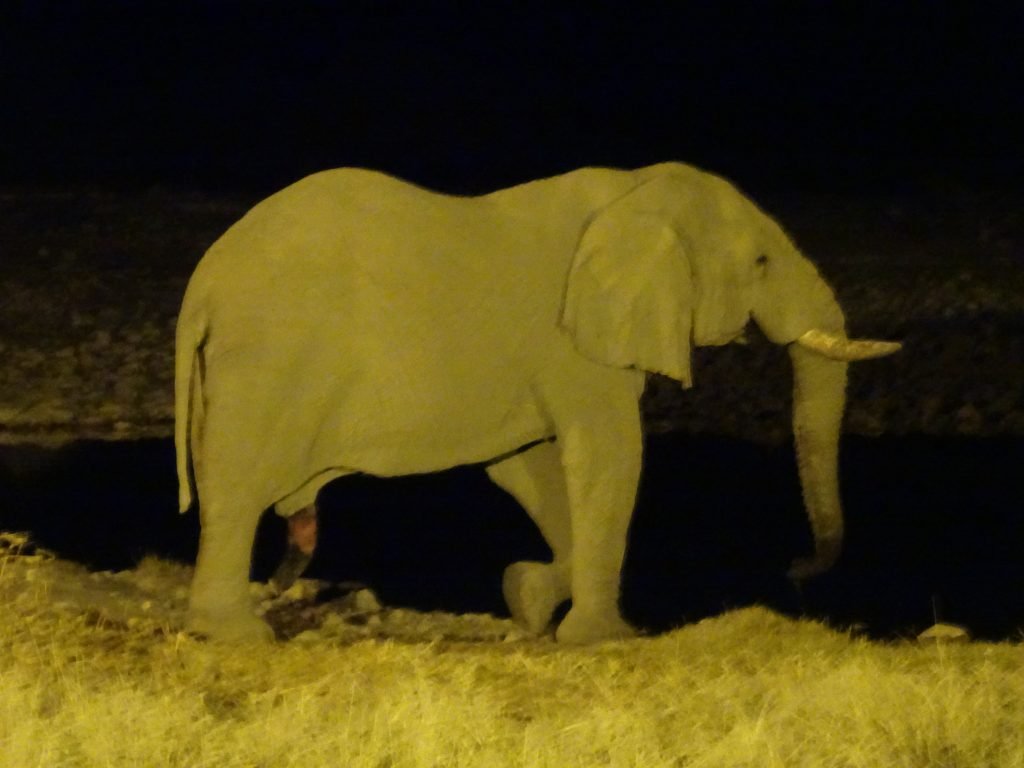
Elephant drinking water in the middle of the night
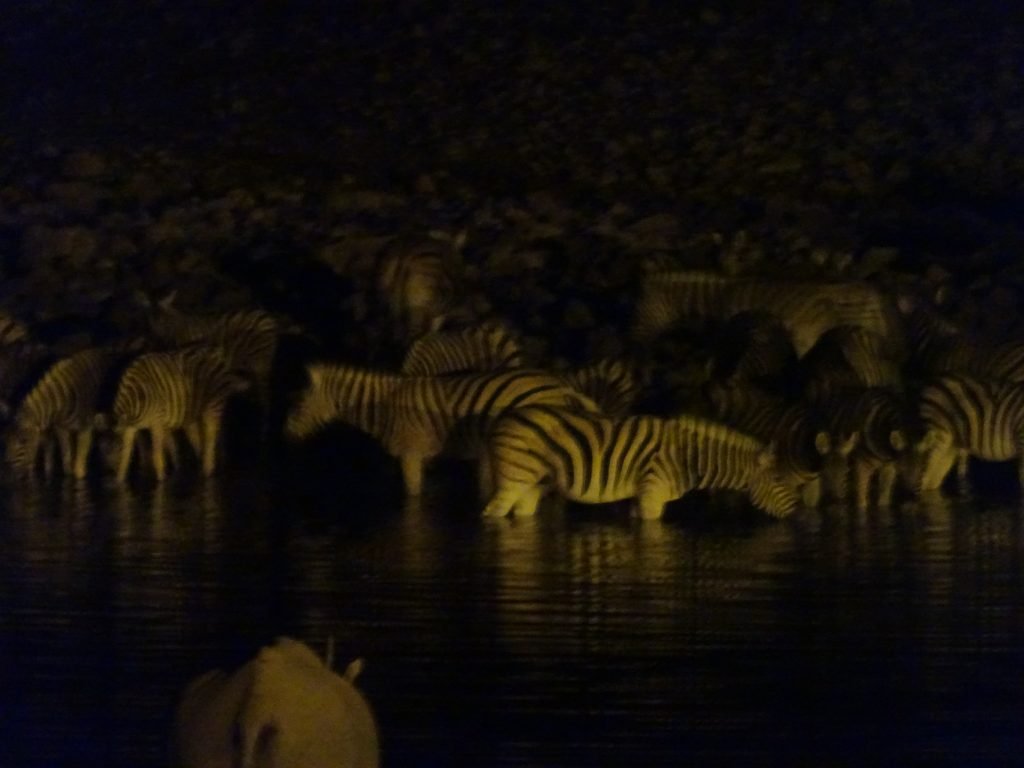
Tons of Zebras showed up
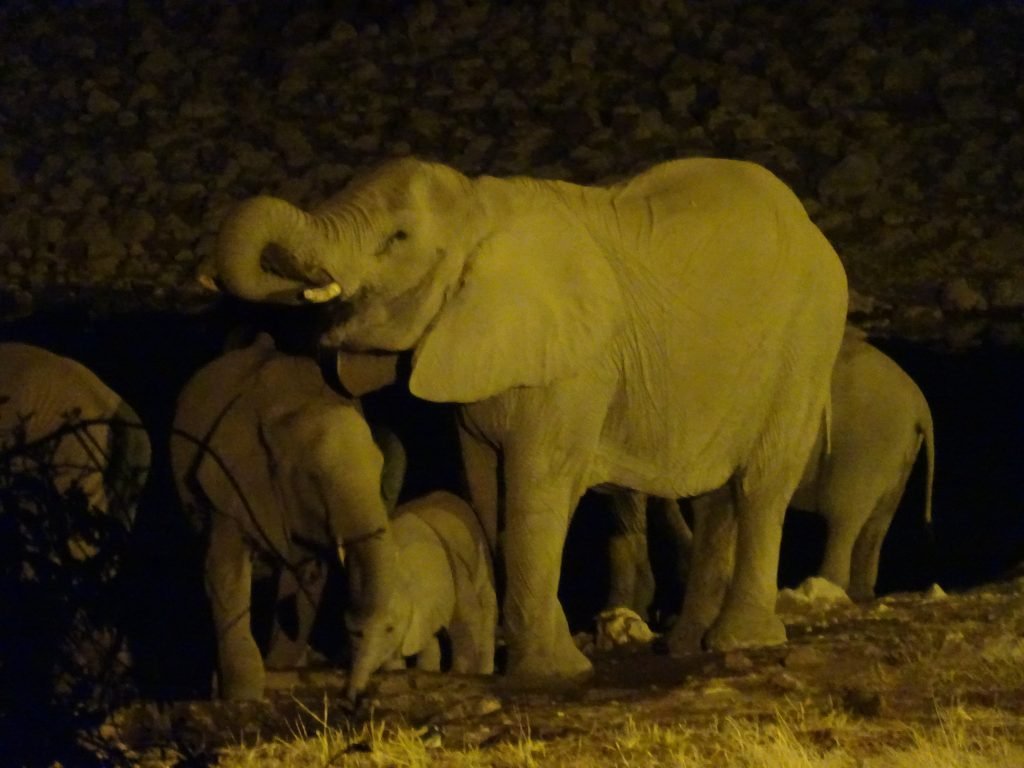
A herd of Elephants
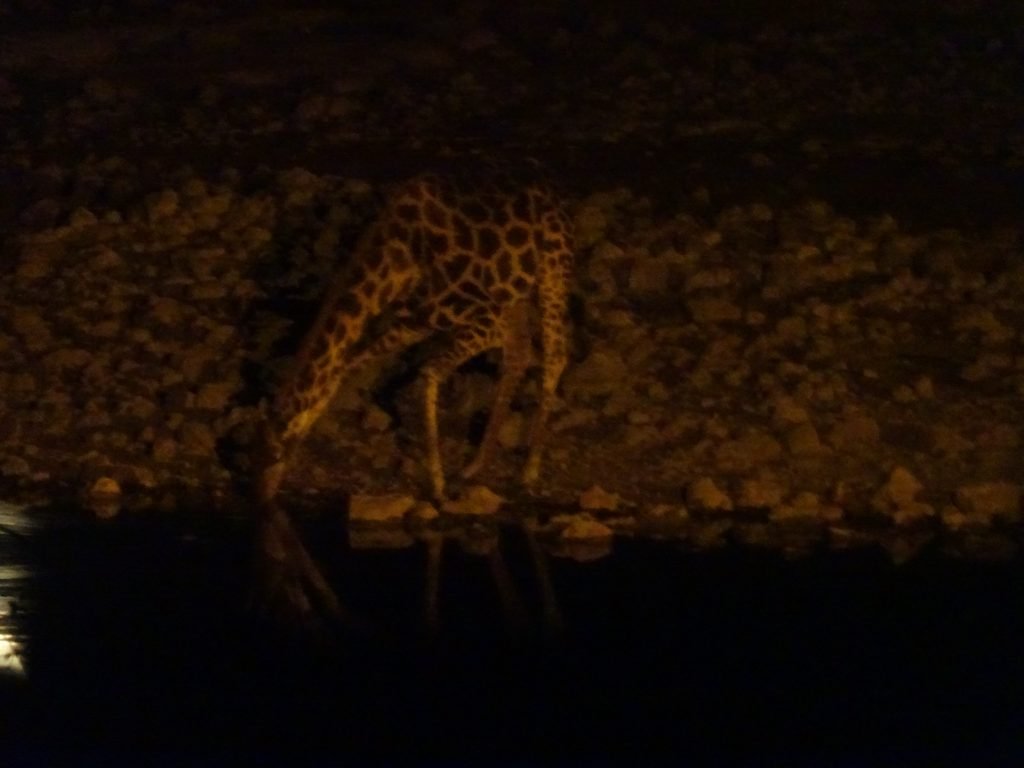
Giraffe drinking water

Elephants fighting at the Okaukuejo Waterhole
Day 12 – Etosha National Park
Today we spent all day driving searching for animals in the Etosha National Park.
Morning Safari
For our morning safari, we drove to Okondeka which is a natural waterhole. It is the only one near our camp that has water during winter. This therefore becomes a magnet for all animals. We saw tons of zebras here. Unfortunately, we didn’t spot any wildcats. We also saw springbok, ostrich in wild, oryx, and kudus. We saw so many zebras that we called it a Zebra Country. At around 12 pm it got hot, animals spotting became difficult and thus we returned to our camp.
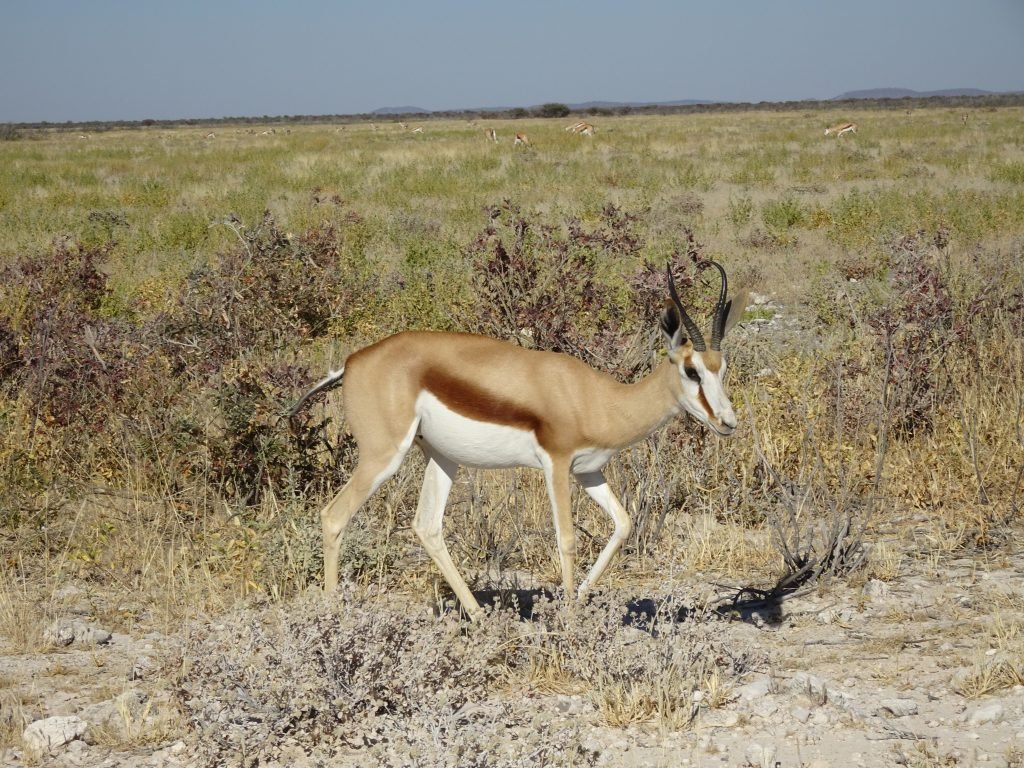
Springbok
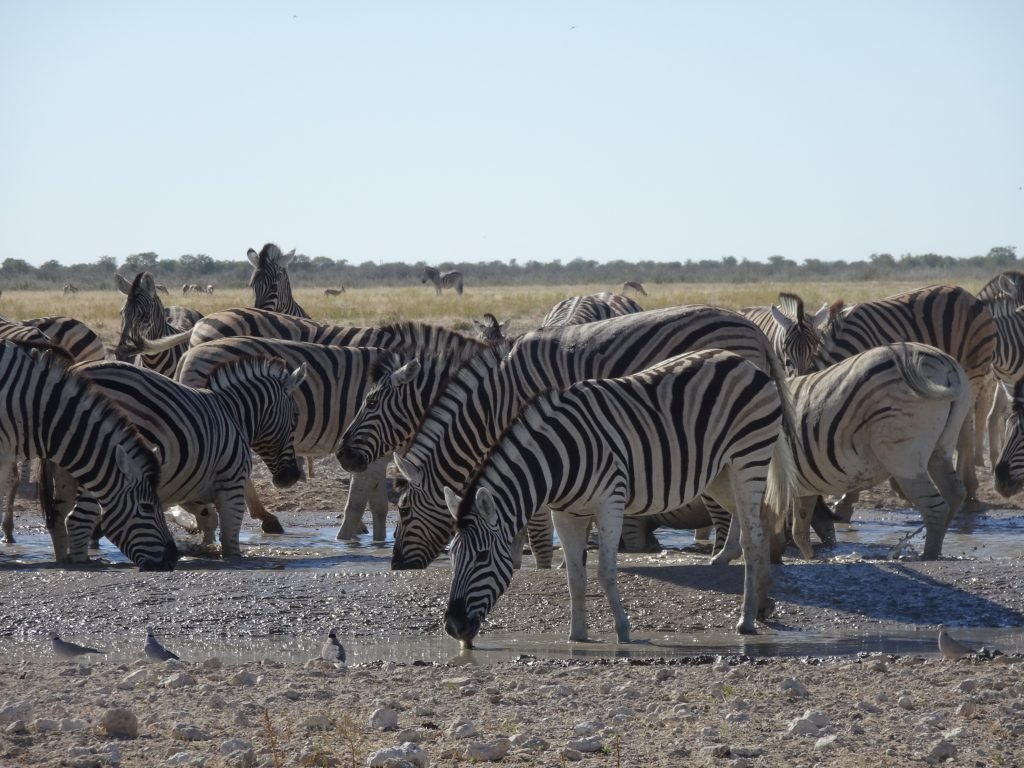
Zebras at Okondeka
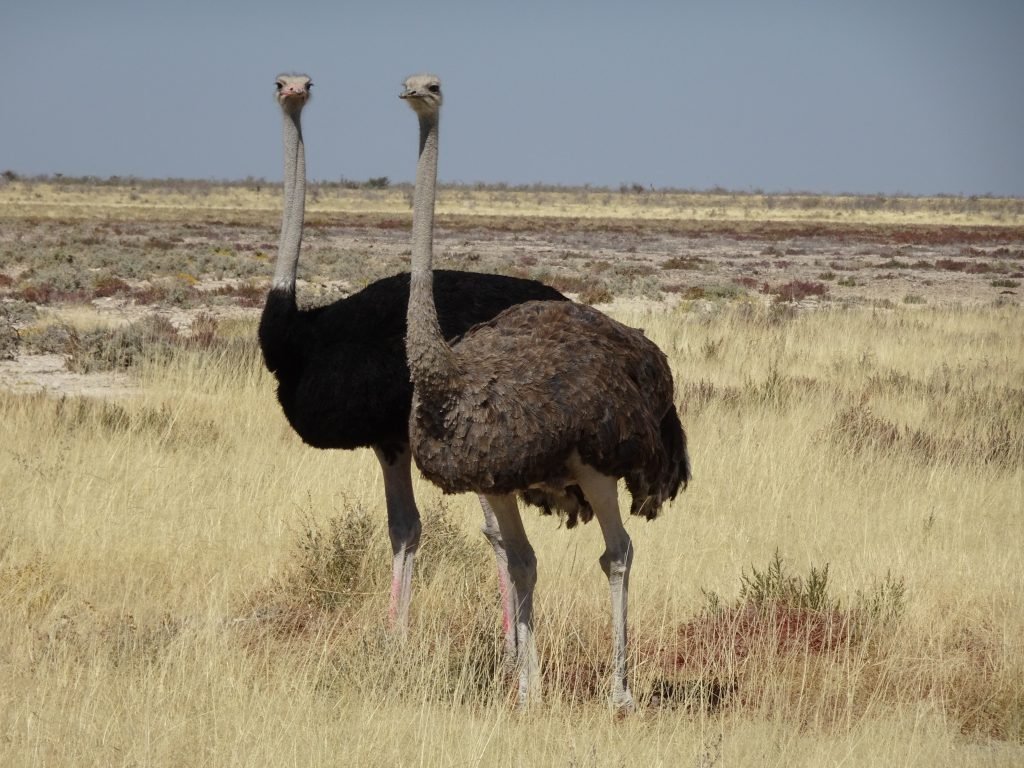
Male and Female Ostrich
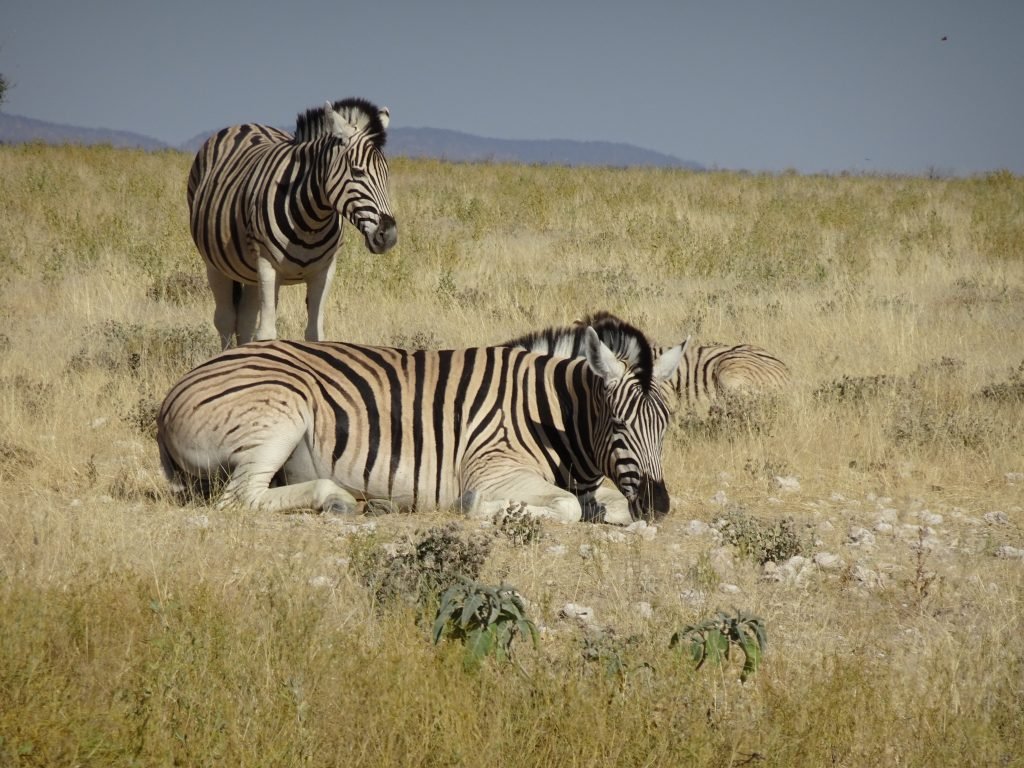
Zebras chilling at the waterhole
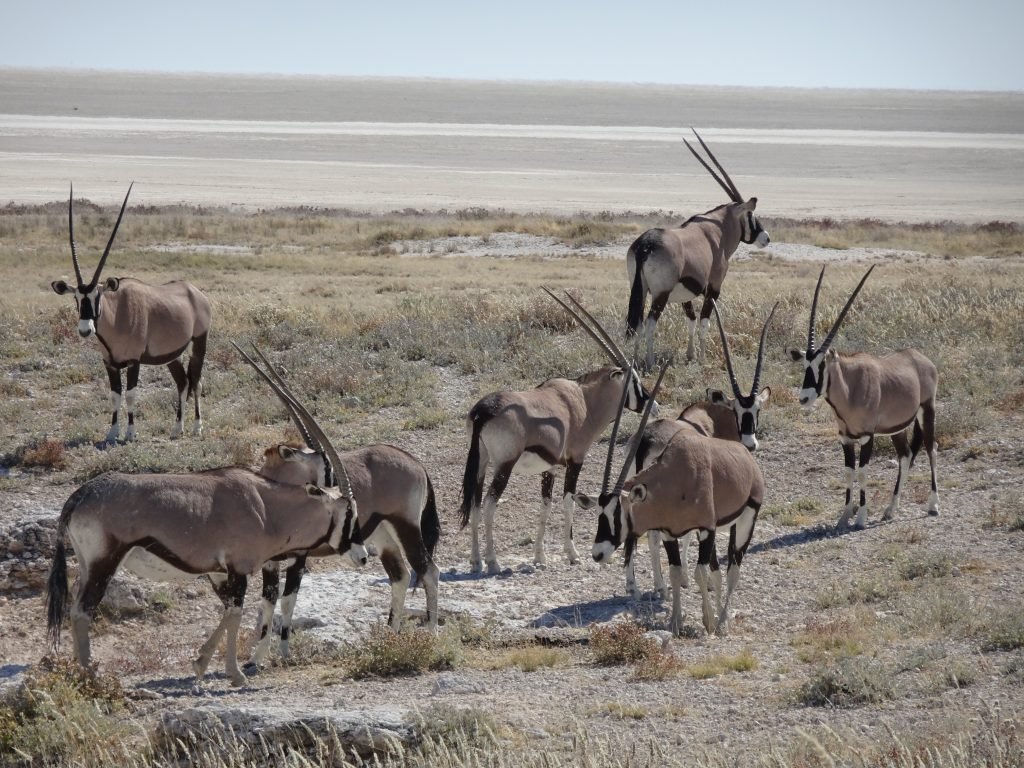
Oryx everywhere!

Guinea Fowl
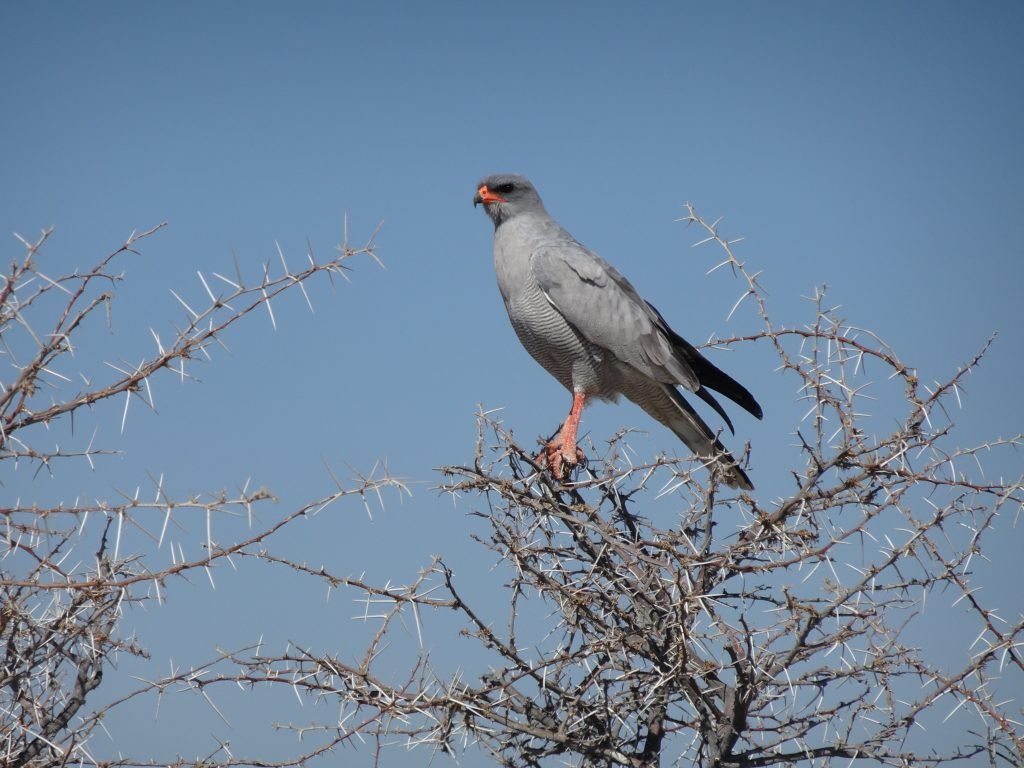
Spotted a bird – Pale Chanting Goshawk
Afternoon at the Okaukuejo Camp
We spent the afternoon in our room’s balcony watching tons of animals. We saw a group of zebras drinking water. Also, springbock, oryx and elephants came to drink water. We saw so many animals by just sitting in our room that we would have been happy to spend all day at the camp. There was always some animal coming to drink water.

View from our Room
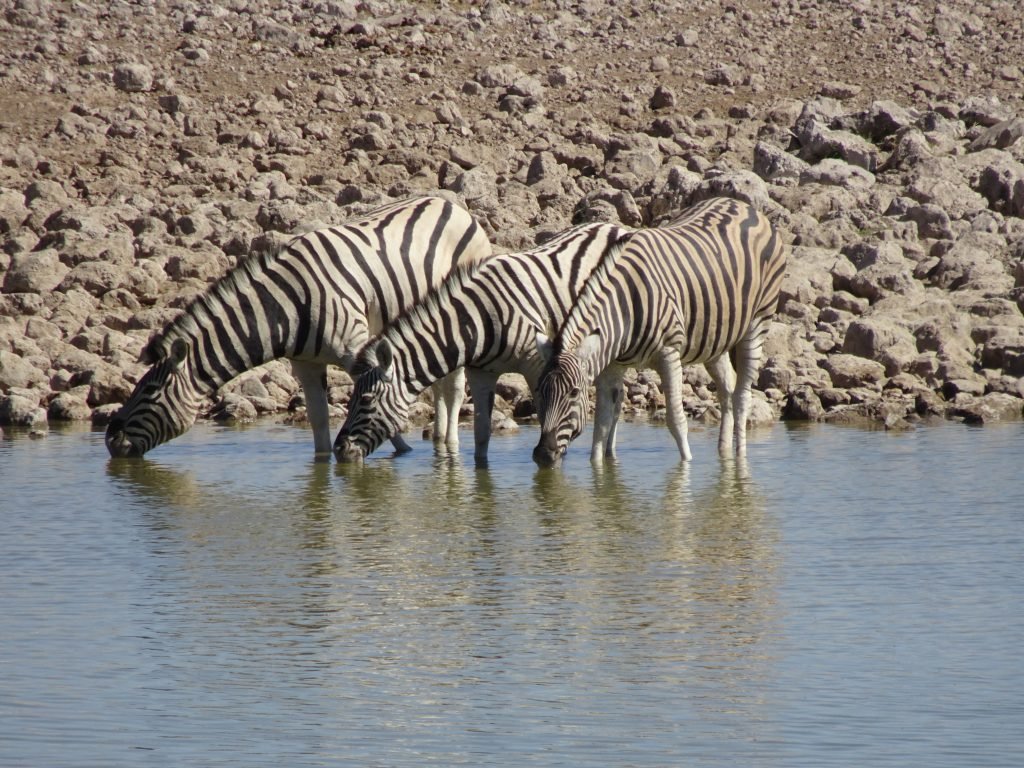
Zebras drinking water
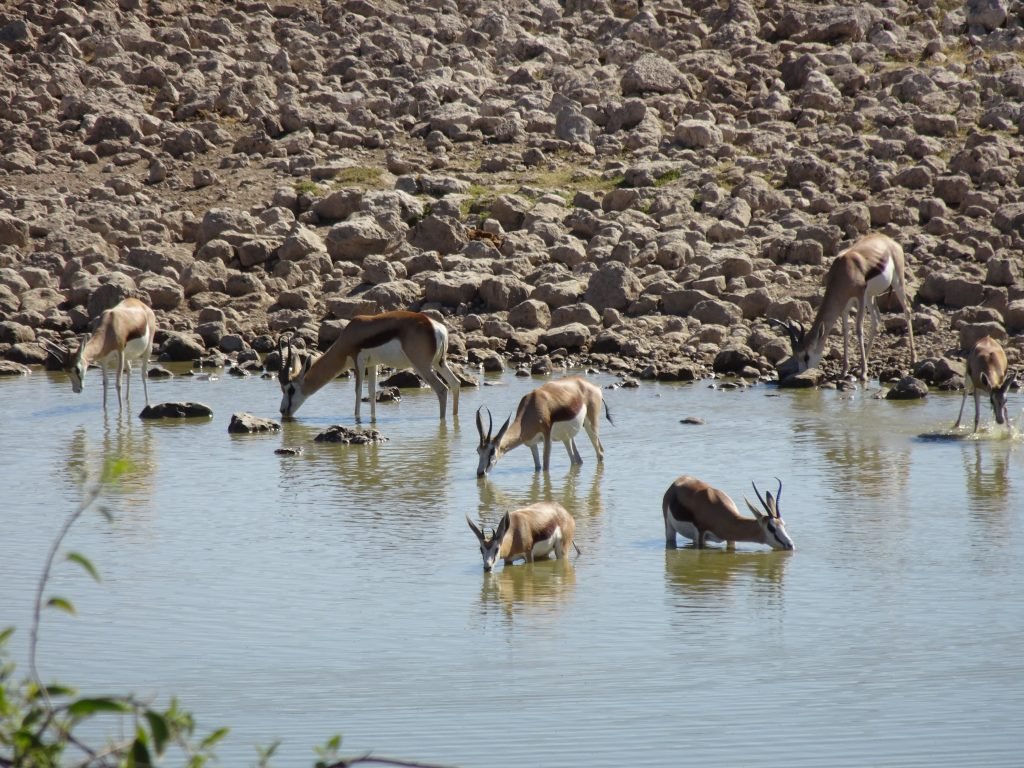
Springbok drinking water
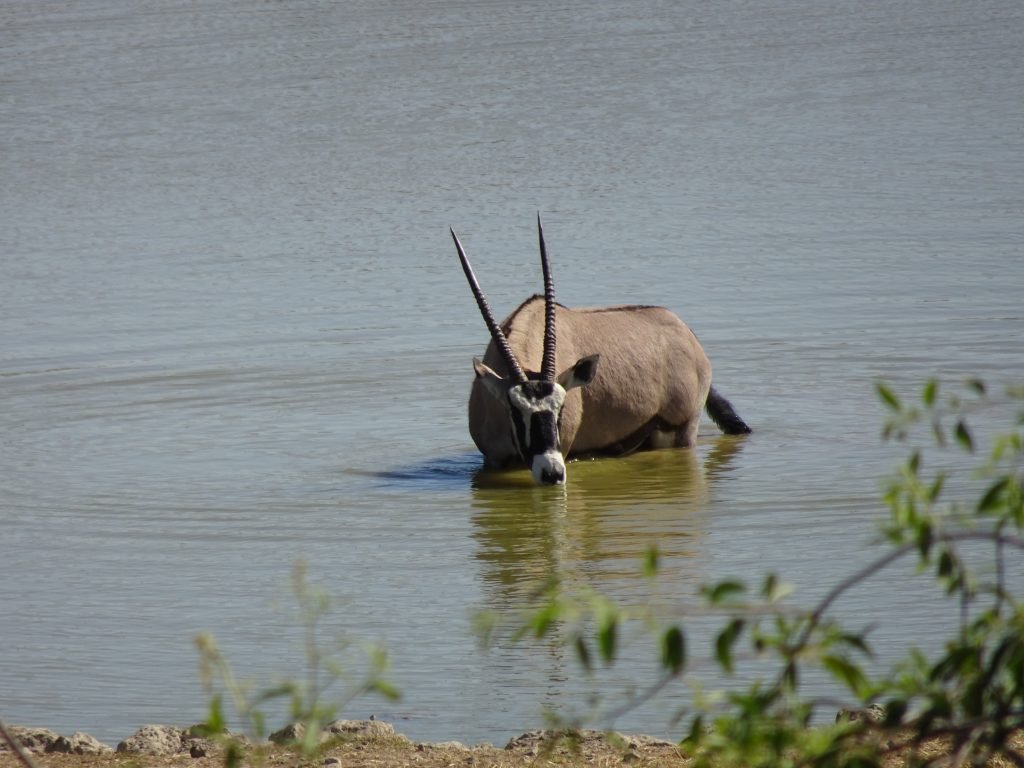
Oryx drinking water
Evening Safari
We did a short evening safari and didn’t see much. We just saw zebras and wildebeests.
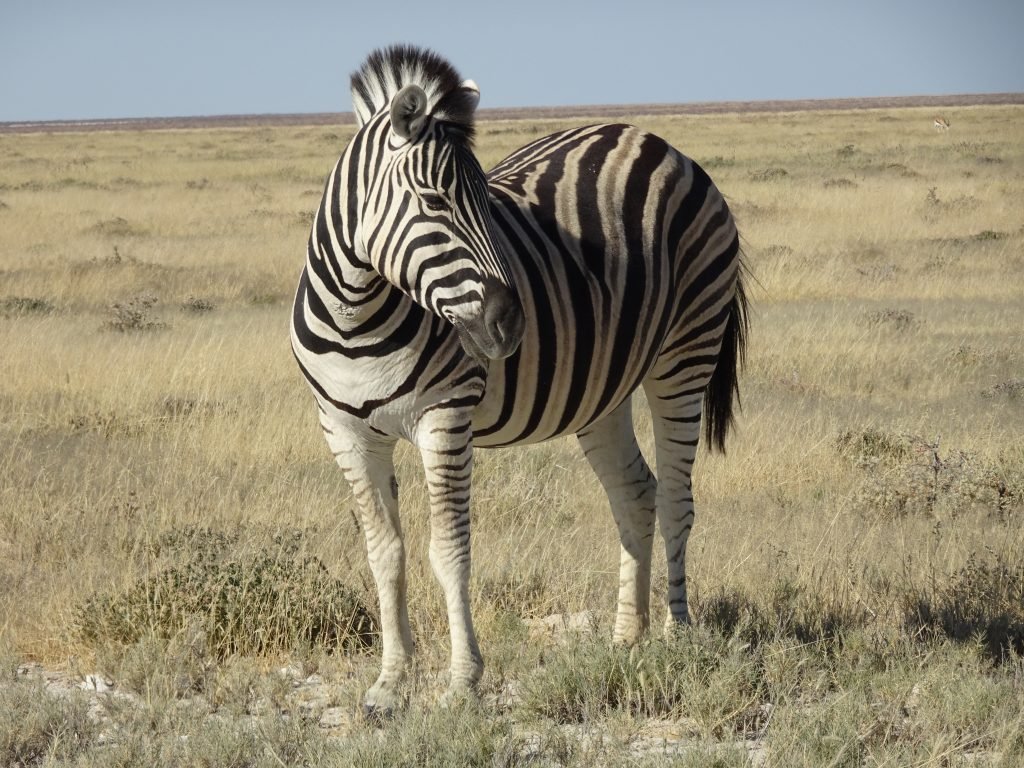
Can’t get enough of Zebras!

Wildebeests
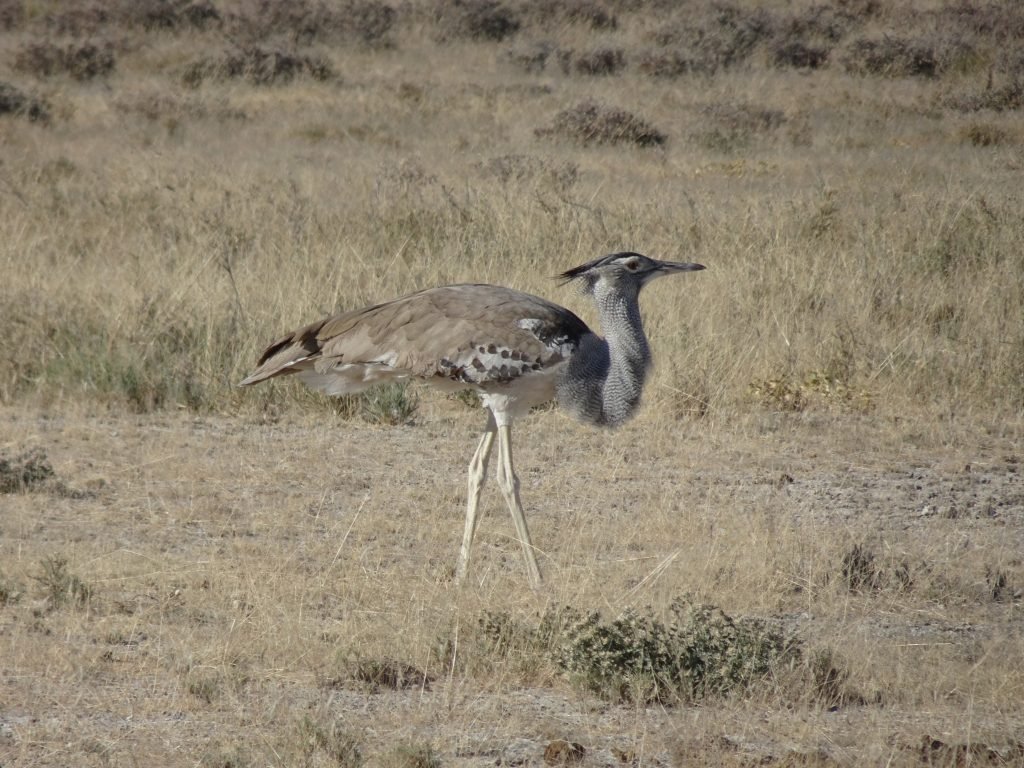
Spotted a bird
Accommodation
Nighttime viewing at the Okaukuejo Rest Camp is amazing. Again, we spent time watching animals from our room’s balcony. It was a quiet night compared to the previous one. We saw elephants and rhinos. Other animals didn’t show up. We waited for an hour and then went to sleep. Kapil thought he saw a glimpse of a lion in the middle of the night but wasn’t sure as it quickly disappeared.
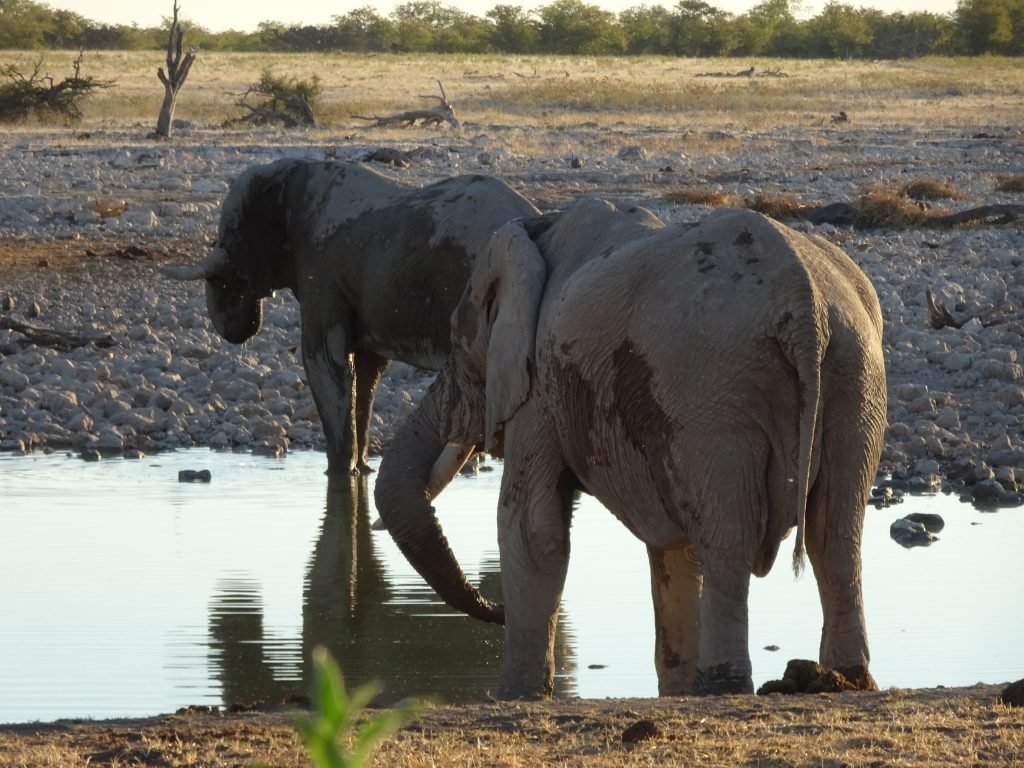
There are always elephants for company at Okaukuejo
Day 13 – Drive to Onguma (156 km, 3 hrs)
Check-Out at Okaukuejo
- Office time is sunrise to sunset.
- Check-out is simple – just give the key back. They will radio to check if the room is in good condition and return the N$ 500 key deposit. They return the same notes you paid when you checked-in.
- Before we checked out, we were super excited to spot a hyena at the waterhole. We hadn’t seen hyena anywhere during our two-night stay inside the park. It came quickly, drank water and vanished before even our eyes could blink.

Hyena drinking water
We sadly bid goodbye to Okaukuejo and left. It was an amazing 2 nights spent inside the Etosha National Park with endless animals. Today our plan was to drive across the Etosha National Park, checking our various waterholes and eventually exit the park on the eastern side and stay at Onguma which is just outside the Etosha National Park.
Waterholes On the Way to Halali
- Nebrowni
- Gemsbokvlakte
- Olifantsbad
- Homob
- Sueda
- Salvador
- Rietfontein
We kept checking various waterholes and saw the usual zebras, wildebeest, and springbok. We were excited to spot a jackal. Near to the Halali Resort, we spotted some elephants on the side of the road. While we were admiring them, they started to cross the road right in front of our car. It was terrifying seeing so many of them so close to our car. Soon, I realised they were even crossing the road behind our car. So it was like we are surrounded by elephants and sort of in their way. Seeing this, we had our heart in our mouth. Thankfully, none of them attacked our car and they crossed the road peacefully.
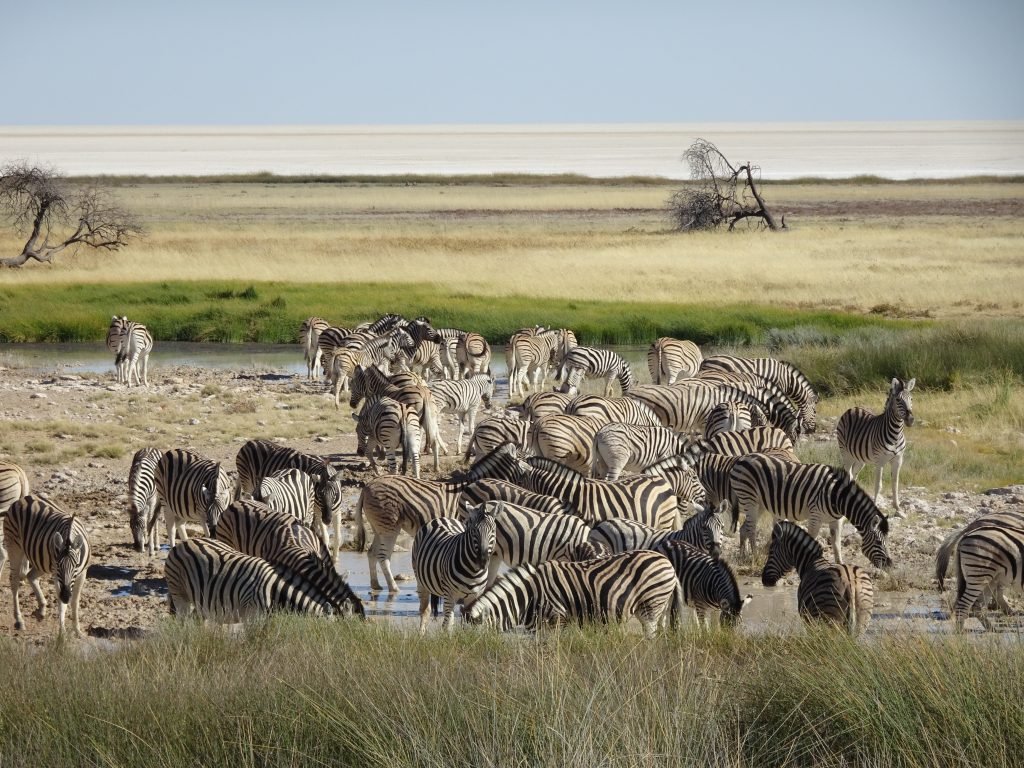
Still not bored of zebras 🙂

Wildebeest

Springbok crossing the road

Jackal

The landscape of the Etosha National Park
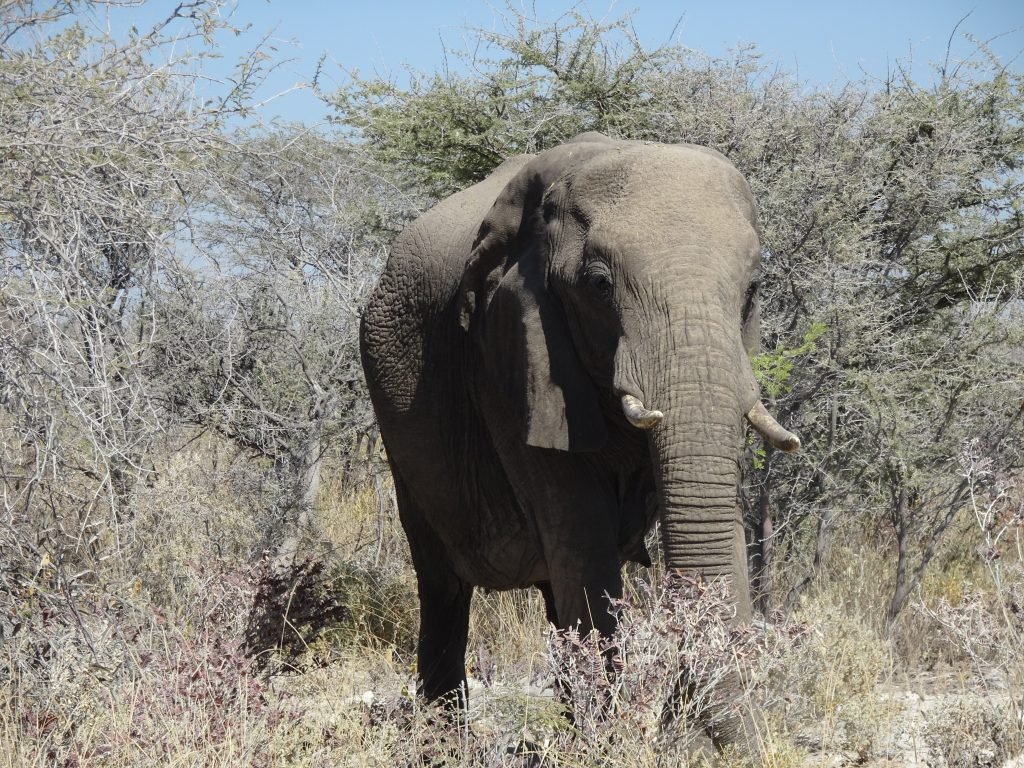
Elephant right by the road

Elephant crossing the road in front of our car!
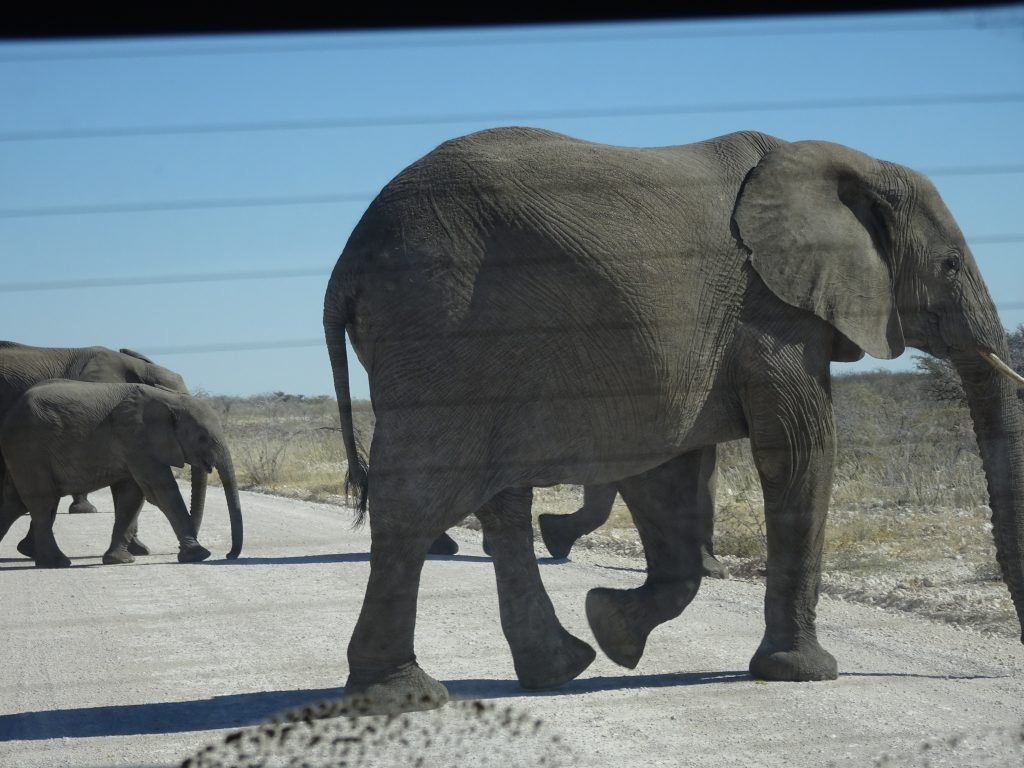
Elephants crossing the road behind our car!
Lunch at the Halali Resort – Halfway
We reached Halali Resort only to find the same herd of elephants at its waterhole, which we saw crossing the road. There were around 12 elephants drinking water. It was an amazing sight. We loved watching the baby elephant. We spent some time watching these majestic creatures then grabbed sandwiches for lunch and left.

A herd of 12 Elephants
Waterholes between Halali and the Von Lindequist Gate
- Okerfontein
- Kalkheuvel
- Chuddop
- Koinachas
- Klein Namutoni
After leaving the Halali Resort, we were thrilled to see a giraffe who was trying to swallow a bone. He tried ample times but of course, couldn’t swallow. Also, we saw a jackal eating meat. Then we saw kudus crossing the road and elephants having a mud bath. After that, we went to a waterhole where we saw a giraffe drinking water.
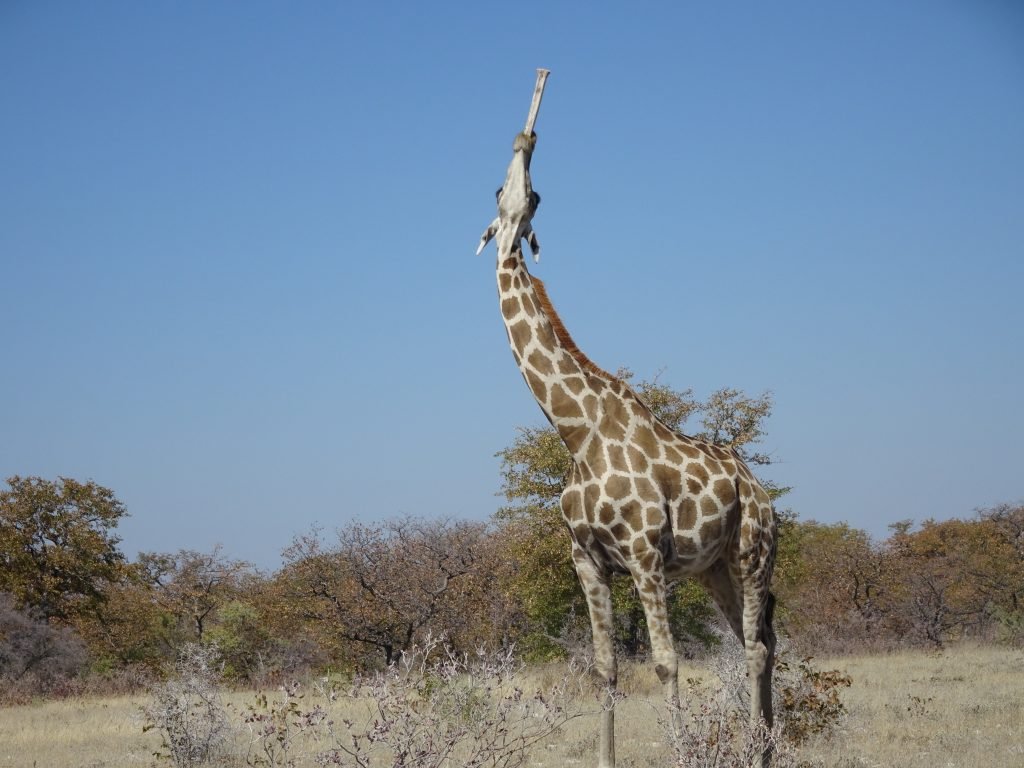
Giraffe trying to swallow a bone!

Jackal eating meat
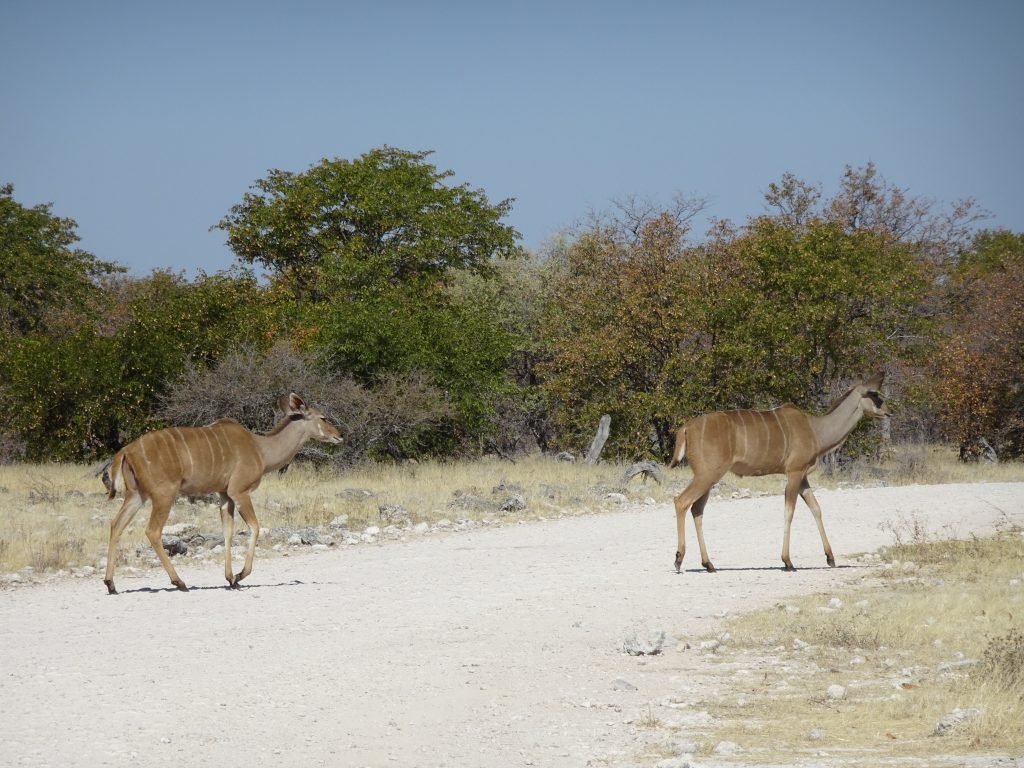
Kudus crossing the road

Elephant after a mud bath
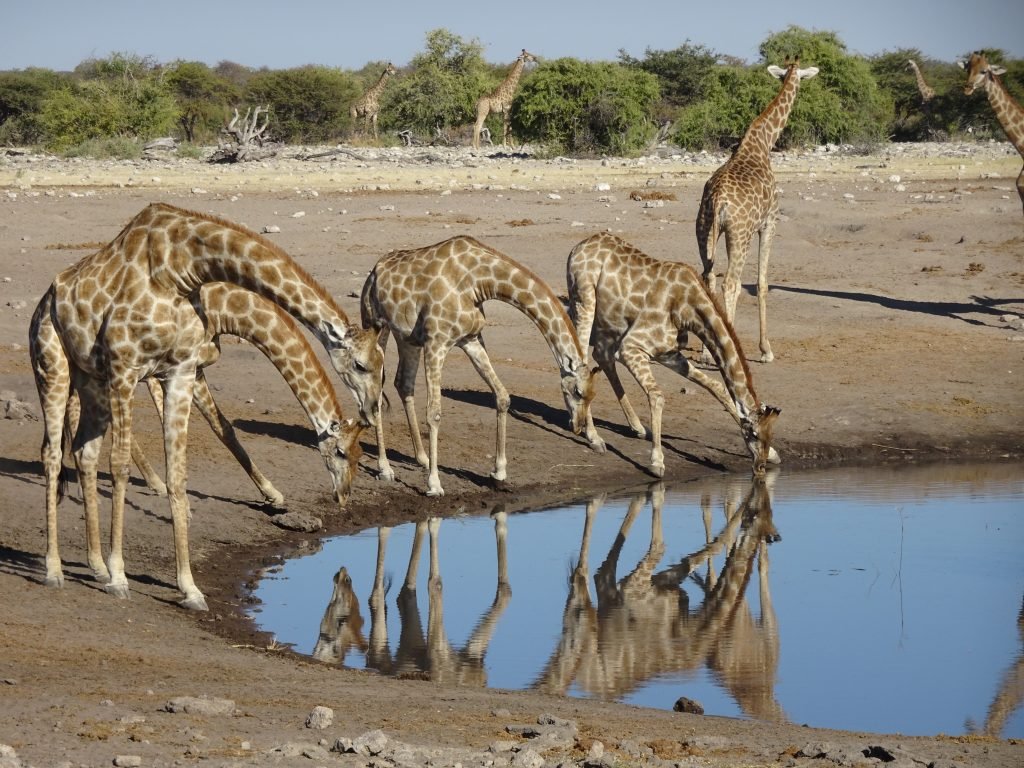
Giraffes drinking water

Loved watching giraffe
Namutoni Camp
We stopped here to check out its waterhole. It was very small when compared to Okaukuejo. Didn’t see any animals here.

Waterhole at Namutoni
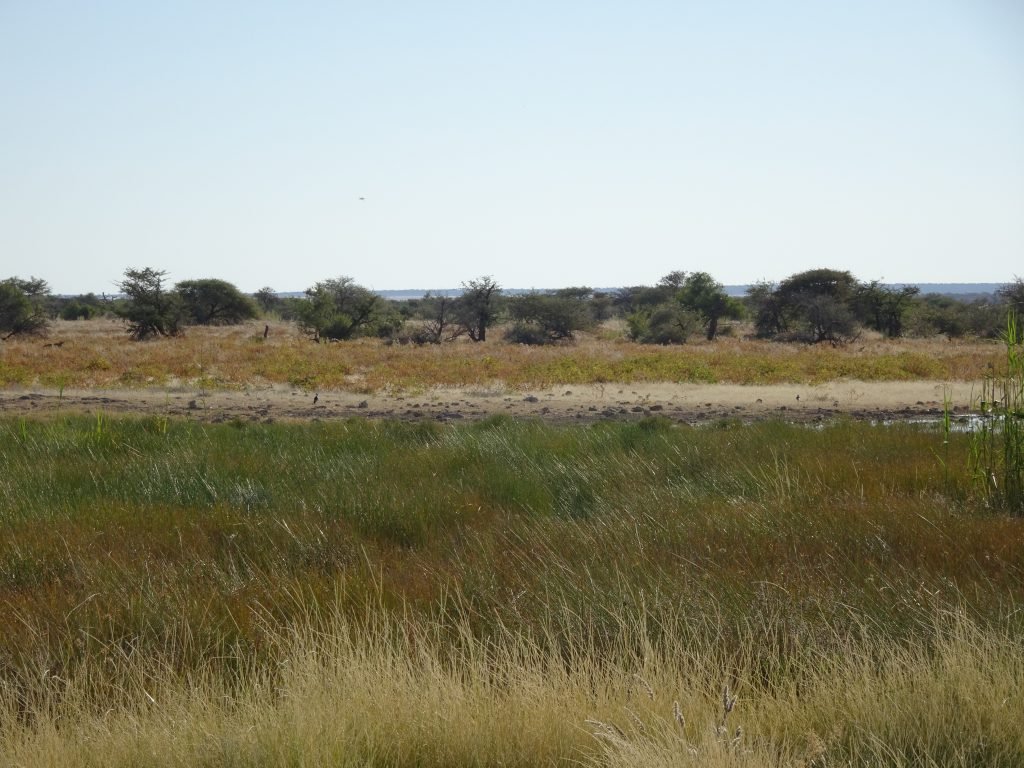
Beautiful Landscape at Namutoni
Good places to visit on the eastern side
- Klein Okevi
- Fischer’s Pan
- Twee Palms
- Tsumcor
- Andoni Plains
We didn’t have much time left to explore the eastern side. We just drove to Fischer’s Pan and Twee Palms, which is famous for spotting cheetahs and lions. However, we didn’t see any of them. But we spotted a banded mongoose which we hadn’t seen before.
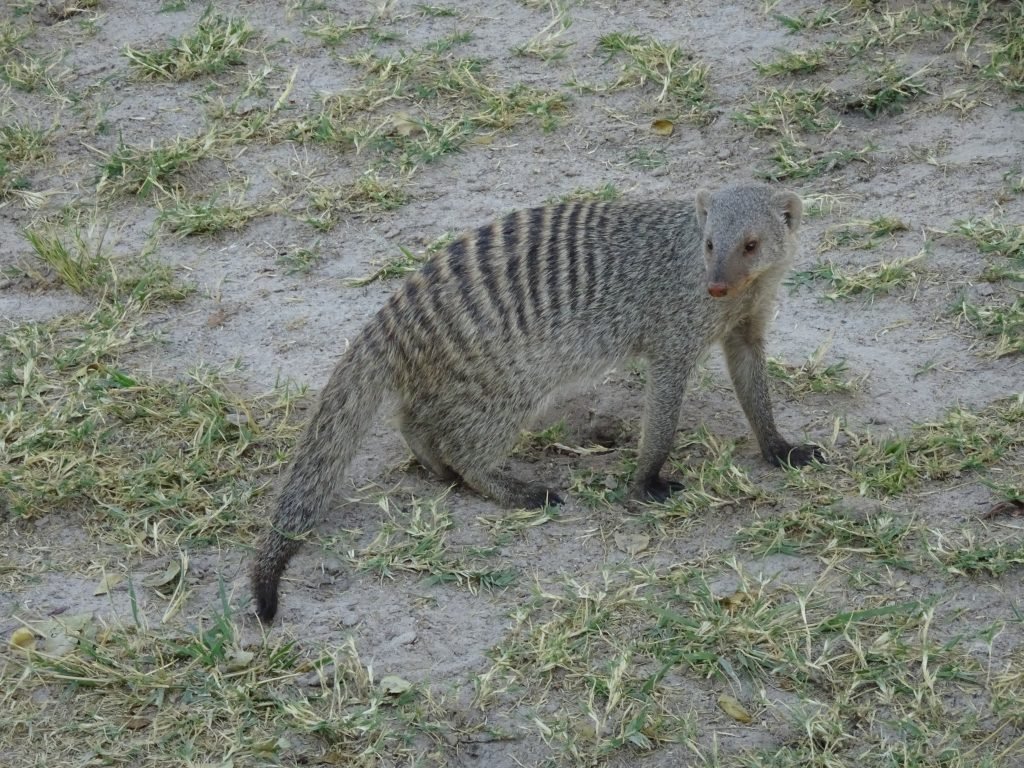
Banded Mongoose
It was time to bid farewell to the Etosha National Park. Having spent 2 nights/ 3 days in the Etosha National Park we saw a lot of different animals, spotted a lion within 2 minutes on entering the park and enjoyed every minute of it. I must say, the best experience was staying at the Okaukuejo Rest Camp and watching animals throughout the night.
Exit by Von Lindequist Gate
- Make sure to exit the gate before the closing time. Else you will be stuck inside, probably with no place to stay.
- When leaving the park, you will have to show your park fee receipt at the gate and then they will sign your car out.
- Make sure to pay the park fees (if anything extra) at the Namutoni Camp. Else they will send you back just to pay the fees.
- We had paid only for 2 days and as we spent the entire 3rd day in the park, we had to pay for an extra day. Since we reached almost at the gate closing time, she accepted the fees there. Otherwise, she had intentions to send us back like the first day.
Accommodation
We drove to the Onguma Bush Camp, located just a few kilometres outside the park. We entered the Onguma Reserve Gate and were driving to our lodge. Out of nowhere, we saw a lion walking on the road. Our eyes couldn’t believe it. But indeed it was a lion within a few meters from our car. So in essence, we spotted lions twice – while entering the park and after leaving the park. We didn’t see any lions while visiting waterholes and actually searching for them for 3 full days. We saw them when we least expected them. Such is wildlife and that’s why I love safaris. Every time it throws something different and unique at you.
Onguma has its own private reserve and we had planned to do a guided safari here. But we didn’t make it in time for it. Onguma Bush Camp overlooked a waterhole where we had a giraffe for company.
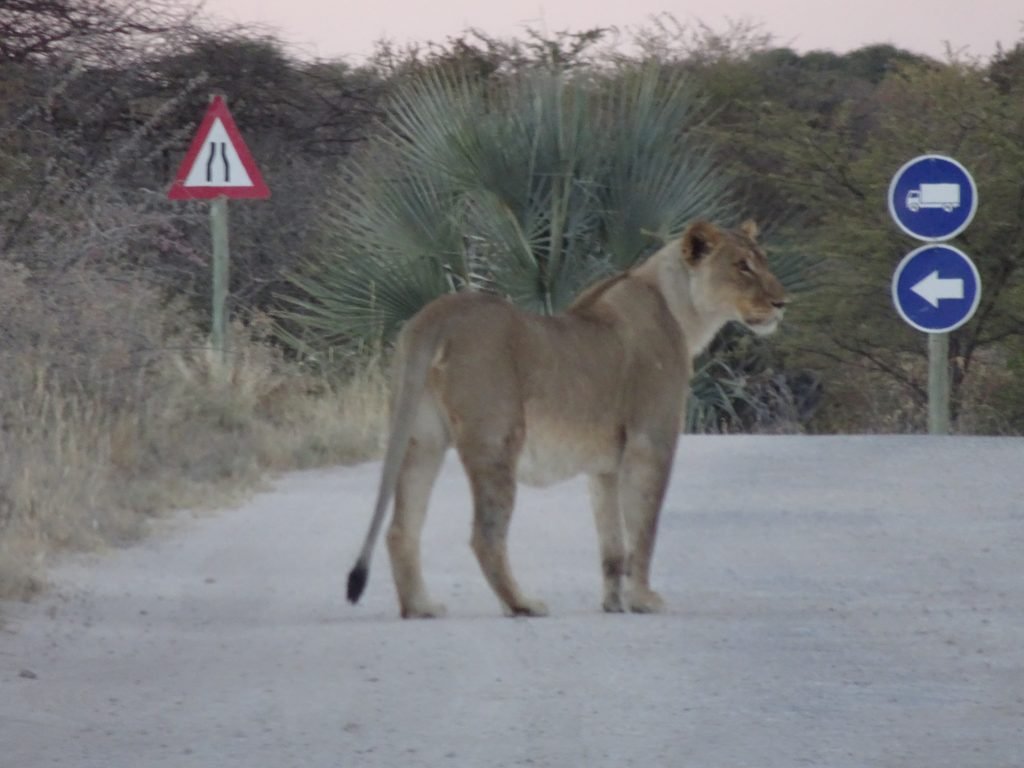
Lion on the way to Onguma
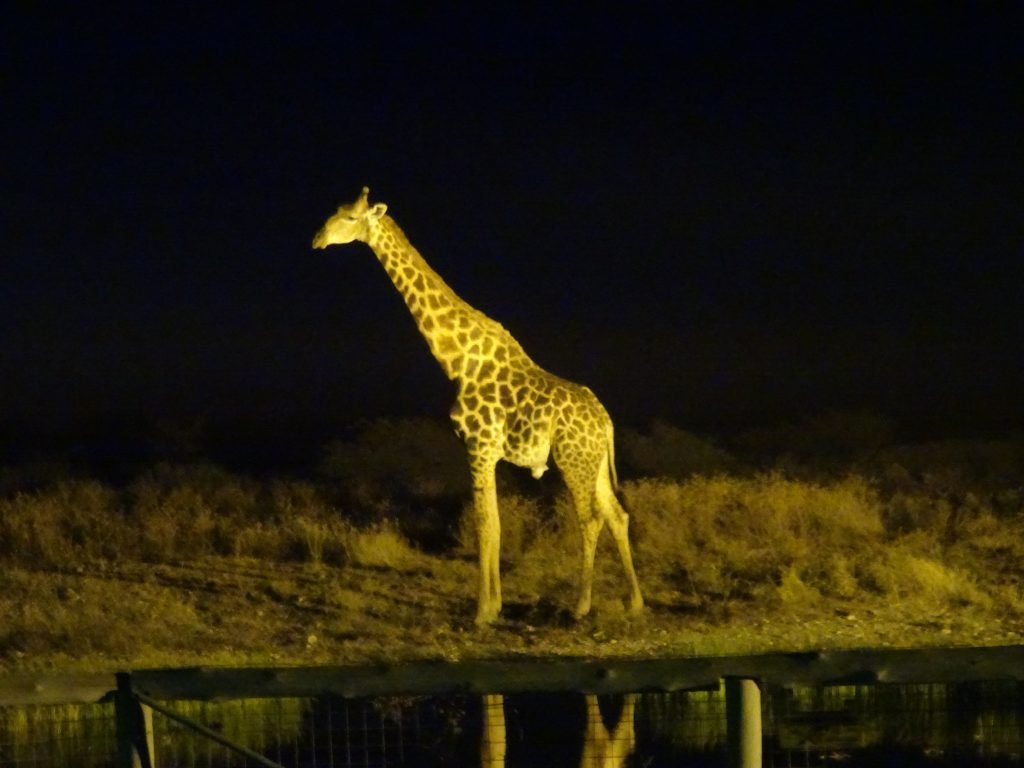
Giraffe at Onguma Bush Camp
Day 14 – Drive to Caprivi Strip (623 Km, 6.5 hrs)
Today we left early in the morning and drove all the way to Caprivi Strip to our lodge, Divava Okavango Lodge And Spa. I had read it’s a very long drive and should be done over 2 days with a night halt at Rundu. Once we left Onguma, roads were in perfect condition all the way. We only stopped at Rundu to refuel. We found it a very comfortable easy drive and reached the lodge by 1:30 – 2 pm. Therefore, I’ll suggest to this drive in one day itself.
Before going to Namibia, I had read Caprivi Strip is very beautiful and most tourists don’t go all the way there. This was reiterated by everyone we met throughout the 14 days we spent in Namibia. So I couldn’t leave it and had to check it out. Also, I had plans to continue onto Botswana, which is a few kilometres away and do a 5-night safari there. Unfortunately, getting a Botswana visa was a longish nightmarish procedure (that story for another time).

Excellent roads to the Caprivi Strip
Sunset Boat Tour
Our lodge offered a sunset tour and we decide to partake in it. We were the only ones on the tour. We saw beautiful panoramas all along the boat ride and stopped when we spotted hippos. They were lazing on the bank of the river. It was mesmerizing to see these massive creatures outside water. Then we saw a crocodile sleeping on the riverbank. After cruising for a while, just before sunset, our guide drove upstream to the Poppa Falls. He laid out a snack platter for us, which we nibbled while watching the sunset.

Sunset boat tour – Beautiful Vistas from the boat

Hippo

Spotted a crocodile

Poppa Falls

Snack Platter
Accommodation
We stayed at Divava Okavango Lodge and Spa. It is a splendid lodge overlooking the Okavango River. After being on the road for 7 days in Kruger and 14 days in Namibia, this was a perfect place to relax. I chose this lodge at a mid-way spot to Botswana, nevertheless, it was good to spend 2 days chilling at the lodge with gorgeous views all around.
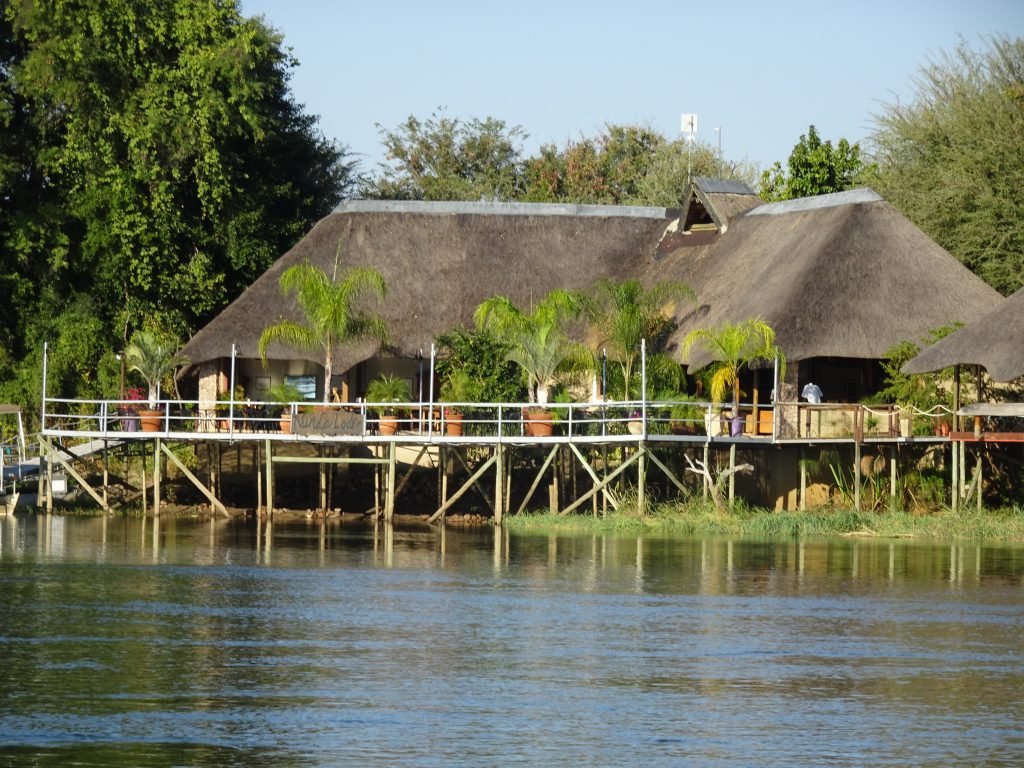
Our Lodge
Day 15 – Caprivi Strip
In the morning, we visited yet another game park as it was only 10 km from the lodge and then spent the rest of the day chilling at the lodge.
Mahango Game Reserve
It is a small yet beautiful park. It is famous for spotting roan, red lechwe and sable sightings. After spotting unmissable zebras, kudus, giraffes and elephants, we were excited to see sables in the wild. This was the only place where we saw sables and also saw them mating. We also saw some different antelopes than the Etosha National Park. After spending some time driving around, we saw the giant Baobab Tree.
It is difficult to self-drive in this park as there aren’t any proper maps or signposts. Also, they don’t have any facilities, so it is best to bring your own food and drinking water. At times, we were lost and didn’t know which roads were safe to drive on. There are some roads which are tough and required a 4wd. So we just spoke to the vehicle passing by and followed them for the most part.
There were only 5 to 6 cars when we were there. This park is worth only for a few hours. I’ll say if you are in the area, it is worth spending one morning there and trying to spot some unique antelopes. But I wouldn’t recommend going all the way just to visit Mahango Game Reserve.
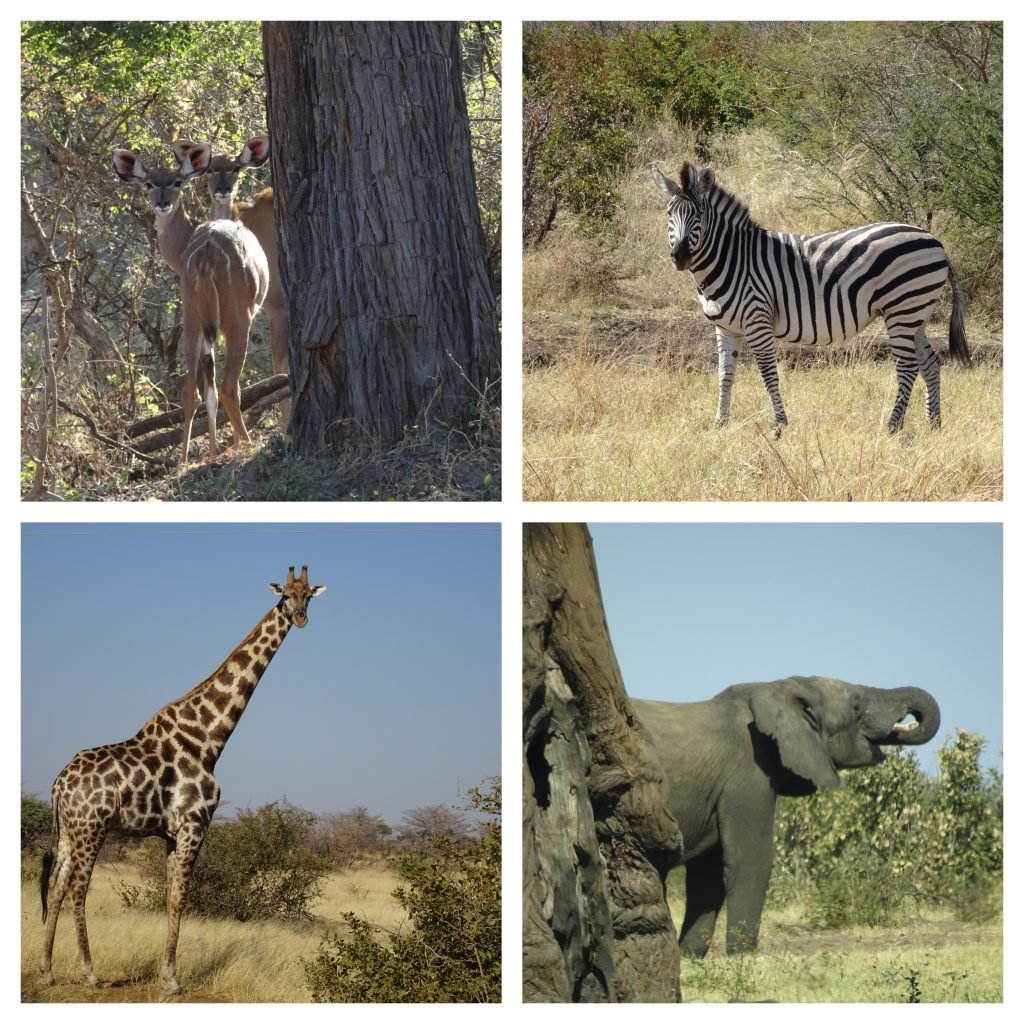
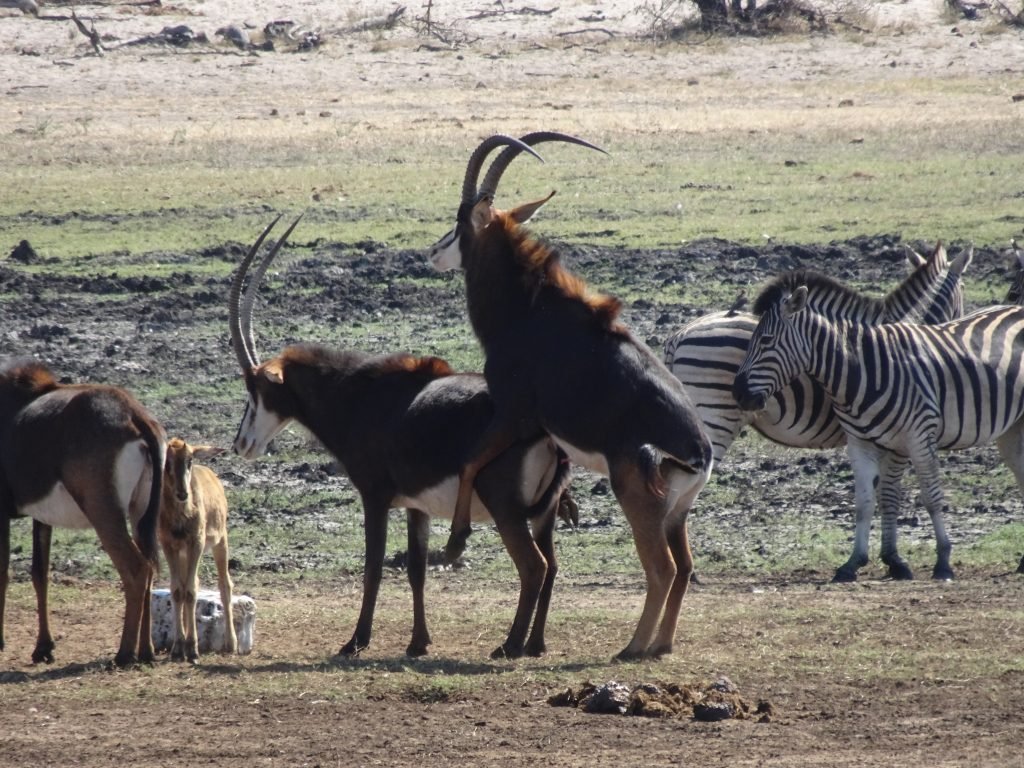
Sables Mating – Just a day in the jungle!

Tsessebe
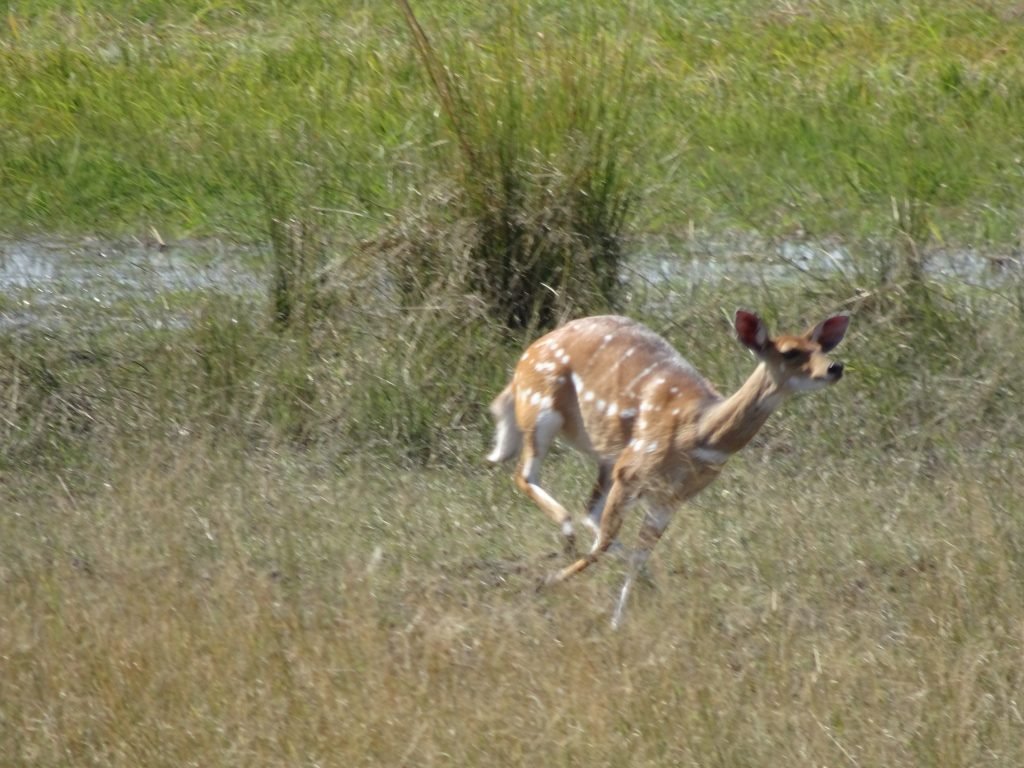
Bushbuck
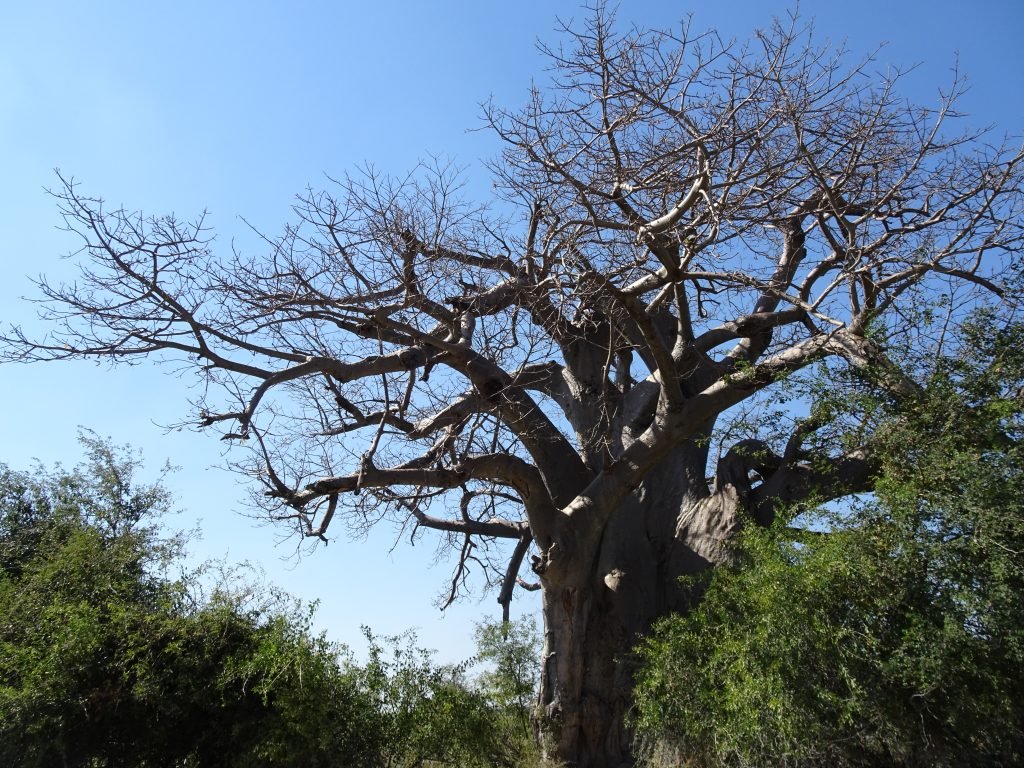
Baobab Tree

Warthog
Accommodation
We enjoyed spending time at the Divava Okavango Lodge and Spa. Caprivi Strip is beautiful as reiterate by everyone, but we didn’t feel anything unique about it. We felt that Namibians don’t see greens on a regular basis and that’s why are crazy behind Caprivi Strip. I’ll say it was worthy of our time as we liked the lodge. It is a perfect stop if going to Botswana, else if short on time it is skip-able.
Day 16 – Drive to Katima Mulilo Airport (300 Km, 3.5 hrs) and fly to Johannesburg
We left early around 7 am and drove to the airport. Even at this hour, our lodge provided a packed breakfast and helped us with the luggage. Since it’s very near to the Botswana border, there was a police check. They checked for a driving license and passports. Roads were in perfect condition and it was an uneventful drive. We reached the airport at 10:30 am only to find it to be closed. It opened around 11 am and we did the check-in formalities.
Around 11:15 am, a person from Bidvest met us and we handed the keys over to him. He said he had already checked the car and left. Luckily, we have had good luck with the car rental companies, which eventually ran out in Seychelles. We reached Windhoek domestic airport by 2 pm.
Changing Airports in Windhoek
We had to change airports from domestic to international to catch our international flight to Johannesburg. I didn’t pre-book a transfer as it was too expensive. I thought if I didn’t find any taxis, I’ll rent a car just for airport transfers. On arrival, all car rental companies’ desks were unmanned. A board stated to call if wanting to rent a car. So that plan didn’t work out. The airport staff advised that taxis are unsafe and it’s better to call the same expensive company (which I didn’t prebook with).
One of the other groups had a pre-booked bus for just 4 people and we tried to convince their driver to take us too. But the group was very adamant that it’s theirs and didn’t allow us. Eventually, we called the company, got a small sedan car, paid the same hefty price (they charge per person irrespective of the car) and finally made it to the international airport. Despite all the hassle, we had enough time for our flight at 5:30 pm and even visited the lounge. We landed in Johannesburg, South Africa at 7:15 pm, ordered mouth-watering Indian food and crashed.
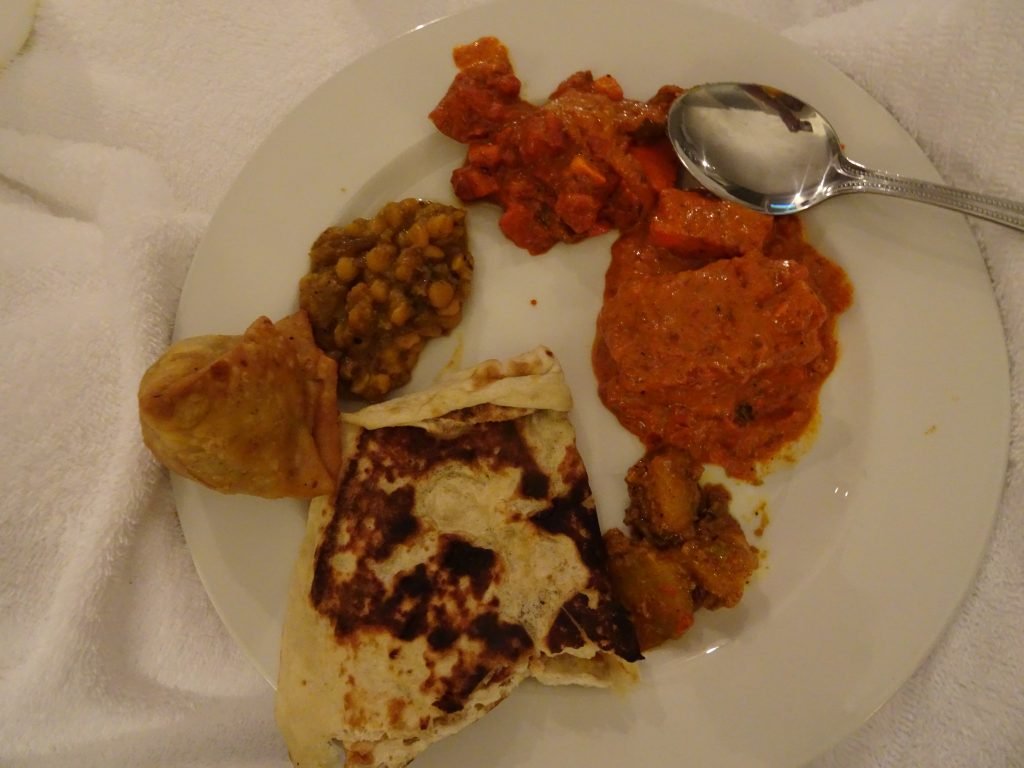
Indian Food in Johannesburg
That’s it. I know it’s been a long 2 Weeks in Namibia: Detailed Itinerary & Trip Report but I have tried to include every detail possible. Namibia was never on my radar and I still can’t believe that I hadn’t heard about this gorgeous country. In our 16 days there, we saw so many different things and had so many unique experiences. I would recommend planning a trip soon before it gets overrun by tourists.
Support this by booking hotels through our affiliate link at no extra cost to you!
Planning a trip to Namibia?
Check out all the other posts in this series:
Namibia Trip Planning: Itinerary and Tip
Accommodation and Vegetarian Food in Namibia
Disclaimer: This is not a sponsored or a free trip – We have paid for all our Holiday expenses but I spend a lot of time researching for the best deals and at times get a discount as I run a travel business as well. However, this post contains some (not all) affiliate links. Any purchase made through the links will help support this blog at no additional cost to you. Thanks for your support!
















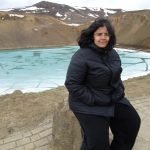


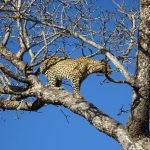
Leave a Comment